#but i treat them as very 'real' (which this can be another tangent in itself) and intuitive is the best way to describe how i process them
Text
reblogs off bc i dont want to start Conversations based on other peoples posts but re the whole "who is in control you or the character" question, i find it SO interesting because it's by letting myself discovery write that I (for me personally disclaimer) found the perfect balance between intuition and intention. which to preface "intution" is the easiest way to describe how the inside of my writers brain feels bc often i just get vivid characters/stories/images/scenes with little control at first and i have to figure out what they mean. anyway discovery writing is what works for my brain to make intentional decisions because i need to be amidst a draft to get the Story Cogs working, whenever i try to outline before a draft it's always been just throwing things at a wall bc it feels too far away, but because im also using the discovery element to do that it's like. that's where i think the whole i feel like my characters reveal themselves to me comes from. because im always discovering small bits about them even if i've written them for years just but because discovery writing is also what prompts me to be intentional about writing as i write something it's like both are happening at the same time. so the whole "who's in control" it's like...i don't think control is the right word for me at all because its not Me or the Character it's me trying to understand the character to understand + then write my intentions. like neither me or the character are in the drivers seat because there's no car we are in the middle of the story forest and at first i won't know what it means at all except that it is a Story. and my character will start going one way and sometimes i'll follow and pay attention to where they're taking me to figure out if this is the right path/where to go next. and sometimes i'll figure out how to read the compass first and realise i need to drag their ass in another direction
#anyway i just thought this was interesting because i used to think i needed to outline to be intentional/in control of my story#but outlines are too distant for me to feel like im in control so thats why theyre more organisational than creative for me#whilst we're infodumping on process i also dont like the whole are characters Like Real People or just Story Tools#like yes my characters are tools for the story just like how the story is a tool for demonstrating my characters#like again i dont think its one or the other for me#but i treat them as very 'real' (which this can be another tangent in itself) and intuitive is the best way to describe how i process them#but that doesnt mean there isnt intention and control you know#like the reason i describe my characters and stories as 'real' to me is simply bc they are very vivid in my brain#and that vividness often expands the bounds of the story#i want to go on the 'real' tangent the weight of that word one day#i think this makes sense if u know that for me i rarely get 'ideas' i get images#and characters/relationships#and i have to figure out what that means as a story#also no i dont think you need 'intuition' bc thats just the word i use for myself but i do think you need to understand#how intention works w your writing process and what it means for you to be intentional and what helps you be intentional#and sometimes that will be not considering any form of 'intuition' at all#beloved writeblrs i think i need to launch the dallonwrites substack i cant be doing these tag essays anymore!! i need to expand!!! someone#give me a podcast
10 notes
·
View notes
Text
This is the third time this week.
The Archmage of Civil Influence sits slumped over her pristine, deep red desk with her head in her hands. She can handle Ludinus. The man gives her a long enough leash, so long as she gets the right things done with it. She can even handle Professor Widogast, absurd as his new name might be, tiring as his constant pushing of the line between acceptable lesson plans and light treason might be. No, it’s not him. It’s his friend.
“Hi, Astrid!”
She presses her fingertips into her temples. Twenty-five words feels like more than one might think. Twenty-five and then twenty-five more and twenty-five more and on towards infinity feels like an eternity. Occasionally, for a while after Ikithon’s trial, she had received a friendly hello from Ms. Lavorre. That had been irritating enough. But from what she understands, the tiefling and two others are now at sea dealing with their own issues.
Veth Brenatto, on the other hand, seems to have absolutely nothing else for which to use her spells.
“How ya doing? Just checking in about that little get-together we talked about.”
Talked about is a generously mutual way to put it. There is an event planned for the end of the week at the dance hall she and Bren used to frequent. Brenatto is of the persistent opinion that she ought to attend with Professor Widogast. As his date.
Ridiculous, as she had snapped to Eadwulf last night, because if anything he would be her date - but that is beside the point.
“I know Caleb is waiting to hear a ‘yes,’” the voice in her head continues in its usual overly chipper tone.
Astrid does not believe for a second that “Caleb” is doing anything of the sort. They pass one another in the halls of the Soltryce occasionally, and their interactions are always a coin-flip between professional and very awkward. The only other time they see one another at all is when he’s dragged into her office for going on one of his famous little tangents in class, and he hardly seems interested in her authority, let alone her companionship.
“Good afternoon, Frau Brenatto,” she says smoothly, thankful that the woman can’t see her face. “As I have previously informed you, I would be happy to discuss this with Bren himself. Do have a pleasant day.”
She hopes it sounds sufficiently final, but allows herself a sigh as the halfling’s voice filters back into her mind a moment later.
“Caleb is very shy,” she says. “I think you intimidate him - which is silly, because he’s extremely powerful - but if you could just give me your answer--”
Astrid cups her face in her hands, fingers splayed. Only three more days until the dance has come and gone, and then she won’t have to deal with this anymore. Until the next time, of course. Or until Brenatto comes up with some other pretense to push them at each other.
“As I have said,” she says pointedly, “I would like to be sure that this invitation is coming from Bren. If he wishes to speak-” and he will not- “then we may.”
The next message is almost immediate this time, and Astrid resists the urge to bang her forehead onto the desk.
“Why don’t we go visit him together?” Brenatto asks with renewed enthusiasm. “Have some lunch, talk a little… I can leave you alone, if you two lovebirds are getting--”
Never before has she been so grateful for the limits of a Sending spell. She clears her throat, eyes falling on the stack of paperwork waiting in front of her. There is actual work to be done. Actual important work that does not involve a halfling jabbering in her head all afternoon. And, well, if confronting Bren directly about this nuisance could put an end to it?
“Very well,” she says on a sigh. “When shall we meet?”
Astrid wants to groan out loud at the ecstatic tone of the next message. They plan to meet tomorrow evening. Brenatto is already in town, for some reason Astrid doesn’t bother remembering, and they’ll arrive together at Bren’s little residence on the outskirts of the capital at sunset. Ostensibly, Veth will treat them all to a meal at Bren’s favorite establishment - but Astrid suspects things won’t get that far.
At least she can finish her paperwork, now.
She buries her face in Eadwulf’s shoulder that night and groans, “Why does she never do this with you?”
The following evening, she finds Veth Brenatto on the road outside Bren’s place, waving on her tiptoes with a wide grin splitting her face. Astrid gives her a tight, mirthless smile in return. Better to get this over with.
“I’m so happy that the two of you are getting some proper time to get to know each other again,” Brenatto says as they approach the door together.
Astrid will ignore the suggestive tilt of her eyebrows.
Bren’s place is smaller than those of most of the Academy’s faculty. He is one of the only professors who has chosen to live outside of the city center, opting instead for a little-travelled section of Rexxentrum to the northeast. The house itself is small and nondescript; she would never have picked it out, if she didn’t already know it was here. Astrid wonders sometimes about the secrecy, but she will let him have his privacy. She owes him that much, at least.
She shakes herself from her thoughts just in time to notice Brenatto reaching for the doorknob, but not soon enough to stop her from opening without a single knock. By the time she’s reached out to stop her, the door is already wide open.
And oh, this is rich.
“Caleb! I brought--” And then Veth sees them, too.
The man in question - Caleb or Bren or the physical manifestation of regret, whichever he pleases just now - has just fallen off the couch. Brought tumbling down with him is the drow with whom he’s intimately tangled up, face twisted into such a comical mix of shock and mortification that Astrid actually cracks a smile.
“Ah,” Bren says, pulling a blanket from the sofa to wrap around his partner’s shoulders, “Hallo, ja, come right in.”
The drow, for his part, has already waved a hand and magicked them both some clothing. Brenatto, for hers, has begun sputtering incoherently - which, after the week of endless pestering Astrid has had, sounds about like music. Astrid gives her a smug look, and gestures with one hand towards the two men hastily righting themselves.
“I believe this settles the matter,” she says coolly. “Thank you for the invitation.”
She gives Bren a knowing look, and he gives her a tired nod back. She doesn’t envy him the interrogation he’s about to endure. With a parting glance at the drow, who has retreated toward another room with his real clothing clutched just a bit too tightly in his hands, she turns on her heel and steps back out into the dusk.
That explains the secrecy, then. She hopes he’s good for Bren, whoever he is. He deserves something good.
Just as the teleport whisks her away, she hears Veth Brenatto screech, “Him?!”
#this has been kicking around in my head ever since the week of the finale#very silly but hey#shadowgast#astrid beck#veth brenatto#caleb widogast#essek thelyss#mine#mine:fic#also i feel like i should say: yes i am aware astrid and essek were in the blooming grove together for a While#but astrid was pretty preoccupied so i'm playing with this anyway#astrid#veth#caleb#essek
702 notes
·
View notes
Note
do any of the mercs play board games?
Mercopoly (Board Game
Headcanons)
Scout:
You think he has enough of an attention span to play something that doesn’t involve sweating out his energy drinks?
Hell no!
He gets very bored very quickly, especially with something complex like chess.
He’ll play cards sometimes, but only Crazy Eights and Go Fish - that’s all he knows how to play.
However, there is one true board game he plays occasionally: Candy Land.
It’s one of the few board games that you don’t really have to read the rules for, and there isn’t any writing on the cards.
However, he only asks to play it when he’s not feeling very well.
Medic even has a page in his medical journal for the mercs that says, and I quote:
“The Scout has an extremely short attention span, and if an activity isn’t active or immersive, he will not stay long. If at any point he chooses a sedentary activity, a check-up is in order.”
As sad as it is, a request to play Candyland is a good way to know if Scout needs a little extra reassurance or support.
By the end of the game, Scout usually feels more himself, whether he wins or not.
Engie is especially good with Scout when he’s this way, being the one of the most emotionally sensitive of the group. But he also knows Scout would never admit straight-away how he was feeling, so he usually has a more fun way of getting answers.
“You feelin’ more like a King Candy or a Lord Licorice?”
“...Fudge Monster.”
“That bad, huh?”
“Yeah...”
Spy:
If you ask him, he will most likely go off on a tangent about chess, and how it’s a game of strategy, deception, and crushing your enemy with your wit.
He scoffs at any other game, and constantly makes fun of several of his more intelligent peers for finding interest in them.
“You are mercenaries. Blood-thirsty killers of men. And you are playing ‘Hungry, Hungry Hippos’ like a hoarde of kindergartners?”
But one thing he cannot resist is Sorry.
He considers it above normal board games because it has strategy - or at least that what he says.
He actually just likes it because it’s a game of revenge, which is like a drug to him.
He’s gotten so good at it that if he asks you to play Sorry with him, it’s almost guaranteed that he’s mad at you and just wants to let off some steam by giving you a horrendous loss. However, occasionally, he’s the one who loses.
Spy isn’t a poor sport, exactly - he’s too cultured for that - but sometimes his pride outweighs his manners and he convinces himself that the other player cheated through made up signs of deception.
He simply “allows” them to win because he “doesn’t want to make a fuss.”
But god help the unfortunate soul who decides to rub their win in his face.
Sniper had won five games in a row, and it was clear Spy was getting hot under the collar.
Sniper ended their games with a mischievous, “You’ll get ‘em next time, tiger.” and a small pat on his shoulder.
Spy immediately saw red, grabbed Sniper’s hand, and before the aussie knew it, he was against a concrete wall with a butterfly knife to his throat.
“I could kill you right now. Your final cry for Medic will be drowned in blood, and I would leave you here to die a painful, dramatic death. You’ll be replaced with a rusted trash can of a bot until they could grow another clone of you. Every memory will be gone. The team will be shrouded in grief, not because of losing you, but losing what the clone can never have. And I shall bide my time, ask the clone to play the same game, and kill them when they win. Another clone, another kill. And again. And again. And again. You think the Manns give a damn as long as their work is getting done? You will never be able to form a single thought before I spill your blood - caught in an eternal prisoner’s dilemma where you always lose.”
After gathering his bearings, Sniper finally spoke.
“Is this about your takeout?”
Spy scoffed.
“Do you really think - !”
“Tonight, my treat if you don’t kill me.”
Spy squinted.
“Egg rolls?”
“And an extra order of crab rangoon.”
“Your treat?”
“Yep.”
“How do I know you won’t poison me?”
“Chemical test before and after the food arrives.”
“How do I know Medic isn’t in on it?”
“Miss Pauling as a witness and Scout as an overseer. Pauling’s main objective is to keep us alive, and Scout can’t do bloody anything subtle, even if he wanted to. You can also play back the cameras in the lab, if the mood really struck ya.”
Spy held Sniper against the wall for a minute or two while he thought it all over, then let Sniper fall to the ground.
“I don’t need your sympathy, bushman. But you had better keep your end of the deal. I am the only backstabber around here.”
Demo:
Can’t even stay awake long enough to play most board games.
On the rare chance that he’s sober, he, Engie, and Medic like to play Monopoly.
Here’s the thing: you should never ask a drunkard, an engineer, and a sadist genius to play Monopoly together. It will not end well.
They have been playing the same game for years, with new rules in place and physical extensions to the board in order to try and end the game. Every other Friday, they take the weekend to try and finish it.
However, it all ends up fruitless.
Demo is usually the one keeping the peace, since he is the least competitive out of the three. That isn’t to say he isn’t clawing for the win as much as the other two, but he is definitely the least invested. He’s mostly staying out of principle.
“If there’s one thing I’ve learned, ‘s ta ne’er give up, e’en when the goin’s gettin’ tough. Roll the dice, doc.”
Despite his confidence, he’s not even sure what he would do if he or anyone else won. It would seem more like a relief than a celebration.
Medic:
He’s the one who started the Eternal Monopoly game, which has led to some theories that the game itself came straight from hell, and is one of the many punishments used on sinners. The box does smell a bit of brimstone…
He seems to enjoy the chaos that each round brings and the challenge of coming up with new rules to the game. To any outsider, his commentary and directions are complete nonsense.
“According to zhe ‘Calvinball Rule,’ as stated by Engineer, and the ‘Double Kill,’ as stated by myself, since the current time ends vis a three and ve all received at least two kills zhis veek, ve need to double every other roll and whomever loses zhe resulting game of ‘Bim Bum’ vill have to go to zhe Purple Jail.”
The rules and mechanics are like an unholy amalgamation of Monpoly, Sorry, chess, D&D, Bluff, and poker.
However, when Medic isn’t stapling pages of rules together, he likes to play a nice, relaxing game of checkers with Heavy.
Both of them are excellent checker players, but neither of them care who wins.
In fact, they usually talk over the game, taking the other player’s pieces as one of them shares a story from that day’s battle.
They’ve even played while Heavy was in surgery - leading to many unfortunate times when Medic had to fish a piece out of Heavy’s intestines.
One would think that a genius doctor would also have a passion for chess, but he expresses his disdain for it almost every time the checker board is brought out.
“Ach, people think chess is such an intelligent sport. Let me tell you, liebling, it is terribly overrated. If zhe devil can play chess, anyvun can. He might as vell just give souls avay, vis those shaky claws of his.”
Engineer:
Being the engineer, he is usually the one to add to the Eternal Monopoly.
Pieces, board extensions, cards, trivia - it gives him a nice break from all the weaponry.
He’s usually the one who remembers all the mechanics and rules, and serves as the judge if rules contradict each other.
“Alright, now let’s see here…we’ve got the Infinity Loop over here, but now you’ve got the Time Travel card…how many years? Infinite? Ho boy…looks like I’m gonna have to add a Hilbert’s Hotel square somewhere. Hold on…”
Despite his affinity for Eternal Monopoly, Engineer will play almost any board game. He learns new rules and figures quickly, and enjoys the challenges that brings.
However, if he’s particularly burnt out, he likes to take a break by playing Jenga. He and Spy have a friendly rivalry, since Engie can tell which blocks are supporting and Spy has quick fingers.
Spy, oddly, is a lot more amiable losing in Jenga - he knows Engie won’t think less of him - but Engineer hates when the bricks fall over. Not because it means he lost, but because, to him, it’s a failure on his part…even if it was someone else that knocked it over.
He’s made several blueprints for the perfect Jenga game, but has concluded that no human hand could put it into practice.
During one particularly bad day, Engie bumped the table, causing the whole column to come crashing down. Spy had already recovered from the noise, but Engie was still standing there, stone-faced.
His eyes were covered by his goggles, but it was clear he was crying.
Several of his machines had broken on the job, and to him, this was just another egregious mistake.
Spy carefully put the blocks back in the container, and Engie came to his senses.
“I’m real sorry, Spy. Maybe another time…?”
Spy only nodded. He was thinking.
The next time they played, Spy brought out a different container.
Instead of wood, the bricks seemed to be made of a sturdy foam.
“They fall a bit more…quietly,” Spy explained. He dropped one, and it only made a small bouncing sound. “Pyro uses these, but they allowed me to borrow it.”
Engie was a bit skeptical at first, since it was a new material, but he got the hang of it rather quickly. He was almost ecstatic the first time it fell - the blocks barely made any sound at all!
After a few games, Spy had to leave for an assignment. Engie put a hand on their arm.
“Thank ya, Spy. Maybe you ain’t the cold-blooded backstabber I thought you were.”
Spy chuckled, but said little else. He didn’t want to admit that noise sensitivity plagued him as well.
Pyro:
Pyro loves board games, and has quite the collection in their room.
Each plastic piece is at least a little melted, and all the boxes have two or three scorch marks.
Hungry Hungry Hippos, Candyland, and Uno are among her favorites.
He is an absolute beast at Uno, though.
They take each game very seriously, especially when they can convince the whole team to play.
As you can imagine, it’s pure chaos - it even led to a rule in the Merc Guidebook: “When playing Uno with three or more players with the inclusion of a Pyro, at least one Mann Co. representative and/or a mediating Medic must be present.”
Pyro has been known the hide cards, bribe players, or even try to set flame to competition. Playing Uno is almost like a mission, with weapon preparation and Spy posing as other players.
The mercs even have a betting stand that Sniper runs. All parties have lost a lot of money that way.
It’s pretty much the only time outside of battle that the team remembers how cruel and malicious Pyro can be.
Sniper:
Conventional board games aren’t exactly his forté, but he does enjoy a bit of cards every once in a while - Solitaire being his favorite.
He even has a pack of cards in his Sniper Square for that exact purpose. It allows him the pass the time without having to look away from his targets too often.
On occasion, he could be pressed to play poker, but only if the stakes weren’t monetary (i.e candy pieces, crackers, duties, etc.).
His favorite part of every match is shuffling the cards. Pretty much every merc could shuffle cards, but Sniper could make them almost float with how quick his fingers and wrists moved. He always began the game with a new trick he learned, which delighted his fellow players (usually Spy, Engineer, Medic, and Demo).
You could always tell if he had a busy day because he would avoid tricks with too much movement, which would be murder on his sore fingers and hands.
Pyro is currently learning card tricks from Sniper, and show off what they learn at the beginning of every Uno game.
Heavy:
He isn’t a huge fan of the bright, plastic-y board games that Pyro has, although he will play them if asked.
It’s mostly because of how complicated the rules are and the fact there are almost never a Russian translation for the directions.
He always prefers checkers, cards, or mancala, which he almost exclusively plays with Medic because he’s the only one who speaks fluent Russian.
Heavy can play a mean game of mancala, though, and it’s the only game he can beat Medic at.
Soldier:
The only games he will play are Battleship and Uno - but only after Miss Pauling convinced him it was “American enough” because the game had red, white, and blue cards.
He prefers the electronic Battleship because of the sound effects and voices. However, if it’s out of batteries, he’ll make his own sound effects.
Miss Pauling is the best at pretending to be a commander, so she’s usually the one playing with him - but, sometimes, Demo gets in on the action, too.
#tf2#tf2 fandom#tf2 headcanon#tf2 headcanons#tf2 sniper#tf2 demo#tf2 scout#tf2 medic#tf2 spy#tf2 pyro#tf2 engineer#tf2 miss pauling#tf2 solly#tf2 heavy#humor#funny post#just for laughs#funny content#funny#dank humor#send asks#ask blog
152 notes
·
View notes
Text
Azula and the Mirror
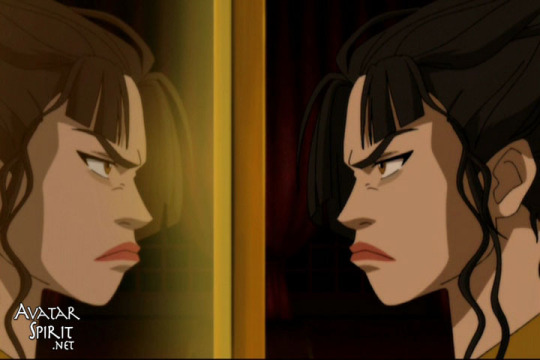
In film, mirrors are used for moments of reflection, obviously, both the physical and emotional kind, but they are also used for moments of deceit, deception, dejection, juxtaposition, contrast and comparison, distortion, delusion, breaking down and breaking through. A persona is never more vulnerable, nor stronger, than when it is staring at itself, and the visual power of these moments have been used in cinematic narratives beginning at the dawn of the medium and continuing to the present day. (source)
It might seem obvious, but mirrors used in film and television have a wealth of meaning, and present a visually striking way to get that meaning across. Mirrors show us who we really are, but they also show us what we want to see. Therefore a mirror can be a symbol of both truth and lies.
This scene in “Sozin’s Comet” is one of the most memorable Azula scenes because of the use of the visual imagery to tell us the story of who Azula is, and it’s one of the most clear pictures we get of her in the entire series. Perhaps Azula is also seeing herself for the first time, but it’s also a moment when she’s at her most self-deluded. Confronted with both the reality of herself and the lie that she desperately clings to.
I think that, more than anything, Azula craves authenticity. Her brother Zuko does, too, and I’ll make a separate post as a follow up to this one because I want to avoid going off on a tangent. I’ll keep this post focused on Azula, although since Azula is an essential part of Zuko’s narrative, it’s hard to talk about them entirely separately. So I am going to cheat a little bit here and talk about what Zuko says about Azula, since it’s one of our biggest introductions to her before we actually meet her.
Zuko (to Aang): There's always something. Not that you would understand. You're like my sister. Everything always came easy to her. She's a firebending prodigy, and everyone adores her. My father says she was born lucky. He says I was lucky to be born.
Zuko puts Azula up on a pedestal here, although it’s one that also comes with a lot of resentment. Zuko defines Azula as everything that he is not, successful where he is not, and adored where he is not. The latter is particularly interesting because although we do get a sense that Azula is “adored,” it is most likely in a shallow way. I think Azula would absolutely be the popular girl in school but she wouldn’t have very many real friends. What she would have is power and status, like many bullies do, and that might be enough to gain her a following, as it does in canon, but it’s clear that this is not enough, and I think that she’s beginning to realize it.
Azula believes in the image of herself as the perfect princess, and several other people in her life reinforce this. Ozai, Zuko, Mai and Ty Lee, Li and Lo. By the end she loses them all, though, and is left with the one person who did see her for who she was. Ironically, this is the one person she does not want to see, because this is the reflection of herself that she does not want to see.
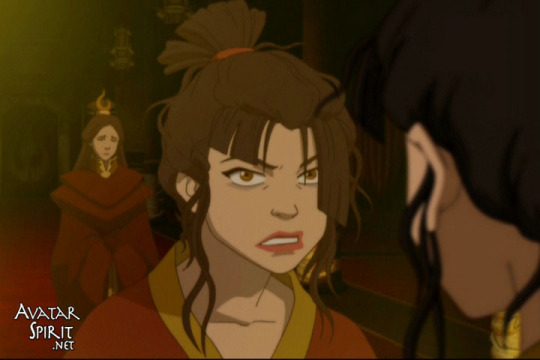
There are several different parts of Azula at play here. The image she presents to others, the image she wishes she could present, and the image of herself that she denies.
The image she presents to others is the one Zuko talks about in “The Siege of the North.” The powerful princess who can’t even have just one hair out of place.
The person Azula wishes she coulbe, the part of herself that craves authenticity but doesn’t know how to get it, is on full display in “The Beach.”
Azula demanding to be invited to a party that Ty Lee and Mai get asked to tells us a lot about how Azula sees her friendship with the latter two. It shows Azula’s jealousy of their social skills but also her need for control in her relationships. Even before the rift between the three really starts, we get a sense that Ty Lee and Mai aren’t as fully in Azula’s corner as she thinks they are. Azula thinks that fear and control are enough to gain her friends and allies. Deep down, she knows that this is not true, however she does not know another way to be. But the party provides an opportunity to try and embrace this authentic self that she craves.
Zuko: Why didn't you tell those guys who we were?
Azula: I guess I was intrigued. I'm so used to people worshiping us.
Ty Lee: They should.
Azula: Yes, I know, and I love it. But, for once, I just wanted to see how people would treat us if they didn't know who we were.
Zuko’s question to Azula is really interesting, too, and I’ll talk about that and Zuko’s perspective in another post, because I want to keep the focus on Azula here. Azula masks her desire for authenticity in haughtiness, saying that she’s “used to” being worshipped and reinforcing Ty Lee’s comment that they should worship her them, and that she loves it, but it’s clear that what she really wants is to be liked for who she is, or rather, who she might be if she were not Ozai’s daughter, princess of the Fire Nation.
This is also shown in Azula’s jealousy of Ty Lee during the party.
Ty Lee: What? You're jealous of me? But you're the most beautiful, smartest, perfect girl in the world.
Azula: Well, you're right about all those things. But, for some reason, when I meet boys, they act as if I'm going to do something horrible to them.
I’ve seen a lot of discussion of this conversation in the context of Azula’s relationship with Ty Lee, and a lot of people cite this as a sympathetic moment for Azula or an indication that she really does care for Ty Lee, although I tend to be less charitable in that regard, since Azula just told Ty Lee that boys only liked her because she was “easy” and made her cry. For me, this scene really highlights the toxic nature of the relationship between Azula and Ty Lee, where Azula boosts her self esteem by bringing Ty Lee down. Azula does admit her jealousy of Ty Lee, and some people read this as Azula comforting Ty Lee, but 1) Azula is the one who made Ty Lee cry in the first place, and 2) Ty Lee is then put in the position of comforting Azula and assuaging Azula’s jealousy, even though Azula is the one who made Ty Lee cry. This is reminiscent of a lot of abusive relationships in which the abuser will harm their victim and then twist the narrative so that the victim has to be responsible for comforting the abuser. Ty Lee knows what is expected of her in this dynamic, and responds by reaffirming Azula’s need to be seen as perfect, Azula agrees, and all is restored in the world again.
Except Azula still craves that authenticity. When she tries it, though, she gets Ty Lee’s advice hilariously wrong, and resorts back to what she knows. Conqueror Azula. Princess of the Fire Nation. Perfect weapon.
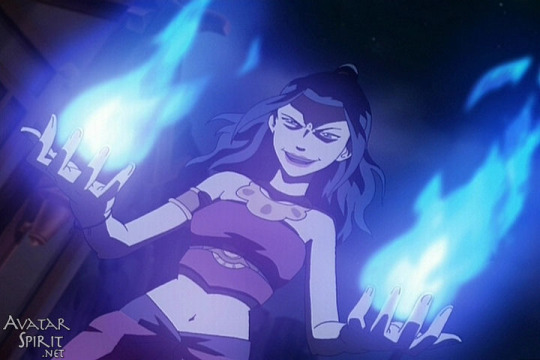
There are a lot of moments that people point to in “The Beach” when they analyze Azula, but here’s the moment which I think is really Azula at her most authentic.
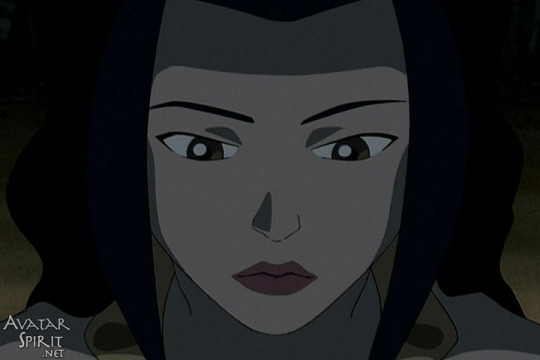
Azula: Well, those were wonderful performances, everyone.
Zuko: I guess you wouldn't understand, would you, Azula? Because you're just so perfect.
Azula: Well, yes, I guess you're right. I don't have sob stories like all of you. I could sit here and complain how our mom liked Zuko more than me, but I don't really care. My own mother thought I was a monster. She was right, of course, but it still hurt.
I’m going to take a slightly different approach than what I usually see when people talk about this scene because I do think this is when we are finally seeing a glimpse of Azula’s authentic self, but not in the way a lot of people who discuss her think.
I’ve talked about how Azula presents a mask to others. Here, she calls Zuko, Mai, and Ty Lee’s emotional confessions about their deepest trauma “performances.” She uses Zuko’s confession to reinforce her place as the golden sibling, calling him “pathetic.” Zuko expresses resentment and anger at “perfect” Azula. And then Azula reveals a sob story of her own.
Azula in this scene shows deep-seated anger towards her mother, which she tries to play off flippantly, but her words reveal how deep this trauma actually is. She says her own mother thought she was a monster. Do I think that this is a reflection of what Ursa thought about Azula? Absolutely not, and I think what has to be remembered about this scene is that it comes from Azula herself. This scene, plus the mirror scene in “Sozin’s Comet” involving Azula and her mother, both originate from Azula’s thoughts and feelings about her mother. We will never know what Ursa herself really, truly thought about Azula, because all we get from her is either from Zuko or Azula’s perspective. These statements and thoughts and visions from Azula are meant to tell us about Azula, not Ursa. This is not, as the “Ursa is a bad mother” crowd insists, proof that Ursa hated Azula. This is what Azula thinks about herself.
We know that Ursa did scold Azula and try to steer her on a correct path, but that’s because Azula was acting in increasingly worrying ways in the flashbacks. The young Azula we see in “Zuko Alone” had already begun to build her Perfect Princess image, modelled after what Ozai expected her to be, and what Ozai expected her to be was both infallible and monstrous.
And a part of Azula knows that what Ozai expected of her was monstrous. But since she had no choice but to internalize it, she could not reconcile that part of herself with the part of herself that was taught right and wrong by her mother. That part of herself she locked away tightly. But comes out here, because Azula in “the Beach” is trying to achieve an authentic self, which is, in fact, what Lo and Li say at the beginning of the episode that the beach is supposed to do, and Ty Lee bookends that sentiment. Just like in the previous scenes, though, Azula still can’t quite get there. Her feelings about her mother are still couched in condescending language, she belittles the others, and she dismisses her mother in the same paragraph. She embraces the monster because that is who she was taught to be, and monsters cannot be hurt.
And that, that’s it. Azula can’t admit that she was hurt by her mother’s absence. I’ve said before that Azula translated her mother’s abandonment as “she loves Zuko more than me” because Ursa left for Azula and in the world where Azula is perfect and Zuko is nothing, that does not compute. This creates some huge cognitive dissonance which cannot be reconciled.
Azula’s confession here about her mother also is a way for her to reinforce to the group that she’s still the most powerful. She casually dismisses Mai, Zuko, and Ty Lee when they talk about their trauma so that she can talk about herself, in language that blames her mother for the person she is. It’s not that Azula is at fault, it’s not that Azula cannot reconcile her fractured sense of self, it’s that everyone else is pathetic and Ursa is a bad mother who made her feel this way, although really, she was right, so what does it matter?
One of the main reasons that most Azula redemption speculation falls flat is that they don’t acknowledge that in order for Azula to get redemption, she has to take responsibility for the ways in which she has hurt others. This would also be incredibly difficult for her, and in some ways that isn’t her fault, because she was very much a victim of Ozai’s abuse, and one way that she was a victim is because by instilling the need that she had to be perfect, Ozai made it nearly impossible for Azula to acknowledge when she was wrong. She gets perilously close here, but then retreats into blaming her mother, her brother, her friends, and anyone else, then denies that she even wants to change, which is the other thing she has to accept in order to get redemption.
Fast forward to Azula confronting her mother’s image in the mirror, which of course is really herself. This is why I hate where the comics took this particular subplot, because I do not think we were meant to interpret it as Azula actually hallucinating. What Azula is seeing in the mirror is really herself, the part of herself that understands right from wrong, but is too afraid to admit that she’s done so many things wrong. That little girl who can’t even properly mourn the loss of her own mother because she was never allowed to, because her father never let her. Right before Ursa appears, Azula attacks her own image in the mirror, viciously cutting her hair, a symbol of “perfect” Azula and an obvious symbol of Azula’s self-hatred. Just as before, though, she can’t really direct this anger and blame and pain at herself, so she conjurs up the image of her mother, who tells her all the truths she wants to deny about herself, that her mother always loved her, that she has embraced fear and control and that this has left her lonely in the end. This is the closest that Azula has ever come to realizing her authentic self, the little girl who misses her mother. But she rejects it again.
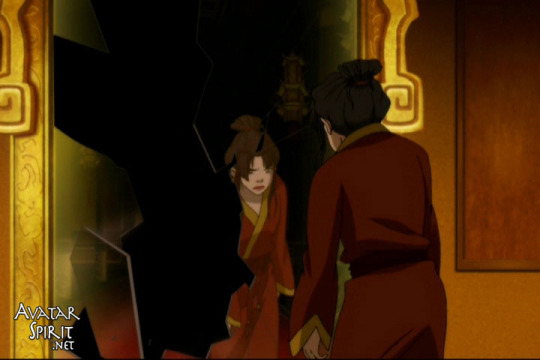
So mirrors represent self-reflection, right? The fractured mirror, then, is a clear symbol for the fractured self. These are all the sides of Azula that she cannot reconcile as one. Whereas Zuko’s narrative deals with the restructuring of the fractured self, Azula’s narrative deals with what happens when the fractured self never becomes whole.
107 notes
·
View notes
Text

...and the unironic joys of better living through chemistry
How do I love Venom: The Hunger, let me count the ways…
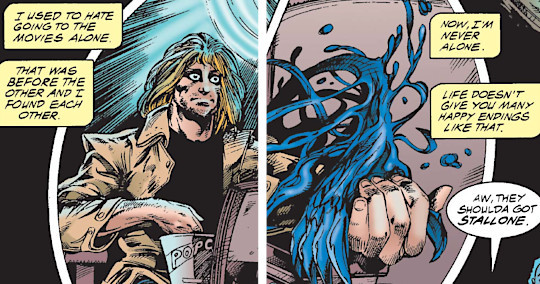
It’s by far the shippiest Venom/Eddie story to come out of the character’s heyday. It’s the only story of the era to treat Venom’s violent wild-animal instincts not as an immutable fact, but as something that can be managed. It pulls off an aesthetic like nothing else that was being done at the time.
And then there’s the way it says, Does the world around you seem sinister and foreboding? Do you lie awake at night contemplating metaphorical oceans of despair? Well shit, son – have you considered you may be suffering from a mundane neurochemical imbalance, and a round of the right meds could clear that right up for you?
It does all this without breaking the atmosphere, without a whiff that our story has been interrupted for a Very Special Message about mental health.
In the near-decade since I was first prescribed anti-depressants, I don’t think I’ve read another story that lands the message “Sometimes, it’s not you, it’s just your brain chemistry,” so well.
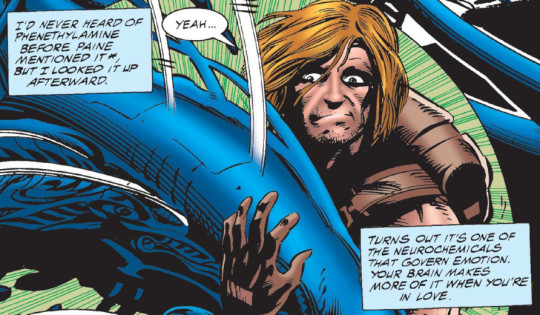
Fair warning: if you have not read The Hunger, I am about to spoil every major plot point. If you have, well, maybe I can still give you a new appreciation for a few details you might have missed.
It’s a strange book, whatever else you take from it. It’s almost the only thing either author or artist contributed to the Venom canon, and it’s so different stylistically and tonally from the 90′s Venom norm that it feels like a tale from some noir-elseworlds setting instead of 616 canon. When you take risks that big with a property, you leave yourself precious little landing space between 'unmitigated triumph’ and ‘abject failure’: if this book hadn’t absolutely nailed it, I’d be dismissing it as edgy, OOC dreck. Fortunately, if The Hunger is nothing else, it is a story that $&#@ing commits – to basically everything it does.
Now, I'm not going to tell you Venom: The Hunger is a story about overcoming depression, because I don't know whether author Len Kaminski even thought about it that way while working on it. There's always space for other readings, and this one take is not gospel. That said: holy shit is this thing unsubtle with its metaphors. And with that in mind, let’s start by talking a little about Kaminski’s take on Eddie himself.
As I may have mentioned before, I like to divide 90′s Eddie into two broad personas: the Meathead, and the Hobo.
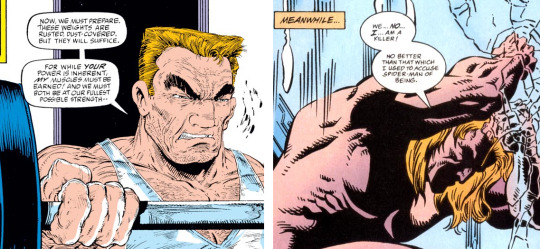
Kaminski’s Eddie nominally belongs in the angsty, long-haired Hobo incarnation, but that’s a bit of a simplification: this version certainly has plenty of angst and plenty of hair to his name – but nowhere, not even at his lowest ebb, does he doubt that he and his Other are meant for each other, which is usually Hobo!Eddie’s primary existential quandary.
He’s also taken up narrating his own life like a hardboiled PI.
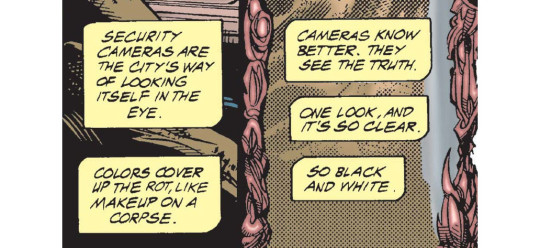
So that’s... novel.
The only other time Eddie’s sounded like this is, er, in that one other Venom one-shot Kaminski penned (Seed of Darkness, a prequel that sadly isn’t in The Hunger’s league), so I think we can safely file it under authorial ticks.
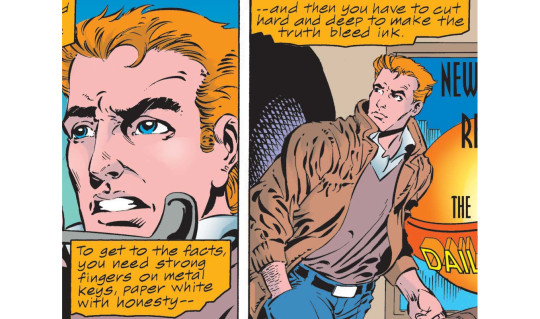
Then again, Hobo!Eddie’s always been one melodramatic SOB, so maybe this is just how he’d sound after learning to channel his angst into his poetry. You can’t argue it fits the aesthetic, anyway.
We’d also be remiss not to mention Ed Halsted’s art, which I can only describe as gothic-meets-noir-meets-H.R.-Giger. Never before or since has the alien symbiote looked this alien: twisted with Xenompoph-like ridges and veins.
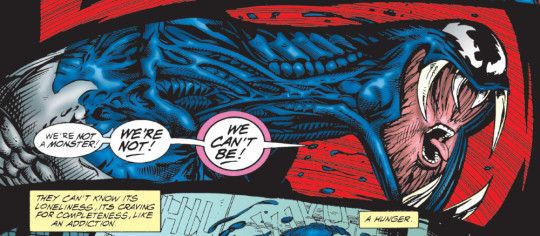
But Halsted doesn’t treat Venom to all that extra detail in every panel. Instead, the distortion tends to appear when the symbiote is separated from Eddie or out of control – and I doubt you need me to walk you through the symbolic importance of that creative decision. More importantly, Halsted’s art provides exactly the class of visuals that Kaminski’s story needs.
Did I mention this is a horror story? You might be surprised how few Venom stories really fit that genre, but if all those adjectives about Halsted’s style above didn’t clue you in, this is one of them.
Anyway, with that much context covered, let’s get into the main narrative of this thing.
As our first issue opens, Eddie’s world has become a dark and foreboding place. He’s not sleeping, though he mostly brushes this off. (Fun fact: trouble sleeping is one of those under-appreciated symptoms of depression. Additional fun fact: the first doctor ever to suggest I might be suffering from depression was actually a sleep specialist. You can guess how that appointment was going.)
Just to set our scene, here’s all of page 1.
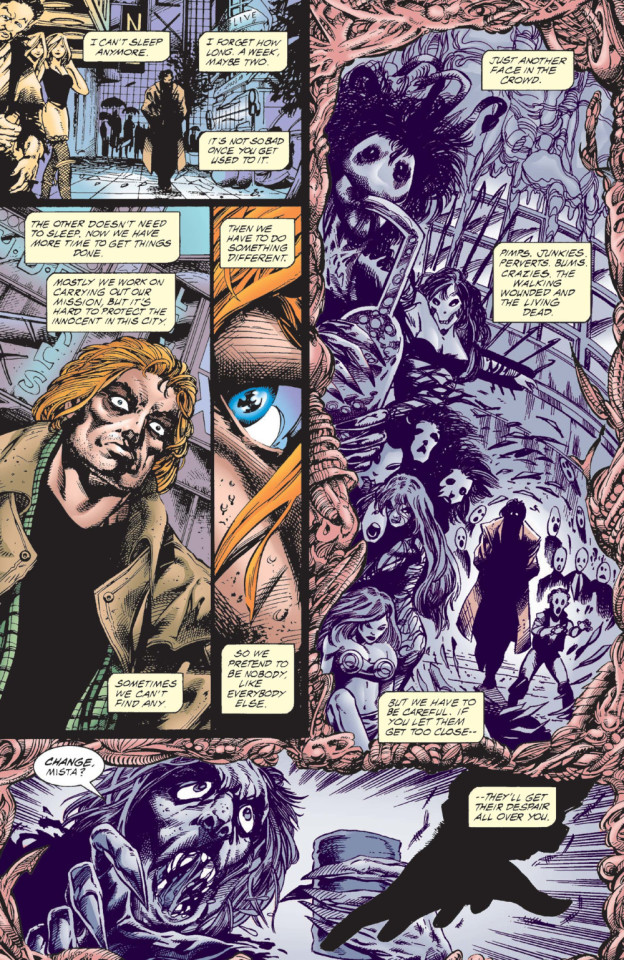
Eddie’s narration has plenty of (ha) venom for his surroundings, but the visuals are here to back him up: panels from Eddie’s POV are edged in twisted, fleshy borders and drained of colour, the people rendered as creepy, goblin-like creatures. A couple of later scenes go even further to contrast Eddie-vision with what everyone else is seeing:
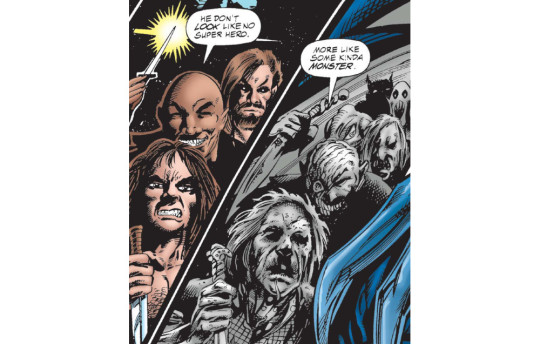
As depictions of depression go this is a little on the nose, but then, you don’t read a comic about a brain-eating alien parasite looking for subtlety, do you?
Eddie doesn’t see himself as depressed, of course. As far as he’s concerned, he’s seeing the world’s true face: it’s everyone else who’s deluding themselves. He’s still got his symbiote, so he’s happy. He’s yet to hit that all-important breaking point where something he can’t brush off goes irrevocably wrong.
But he’s also starting to experience these weird... cravings.
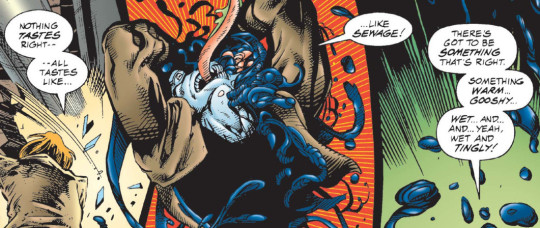
He just can’t put a name to exactly what he’s craving until a routine bar fight with a couple of thugs takes a turn for the horrific.
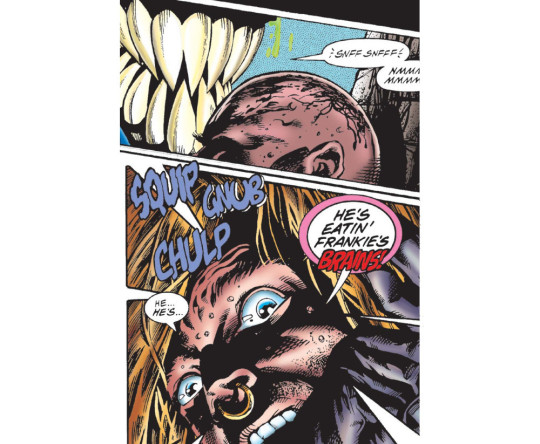
(I include this panel partly to point out even in The Hunger, the goriest of all 90′s Venom titles, you’re still not going to see brains getting eaten in any graphic detail. We don’t need to to get the horror of the moment across. The 90′s were a more innocent time.)
Eddie himself is horrified when he comes back to himself and realises what he’s done.
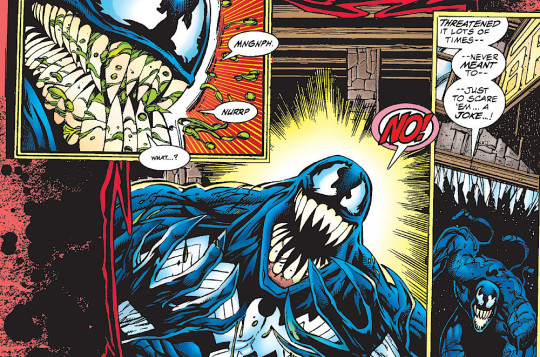
Or rather, what his symbiote’s just made him do.
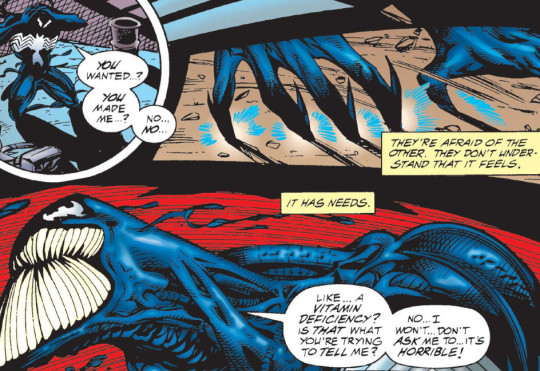
Kaminski doesn’t keep us in suspense about why, though. Eddie may have just done something horrific, but there’s a reason, and it’s as mundane as a vitamin deficiency. He’s bonded to an alien creature, after all, and his symbiote is craving a nutrient which just happens to be found in human brains. And if Eddie can’t or won’t help it meet that need, it’ll do so alone.
Now, giving us that explanation so quickly is an interesting creative decision: this is a horror story, and horror lives in what we don’t know. Wouldn’t it be all the more horrifying had the symbiote been unable to explain what’s going on, leaving Eddie without the first real clue as to where this monstrous new hunger had come from?
The Hunger doesn’t take that route though, and I love it. Eddie isn’t a monster, this isn’t his fault: he has a fucking condition, and wallowing in his own moral failings is going to get him nowhere. You might as well try to cure scurvy or rickets with positive thinking. Just like depression can make you feel like an utter failure at the most basic parts of being human, and all the affirmations in the world won’t fix it when it’s fundamentally your brain chemistry that’s the problem. Or like addicts aren’t weak-willed for struggling not to relapse, they’re dealing with genuine chemical dependency – or even like how someone who’s trans isn’t at fault for being unable to reconcile themselves to the bodies and the hormones they were born with by pure force of trying. Free will is more than an illusion, but we’re all messy, biological organisms underneath, and your own brain and biochemistry can and will fuck you over in a hundred wildly different ways for as many wildly different reasons and it’s not your fault.
We aren’t monsters. But if we do, sometimes, find ourselves identifying with the monster, there might be a reason for that.
(Ahem)
I’m just saying, that’s fucking powerful, and we need more stories that say it.
Anyway, in case you missed it during that tangent, issue #1 closes with the symbiote having torn Eddie’s heart in two itself free to go hunting brains without him.
I’m trying not to get too sidetracked at this point talking about Kaminski’s take on the symbiote itself. Suffice to say there are broadly two schools of thought on how it ought to function while separated from its host: the traditional ambulatory-slime-puddle version, and the more recently popular alternative where anything-you-can-do-with-a-host-you-can-also-do-without-one. I’m not much of a fan of the latter, personally: if your symbiote doesn’t actually need a host, I feel you’ve sort of missed the point. (The movie takes the route of saying symbiotes can’t even process Earth’s atmosphere without a host, which is a great new idea that appears nowhere in the comics, and I love it. Hosts or GTFO, baby!)
Kaminski has his own take, and I can only wish it had caught on. Without Eddie, the symbiote becomes an ever-shifting insectoid-tentacle-snake-monstrosity, driven by an animalistic hunger. It’s many things, but it’s never humanoid.
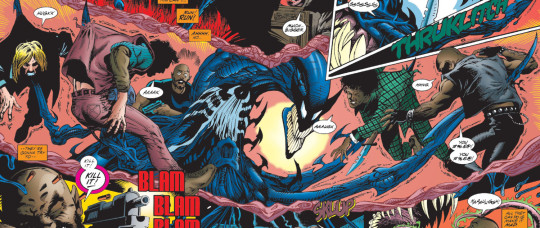
If you absolutely must have your symbiote operating minus a host, I feel this is the way to do it: semi-feral, shapeless and completely alien (uncontrollable violence and cravings for brains to be added to taste).
Issue #2 comes to us primarily through the perspective of the mild-mannered Dr. Thaddeus Paine of the Innsmouth Hills Sanitarium (yes, really).
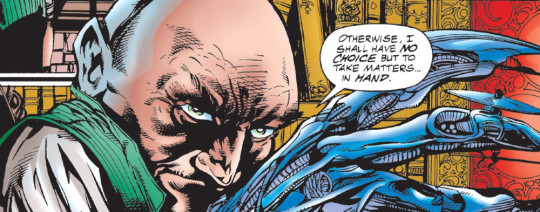
Yeah, he’s not fooling anyone. Meet our official villain! He joins our story after Eddie is picked up by the police and handed off to the nearest available institution, on account of how completely sane and rational he’s been acting.
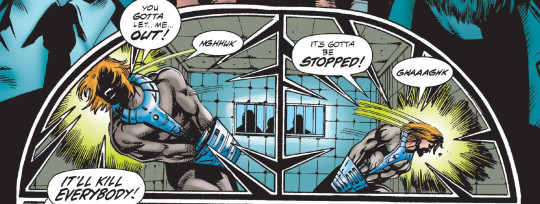
Naturally, Dr. Paine soon has copious notes on Eddie’s ‘crazy’ story about his psychic link to a brain-eating alien monster. Fortunately for Eddie, Paine also runs some tests and makes an interesting discovery.
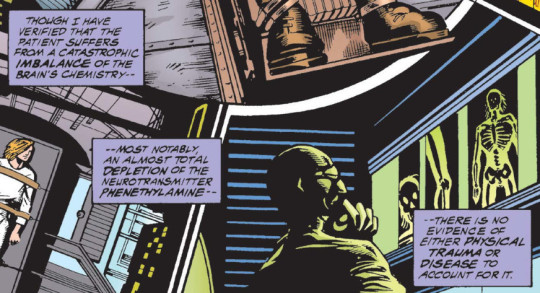
Congratulations, Venom: the ‘vitamin’ you were missing officially has a name!
Finding the right meds isn’t always this easy. I got lucky – the first ones my psych put me on worked pretty well – but I have plenty of friends who weren't so lucky. In fact, the treatment for Eddie's problems is so straightforward it arguably has more in common with, say, endocrine disorders like thyroid conditions or Addison’s disease, which differ from clinical depression but present many similar symptoms (but can sadly be just as much of a bitch to get correctly diagnosed – please do read author Maggie Stiefvater’s account of the latter when you get the chance, because forget Venom, that is a horror story).
‘True’ depression remains much less well understood by medicine, either in its causes or how to effectively treat it. But simply having a name for what was wrong with me made so much difference, and that’s an experience I imagine anyone who’s dealt with any long undiagnosed medical condition could relate to. It put my life in context in a way nothing else had in years.
(I can’t speak to the accuracy of the way phenethylamine is portrayed in this comic – a quick google suggests there may be some real debate that phenethylamine deficiencies have been overlooked as a contributor to clinical depression, but having no medical background, that one’s well beyond me. Either way, scientific accuracy really doesn’t matter in this context – it’s how it works in-universe for story purposes that we should pay attention to.)
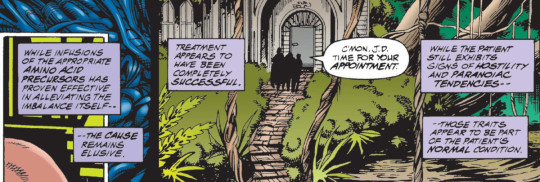
Since this issue is mostly from Paine’s POV, we don’t get Eddie’s reaction to having a healthy amount of phenethylamine sloshing around in his brain again, just the assurance that treatment appears to be ‘completely successful’.
He’s still a paranoid, hostile bastard though. Meds can turn your life around, but they won’t make you not you.
But even if Eddie’s feeling better, he’s still psychically linked to someone who isn’t. Symbiote-vision still comes through drained of colour and edged in viscera.
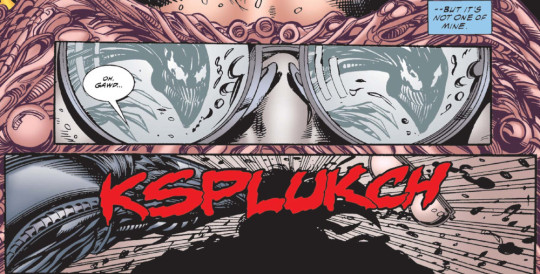
That’s the thing about meds: they won’t solve all your problems overnight. If you’ve been depressed for a while, there are good odds you have problems stacking up. But working meds can be a godsend when it comes to getting you into a space where you can deal with your problems again, whether said problems are doing-your-laundry or all the way into not-giving-up-completely-and-just-accepting-you’ll-die-alone-on-the-street.
For Eddie, ‘dealing with his problems’ begins with stealing a keycard and busting out of the asylum.
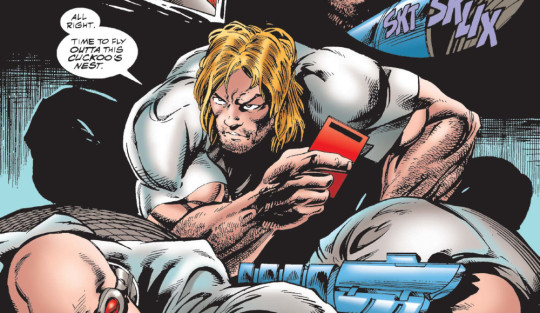
Of course, that’s the easy part. How do you solve a problem like a feral symbiote? Like any good 90′s comic book protagonist, Eddie tackles it by putting on his big-boy camouflage pants and kitting himself out with weapons and pouches while quoting “If you live something, set it free. If it doesn’t come back, hunt it down.”
We can add this to the list of things I love about this comic. Even if The Hunger is a weirdly-stylistic tract about depression at heart, it’s also still a goddamn 90′s Venom comic, and not ashamed to be.
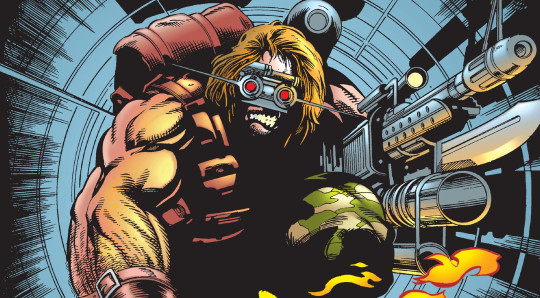
We’re into issue #3 now, and back to hearing the story from Eddie’s POV.
Eddie is very much aware that his symbiote has murdered innocent people while they’ve been separated. Even if this is the result of extreme circumstances, there’s a good case to be made that the symbiote is too dangerous to be allowed to live. Plenty of heroes would treat it like a rabid dog at this point.
But Eddie isn’t a hero, he’s a mess of a character and an anti-hero at best, so we don’t have to hold him to the same standard. He’s well aware his symbiote may be too far gone to save, that he may have to put it down – but that’s only his backup plan. He wants to help it. He wants it back. He’s down in that sewer with screamers and a flamethrower because he knows all his symbiote’s weaknesses, but he’s also carrying a large jar of black-market synthesised phenethylamine, because if he can just get close enough...
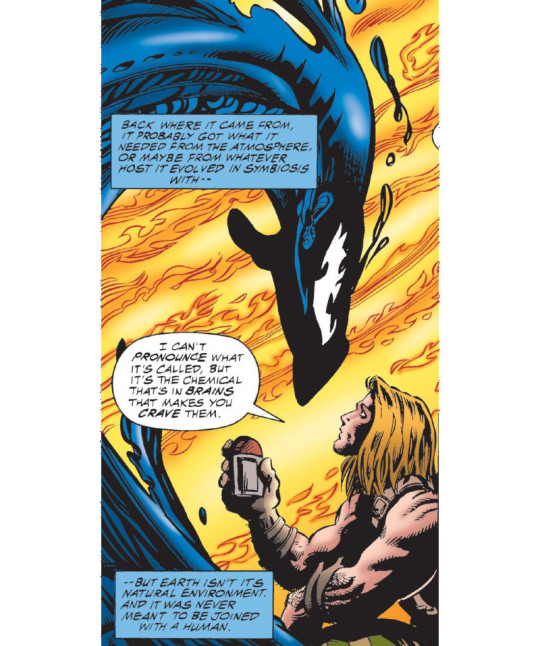
Depression can’t make you a literal monster, but it can make you an asshole. Miserable to be around, lacking even the energy to care who else you’re hurting. The depression doesn’t excuse that, but it makes everything harder, and it’s that much easier to sink back into your spiral when everyone around you has given up. It can make you think everyone around has given up even if that isn’t true.
So to have Eddie here say, in effect, I don’t care how many people you’ve eaten, I know it wasn’t your fault. I still love you. You’re still worth fighting for – god, does that get me right in the id.
There’s still a whole issue left at this point – we’ve still got to deal with our real villain, Dr. Paine, who we’ve just learned is into eating brains himself and torturing his patients recreationally, and who wants to capture the symbiote for his own purposes. There’s the scene where Eddie and his symbiote finally bond again, and Venom beats up all Paine’s goons while singing David Bowie because like I said, this is still a 90′s superhero comic and this is what Venom does.
But for our purposes, I'm going to skip to the penultimate page of the story, because the way it mirrors our opening page is really lovely.
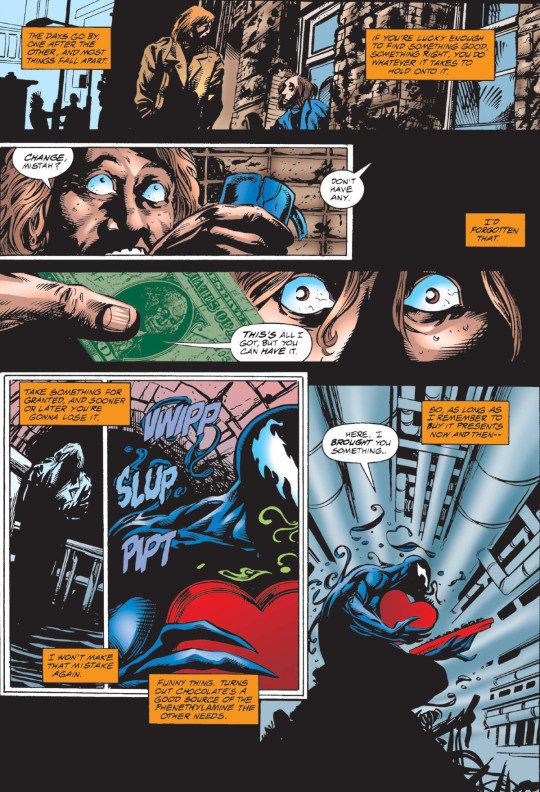
Remember that shot of Eddie dealing with a beggar back at the beginning of the story, thinking about how these people would 'get their despair all over you'? Here he is again, cheerfully forking over the last dollar in his pocket to the next man to ask him for change. For all the gothic atmosphere and gore, it’s moments like this that make The Hunger easily one of the most positive, uplifting Venom stories ever written. Funny, that. (I could probably write a whole other essay on sympathy for the homeless as a recurring motif in Venom stories, but that... well, whole other essay and all that.)
What’s Eddie learned from this experience? Don’t take your symbiote for granted. Is ‘symbiote’ a metaphor for mental health here, is paying attention to its needs an allegory for paying attention to your own? I still don’t know how literally Kaminski meant us to take this, but it’s a lovely note to end on no matter how you parse it.
At the end of the day, The Hunger isn’t flawless. The conflict with Paine ends on a thematic but slightly unsatisfying note. Eddie makes much of his symbiote's loneliness and desire for union, but when the two of them are finally reunited, the only reaction comes from Eddie's side. In fact, the symbiote seems to have no response to being able to return to Eddie at all, and that’s an omission that bugs me.
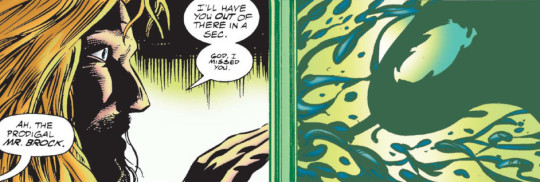
But Kaminski is more interested than any other writer of the era in the truly alien nature of the symbiote, in its relationship with Eddie from Eddie’s side, and though plenty of others talk about the symbiote's love/hate relationship with Spider-man, no-one else had the guts to portray their relationship this much like a romance.
And Venom: The Hunger is no less interesting in the context of Len Kaminski’s other work. You don't have to look far into his Marvel and DC credits to pick up that the guy has a real thing for monsters. (“All of my favourite characters are outlaws, misfits, anti-heroes,” he says, in one of the very few interviews I could find with him, “I wouldn't know what to do with Superman.”) He's written for vampires, werewolves, victims of mad science, and all of three at once, littering his work with biochemistry-themed technobabble, melodramatic monologues, gratuitous pop-culture references, and protagonists who must learn to embrace their inner demons. So The Hunger represents more than a few of his favourite running themes.
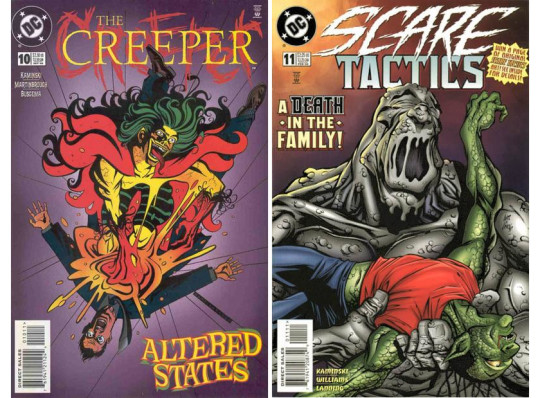
For our context, his more notable other work includes Children of the Beast, in which a werewolf must make peace between his human and animalistic sides, and The Creeper, in which a journalist must make peace with the crazy super-powered alter-ego sharing his body. In fact, The Creeper and The Hunger share so much DNA (including an evil doctor posing as a respected psychiatrist who uses hypnosis on our hero while he's trapped in a mental institution) that it’s quite the achievement that they still feel like such very distinct entities beyond that point.
The human alter-egos of both werewolf and Creeper even use prescription meds while wrestling with their respective dark sides. The difference, in both cases, is that these are stories where meds play their traditional fictional role – and that's a role that could be as easily filled by illegal drugs or alcohol without making any substantive difference. You see, if a protagonist is using them, it's a sign of unwillingness to tackle their 'real' problems. Even among work by the same author in the same genre, The Hunger represents an outlier. And that's just a little disappointing – at least to me.
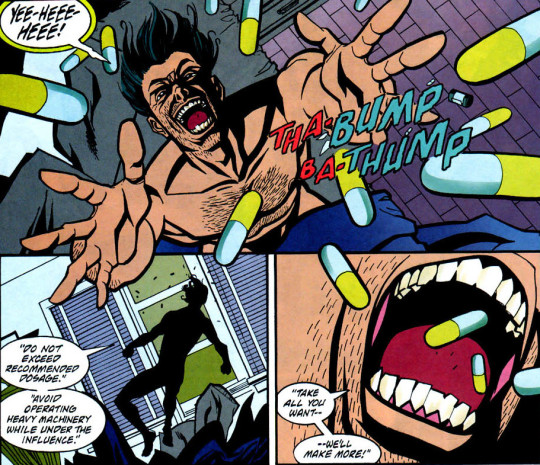
In real life, of course, prescription meds are no magical cure-all elixir. Depression meds that work for one person may not work for another, or may not keep working in the longer term. Everyone has heard stories about quack doctors who prescribe them to the wrong patients for the wrong reasons, about lives ruined by addictions to prescription painkillers, or the supposedly-damning statistics about how poorly SSRI's perform in rigorous clinical trials. The proper way to treat depression is obviously with lifestyle and therapy. People will still airily dismiss medications that we all know previous generations got along just fine without, or suggest that figures like Van Gogh would never have created great art if they hadn't been mad enough to slice off an ear. I mean, the fact you think you need those bogus mediations is probably the best possible sign of just how broken you are, right? Who do you think you’re kidding?
Our popular fiction loves stories about manly men who bury their trauma under a gruff, anti-social exterior and come back swinging at the world that broke them, bravely refusing even painkillers that might dull their manly reflexes. Other genres make space for broken people confronting their demons in grand moments of catharsis, finally breaking down into tears when someone gets through to make them face their problems. "I could barely make it out of bed in the mornings until I found a doctor who started me on this new prescription" is not only wildly counter to the accepted social narrative, it's a hard thing to know how to dramatise.
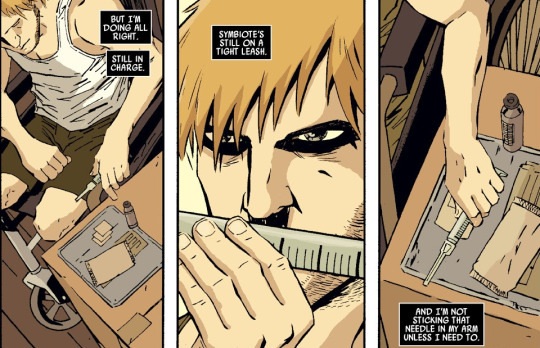
Even other Venom comics have been guilty of this.
Believe me, I recognise all of this, and just how much progress we've made in the last few decades. But I haven't the slightest doubt that for so many vulnerable people, the stigma against prescription medications does infinitely more harm than those same meds could ever do. And just having the right to externalise my problems into it's not you, it's your brain chemistry, may have helped me more than the meds themselves.
(And again, no, being prescribed SSRI's didn't fix me overnight, but I honestly don't know if all the talk therapy and tearful conversations with family members in the world could've got me as far as I've come without them.)
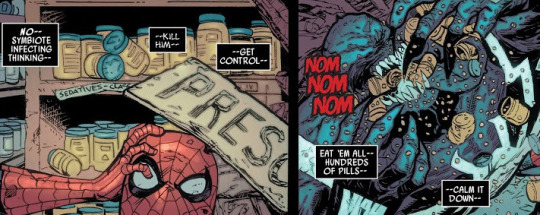
I love Venom: The Hunger. It's no-one's idea of high art, but it doesn’t need to be. There is a whole other post’s worth of things I love about it that I’ve already cut out this one as pointless tangents, and that may actually be it’s biggest drawback as a go-to example: I fully recognise that I would not be making this post if The Hunger hadn't also also grabbed me as a great bit of Venom canon, being the massive fan and shipper that I am. Other people who are just as desperate as me for more stories with the same core theme, but not into weird 90's comics about needy goo aliens, probably won't get nearly as much out of it as I have.
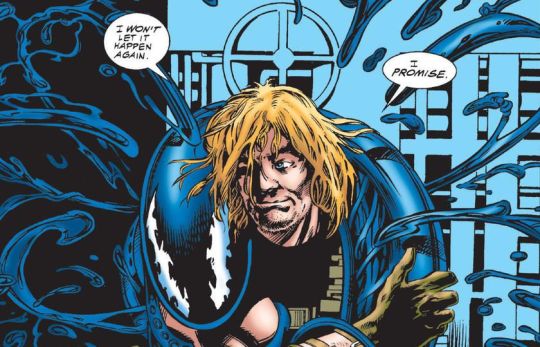
But if it sounds anything like your jam, maybe you'll enjoy it as much as I did.
If nothing else, it proves that you can make a viscerally satisfying story out of a message that shockingly unconventional. And you may even have people still discovering it and falling in love with it 25 years after the fact.
94 notes
·
View notes
Note
As someone that loves almost every character in ACOTAR but still wants to discuss their flaws and slip ups I really liked your post about Nesta and how she treated Feyre as a sister. None of the characters in ACOTAR are perfect. They have flaws and people in the fandom need to keep the same tone about all of them when it comes to that. Don't excuse one character and bash on the next. Like of course you can have your favorites, but Idk I just love seeing the characters as flawed rather than put them on a pedestal. Cheers 🖤
I mean I absolutely love flaws. I love Nesta for that reason. She’s such an imperfect, easily debatable character. Her interactions with others are amazing because of this, because she’s not so easy to be around, so she pushes a lot of boundaries or expands the way these characters have learned to adapt in their world. They’ve never met anyone who is not so easily swayed, which is obvious in all her interactions with them. Though I won’t get into it, since this post will be a thousand times longer.
But I think if any character is most human-like, as in she is based on how someone in the real world would act, she’s probably the most authentic in my opinion. But authenticity requires a level of flaws that can’t be denied or overwritten. So, I really did want to stress that, that she can keep her mistakes, her cold demeanor, her sometimes harsh words, her standoffishness, her distrust many times, but at some point she’s going to have more character development and will she really exonerate herself and claim she played no part in her own life or the lives of her family members? She hasn’t before. She’s acknowledged that Feyre went out and kept them alive, but to what extent does she feel guilty or regretful or even blameless? Not specifically about that situation, but... the lack of friends, her relationship with her father, her sisters, or any close relationship before and after the trauma, her own wants, wishes, goals, the lack of purpose. In the case of the cabin, and now in the case of her father’s death, she’s really coping the same way. Someone else is supporting her, and she’s really mentally unhealthy and very closed off. You know maybe I’m taking a page out of my own psychotherapy textbook, but I think healing for her would require her to see more options, to be open to more opportunities, and for her to see the world and how she interacts with it a little bit differently where she has accountability for her own wellbeing and happiness, but also accepts the role she played in the past that she could’ve changed.
*But* if she copes that way throughout the series and she doesn’t allow anyone in and she unintentionally hurts someone’s feelings, for lack of a better term, then their feelings are still valid whether we understand them or not. That’s how POV’s work. A change in the narrative. And if in Feyre’s POV Nesta’s done wrong in some way even though some may not agree, even if Feyre herself has done wrong, it doesn’t mean we erase the mistakes as if they didn’t happen. I think to really analyze a character you need to see the whole character and not just the things that make them palatable or the things we’d rather ignore/excuse, even in the pursuit of defending them. As readers, we’re the third party observers, so we can see more things than the characters, but to Feyre for example, Nesta has an odd way of showing her love to the point where we have instances where she questions it throughout the series. It doesn’t mean necessarily that Nesta has to change or that she doesn’t love Feyre, but it also doesn’t make Feyre wrong to feel that way. or Elain or Cassian or Amren whatever happened to them. It also doesn’t make the Inner Circle wrong for not liking her, though the situation is more complicated than that. If Feyre’s hurt that Nesta won’t come to her after all they’ve through, after she’s reached out, and tried to help in the way that she knew how, then she is allowed to be hurt. And if Nesta’s perspective says that Feyre wronged her after what happens in ACOSF, even if Feyre had good intentions and explains her intentions, Nesta has been wronged. I think there’s a certain level of validity that we need to keep when discussing their interaction or any interaction, otherwise we start playing a blame game, when no one is at fault. It’s too complex to be simply one person’s fault and we know practically nothing of Nesta’s POV. It’s not Feyre or the Inner Circle’s fault that Nesta is in a bad way. But it’s not Nesta’s fault that Feyre sometimes feels hurt or betrayed or unloved. Which unfortunately makes the situation very complicated and quite oxymoronic.
Also I think that sometimes people feel (which people have also said to me) that discussing Nesta’s flaws is a direct attack on her character, because other character’s flaws are not as highlighted in the fandom nor Feyre’s POV. But I think that in itself is a whole other post. Because Feyre has grown up with Nesta, and she has seen her in so many lights, and she’s really only beginning to know how the Inner Circle are truly when the wars are over and the dust has settled. You know, they took her in when she was really low and in an emotionally abusive relationship and having had a traumatic experience with the Amarantha situation, and they supported her and her decisions. So, I find that it would be hard to really expect that from Feyre where we ended in ACOSAF. But this of course doesn’t mean that we can’t dislike a character or question why they do things. It just means that we can dislike a character for a lot less than having to make one character seem inherently greater than another and making people feel bad about it. They all offer value to the series that we all are so obsessed about. But also we as posters can’t reasonably post essays. Like I can’t post something discussing Nesta’s flaws and a specific circumstance and then equally talk about several other character’s flaws in the same post to make everyone feel better and sure that I’m not taking a side.
Which is what I try to get at sometimes when people comment and they seem a little bit too aggressive. Which is why I really don’t like the whole anti/pro debacle, even though I understand the practicality of being able to filter certain posts you see on tumblr because of those hashtags. Thankfully there hasn’t many people who are uber aggressive and honestly I block a lot of people who continually post things in which they don’t allow their opinion to be challenged in any way. Because at the end of the day, none of us are wrong, but... some I’d say are more right than others--simply because they have and use textual evidence to back up their claims or they make reasonable connections that don’t stomp on anyone’s opinions and open up a discussion in which everyone exchanges their ideas. There are so many posts I absolutely adore in either direction, because of how well-rounded they approach the topic.
That being said, quite honestly that post that thankfully you appreciate, absolutely drives me insane. Every time someone likes it or comments I get so afraid that it’s going to be someone telling me off. But I’m a very anxious person so that’s probably why, but also I’ve seen many people being told off lol. I really was hoping it wasn’t too bad or being too biased. I absolutely hate that. And I certainly don’t want to be just agreed with, I love active discussions and will have them with many people on here, but I don’t like feeling like at any moment I could be invalidated and my opinion worthless when all I did was post something I felt was accurate to my own analysis. So I’ve almost deleted that post so many times. But thankfully, y’all are not horrible... so far.
Anyways, I for some reason go on tangents that only half make sense. Stream of consciousness and ADHD I guess. But hopefully this reply wasn’t so drastic. I absolutely love that you support the active discussion of flaws and the character’s who have them and you are more than welcome to discuss with me anytime :D As long as your okay with the fact that I write essays as opposed to simple thanks haha!
17 notes
·
View notes
Text
Essays in Existentialism: Polo 3

Previously on Polo
The sun was glaring; absolutely murdering the entirety of the world in the noontime shine of a clear day in the early spring. The heat couldn’t come just yet, still not allowed due to larger forces like the tilt of the planet and the distinct absence of a certain player, yet to be seen despite a not-so-covert glance at the pitch during warm ups. The entire event was going to be the largest of its kind, and it was like the world knew it, opening itself up and shining all of the kindest wishes on the sport, as a large herd of watchers made their way to find a place to watch.
The tents were stocked with alcohol and snacks, people in hats and those who were there because they were supposed to be. But along the pitch, bleachers filled up with anyone who wanted to watch, creating an atmosphere of joy and excitement that’d been lacking at the private matches.
There really wasn’t a reason to be there. Clarke had more than fulfilled her daughterly duty for the entire year with her increasingly frequent showings at events for both of her parents. She chalked it up to growth, and becoming a better person, to make an effort, to try her best to show her mother that she was happy for her, and to prove to her father that she was deserving of her name, even if that meant trudging through society things in lieu of his wife.
But seeing as Kane’s opening of the Gauntlet of Polo opening day party was not her mother’s, nor was it something she felt compelled to do to represent her father, Clarke had no true reason to go other than because Kane was nice enough to invite her, and she truly had nothing else to do.
“So where’s the hot polo playing Argentinian underwear model who recites you poetry and fucks you in stables?”
Clarke grit her teeth before sighing and shaking her head, giving her best friend a look that should equal death, if she’d been luckier.
“What?” Raven shrugged. “I want to get a good look at the girl that convinced you to be okay with your parents divorce. I’m sure there are over-paid therapists who would kill to know how to do it.”
“She didn’t--”
“And made you nicer in general to your parents. And me. And your life is less chaotic now-- I’ve noticed you are volunteering. That must be some of the worlds most powerful puss--”
“Kane! Mom!” Clarke interrupted her friend’s tangent, thankfulness apparent in her voice as she found the host and hostess.
Her mother was always beautiful, but Clarke began to see how much nicer happiness looked on her, and as much as she claimed to always love her father, there was a girlish spark that came when Abby was near Marcus. It took Clarke long enough to put aside her feelings to see it, but when she did, she couldn’t have been happier, despite the occasional bitterness about what was lost. It was Lexa’s stupid notions of love that messed with her brain and her ability to hold a grudge.
There’d been a truce between herself and Kane, reached gently and treated very cautiously, but still, it remained. She had dinner with them just a week ago when they were in the city, and it wasn’t entirely painful. As much as she wanted to dislike Marcus Kane, she couldn’t bring herself to do it because he was just… nice. And he made Abby smile in a way that Clarke didn’t realize she hadn’t seen in a while.
The real benefit of all of this love and joy being that while Abby got to live her best truth, it meant less comments about Clarke’s “wasted potential,” and there was a bigger focus on her art, which led to less stress with their average communications.
“Oh, honey you made it,” Abby smiled and hugged her daughter, kissing her cheek quickly, squeezing her shoulders. “I didn’t think we’d find you in all this.”
“Believe it or not,” Clarke explained as she accepted a quick hug from her mother’s boyfriend. “It’s easy to find the guy who owns a team in a tournament sponsored by his company.”
“I’ve been looking and couldn’t find you.”
“I took Raven to see the ponies.”
“Look at that,” Kane grinned. “She’s using proper jargon already.”
“Clarke’s given me a quick rundown, but I don’t know if I trust her expertise yet,” Raven offered after all pleasantries were exchanged. “Care to teach me, Kane?”
“The more the merrier,” he smiled wider, like a kid in a candy store, surrounded by people who wanted to listen to him explain his favorite sport. “We better go find a good spot. It’ll start soon.”
Raven turned and gave Clarke a wry grin before linking her arm with Kane’s as she maneuvered them through the crowd. Clarke let her mother squeeze her and follow along a few steps behind.
“It means a lot that you’ve tried to take an interest in something that Marcus finds important,” Abby offered as they meandered along.
“Just a good reason to be outside, and Raven loves selling rich people her programs and things,” Clarke dismissed her effort for anything benevolent as she grabbed a flute of champagne gratefully. “I’m fairly certain that’s the only reason she keeps me around.”
“Whatever the reason. It means a lot to me. I know it wasn’t easy to find out--”
“We don’t have to do this.”
“I know,” Abby relented. “You just never cease to amaze me is all. Marcus is important to me, and you’ve taken the time to get to know him, just like I’m sure you would when your father starts--”
“Dad won’t date anyone else.”
The words came out a little bit too harsh, and Clarke wasn’t sure why she felt so protective of her father’s refusal to get over a broken heart.
“He will eventually, and believe it or not, no matter how he feels about Marcus and even me right now, seeing you be open to our happiness will make it easier.”
“I guess I’m just a saint.”
It was meant to be a joke, but Clarke felt suddenly a little guilty. They took their seats beside Kane and Raven, and Clarke looked out on the pitch, wondering if she would be there at all if it hadn’t been for the oddest addiction she somehow developed for a stupid girl who argued with her every time she saw her.
She might not even get to see Lexa today. She might only see her on the pitch. And would that be a waste? Should she think about this perfect stranger as often as she did and look forward to this stupid even for the past three weeks? Was she proving Lexa’s points right about lust and love and soulmates? Did she believe in something like soulmates? How could she? And what did it matter. Wasn’t this a lot to do just for sex? Very, very, very good sex, but still--
“You’re not zoning out already, are you, Clarke?” Kane smiled and waved his hand in front of her face, bringing her back to reality.
“Just listening, making sure I remember everything.”
Raven gave her a look.
“Now tell me about your team. Clarke was telling me all about how skilled the one… what was her name?”
“Lexa,” Kane offered excitedly, before Clarke could bring herself to utter the name. “She is incredibly skilled. I’ve never seen someone ride with such passion. She is so fluid, covering everything, seeing plays before they happen. And she’s got this passion in her blood for the sport. She hits hard, and takes a licking-- Are you okay?”
Only when Kane stopped talking did Clarke realize she’d spilled her glass, letting it tilt back toward her chest as she remembered exactly how passionate and fluid and licking that Lexa had been. The cool liquid froze her chest, dripping down her front as she hurried to pat it dry.
“Fine, fine. I wasn’t paying attention.”
“Off in another world,” he offered politely.
“This girl has her head in the stables,” Raven joked, though only Clarke understood it. “I get now why Clarke’s so passionate about those ponies. You are a hell of a salesman, Kane.”
“This is something that costs me money. Imagine what I can do with something I want to make money off of.”
They shared a laugh and Clarke joined in, only half paying attention as the team was announced and she caught the now familiar jerseys making their way to the center for the start of the match.
There was an air to the polo player, helmet on, stoic and sitting tall as she stood beside her fellow teammates, her horse still as she was. Lexa listened politely to the anthem, she listened to the announcer, but she didn’t move more than necessary. It was by a stroke of luck that she found Clarke in the crowd, though Clarke wouldn’t agree anything was lucky about it, because now she had to sit in the stands after getting the full weight of Lexa’s glance. Only slightly did Clarke notice the pull of one corner of Lexa’s mouth and the fire behind her eyes. It made her gulp.
Lexa didn’t look away the entire time and neither did Clarke. She didn’t have to say anything. They both knew.
XXXXXXXXXX
It was an actual match, and a hard fought one to begin the Gauntlet that would last the next few months, and Lexa ached in the most delicious kind of ways after the win. Over the next week she’d have to win five more to hoist the first cup, collect the first purse, and move onward in hopes of completing the perfect Gauntlet, winning all three cups, and collecting the bonus purse that would triple her yearly income.
No pressure at all when trying to impress a girl who was set to inherit billions. With a B.
Showered and cleaned up, Lexa made it to the crowds in time to catch part of the second match. The sun was dimming, fading into the trees, giving a bit of a sunset despite the lights that shined over the pitch. It was a perfect evening for polo, and Lexa felt it, still riding the high of her win and feeling the limitless possibility of the next few months.
It didn’t hurt that she caught a certain girl’s eyes before it started and put on a show. No, Lexa didn’t think about that at all.
There was absolutely no way she had a chance with someone like Clarke, prize purse be damned. Lexa was the person who got a taste-- who was used for the pleasure of someone who had other responsibilities. In all of her dealings with people like Kane, with people like Clarke, she knew she was an interloper; destined to be a tagalong, someone who was never quite part of their world. Those were the things that she thought about after that momentary rush of seeing Clarke-- an intense loss at never having her completely.
She didn’t look for Clarke in the tent with the other donors because she could feel her. It would take her a moment to get back to being okay with being a plaything. It had its perks, and it wasn’t the worst thing in the world, to be someone who only got a taste when that taste was delicious. Lexa was okay with the being just a fling, if only her heart would listen and not get in over its head.
“You, in that dress,” Lexa whispered as she approached a bare back, the navy blue of the dress, dipping along spine, hanging on shoulders. “Has all of my attention.”
“Are you sure?”
Lexa half-smiled and grabbed a flute of champagne, handing it to the woman beside her before taking one for herself. Only then did she allow herself to look at Clarke, meeting blue eyes and lips she desperately wanted to kiss already, after exactly one second of being within her orbit.
“It’s becoming a problem, princess. You look too distracting in everything.”
“Maybe you should stop looking?”
“Would you like me to stop?”
With her words, Lexa shifted closer, and Clarke felt it. Their bodies moved around, hovering and refusing to touch though desperately wanting to feel the next. Clarke licked her lips and looked up from beneath her lashes while Lexa looked over her cheekbones as she took a sip and played with the stem of her glass.
“It’s been three weeks. You didn’t try to find me?”
“I’ve been busy training,” Lexa tried, unsure of if she was supposed to find Clarke. She never knew it was an option. “And I didn’t… Three weeks, and were you preparing for a Gauntlet?”
“You were the one that was trying to convince me to fall in love with you.”
“Or lust.”
“Right, or lust,” Clarke nodded. “I couldn’t find you. That’d just prove you right.”
“And we wouldn’t want me to be right, would we?”
Despite herself, Clarke smiled, small and there. She blushed a little, right beneath her jaw, near her earlobes. Lexa gorged herself on it.
“If you’re right, you get all of the power. I can’t give you that.”
“But it would be great if you did. I promise to be a benevolent overlord.”
“What if I don’t know how to be kept?” Clarke asked after a moment of quiet. It was the most honest thing she’d said in their time together.
Lexa reached forward to touch her, finally. She ran her finger along her forearm, and she paused at Clarke’s wrist, running her thumb along the small protrusion there. She watched her fingers move against Clarke’s skin.
“I’m good at being still. I’ve broken more wild things than you, princess.”
As she stood there, Clarke felt Lexa’s warmth, and she wondered to which level they were speaking, because almost accidentally, she’d confessed one of her truly darkest fears, that she wasn’t one to be in love, that she didn’t know how, that she wasn’t sure she was worth being looked at like Lexa looked at her, whether it be love or lust of something between.
“I completely mean to interrupt whatever is happening over here,” a voice rang out, oddly cheerful and not at all in line with the tone established.
Lexa retracted her hand quickly, finishing the rest of her champagne as a result of compensating for the movement. Clarke stood up, her body language becoming alert and afraid. There was the shame, Lexa saw and pretended to ignore, of being caught with someone like her.
“Hell of a game you played out there, Lexa,” the new woman explained as she grabbed them another round of drinks from a passing tray.
The crowd cheered for whatever was happening on the pitch, and Lexa looked toward it in hopes of finding a reason to escape, the trance of Clarke Griffin broken for a moment.
“And I heard all about how amazing your play was from Kane. Clarke couldn’t keep her eyes off of you, and I have to say, I get it now.”
Lexa found her interest turning back to this shorter, nonplussed member of their group, her interest piqued as she recognized a fellow interloper, although someone who seemed to own it much better and in a way she almost envied.
“I wasn’t--” Clarke began before taking a breath, earning a grin from her friend. “Lexa, this is Raven, my best friend dating back from elementary school, so please don’t hold it against me.”
“I couldn’t. She seems to have such great taste if polo players,” Lexa grinned, extending her hand. “Lexa Woods. It’s a pleasure to meet you--”
“Raven,” she offered, shaking it heartily. “I’ve heard many things.”
“All good, I hope.”
“Mythical, some might say.”
Clarke coughed and cleared her throat until her friend returned the hand it’d been shaking and went back to sipping her champagne. Lexa felt her chest puff a bit, and she couldn’t help it.
“I should go make the rounds,” she finally offered as the two ancient friends glared at each other, having an entire conversation. “I’m sure Kane has some constructive criticism, and plans for the next matches. I hope I see you both around, and thank you for coming to support us.”
“It was nice to see you again,” Clarke offered with a slight nod.
Brazenly, Lexa leaned forward, placed her hand on the small of Clarke’s back so that her thumb could touch the bare skin of her spine. She kissed her cheek.
“I hope you choose to find me, princess,” she whispered. “I love wild things as they are.”
Lexa pulled away quickly and shook Raven’s hand again.
“It was nice to meet you, Raven. I hope Kane didn’t bore you terribly.”
“Not at all,” she returned. “I hope to come to more, if Clarke will invite me.”
But Clarke didn’t answer, just stared at Lexa until she nodded and walked away, fading into the crowd in search of her benefactor.
“Holy shit she’s hot up close,” Raven finally offered after a moment where Clarke downed her champagne. “Like. Insanely hot. Superhuman hot. And when she did that thing, that being so close to you but not touching you thing. Damn. And then, I think she practically was undressing you with her eyes when I walked up. I’ve never seen eyeballs look like murder, but hers were coming for me.”
“You see what mean, right?”
“Yeah, you have a problem there,” her friend agreed as Clarke finally took a breath and nodded weakly. “I’d have to go for it.”
“Yes. Without a doubt.”
XXXXXXXXXX
Even though there was an entire week of matches for the tournament, Lexa still waited for a girl to appear, to make the move, to find her. She knew that it had to be Clarke who appeared, who made the move because she was the one who was most afraid. It was supposed to be a joke, but Lexa knew it was the most honest thing about her to admit that she was already in love with the stranger.
She knew nothing about Clarke, not really, and yet she felt like she understood her on a cosmic level, an inherent kind of language they both spoke, that defied time. Lexa craved that poetry, and perhaps it was the works of the great romantics that she kept reading and clouding her brain with such notions, but she couldn’t help it. It seeped into her very DNA.
The week led to the first win out of three for the Gauntlet, and Lexa hoisted the cup valiantly, happy that she was worth her weight in gold, as Kane liked to explain. And after all of it, after they made the trip home, and she made sure the stables were taken care of and schedule made for the following day, Lexa sat on the porch to her small home about five miles from the horses, and she opened a bottle of beer.
The night was colder than the day, giving off the heat and letting the warmth disappear with the sun, but it was a clear night, the moon bright above, casting moonbeam shadows in the tall grasses and from the fence posts. She could have lived in the city, gotten a place an enjoyed the splendor of her generous paychecks, but Lexa had a need to be near her ponies and to be close to the games. She wouldn’t commute if she didn’t have to, and she wouldn’t allow herself any distractions.
And then headlights appeared in her driveway, following the gravel up toward the converted cabin.
She stood and tapped her beer against her thigh as she leaned against the railing, squinting into the light in hopes of figuring out who was going to bug her after a rather long week and an impressive win.
She wasn’t in a dress. She was in an old jacket and jeans as she shoved her hands in the back pockets and made her way around the car once it turned off. It really was becoming a problem, because every time Lexa saw her, she was distracted. She really didn’t think about the car and how many questions she had about the absolutely devastating piece of machinery.
Instead, she took another sip and smiled.
“Congratulations,” Clarke offered.
“Did you watch?”
“I didn’t, but I heard.”
“Good news travels fast.”
Despite her initial burst of courage, Clarke paused near the stairs, looking up at the polo player, the lights from the glowing windows giving her a little bit of color. Lexa didn’t move to fix the height gap between them, instead, waiting for Clarke to make the moves. It was her porch, but it was Clarke’s rules, and she wasn’t sure she’d trained wilder things than Clarke Griffin, but she was a tamer of beasts.
“I found you,” Clarke offered, as she took a step.
“You did. I’m not hard to find though.”
“I think we should applaud the effort,” Clarke grinned, stepping up another until she was just one below. “I was impressed with your win. You must be happy.”
“I’m honestly happier that you’re here right now than the trophy.”
“Are you going to show me your home?”
“I don’t want to move,” Lexa offered as Clarke stood in front of her now. “I’m afraid you’ll bolt the moment I do.”
“I showed up. I made the move,” Clarke sighed, looking at her lips. “You have to teach me the rest.”
“Three conversations for you to fall in love with me,” she grinned, closing the distance and moving so she was touching Clarke, pressed against her front. “I can work with that.”
“Lust.”
“For now.”
NEXT
153 notes
·
View notes
Text
Ranked: Hannah Montana — Mamaw vs. Dolly
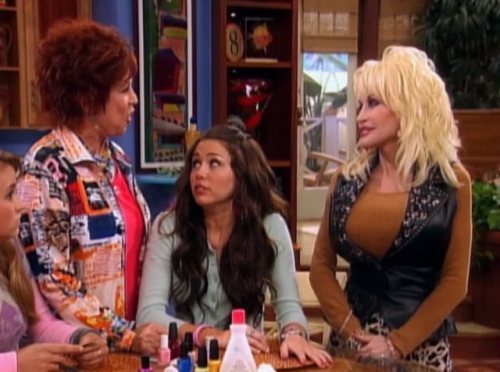
So this seemed like a fun one for me to do! These are two of the most iconic recurring guest stars, so naturally I had to pit them against each other (or, well, pit their episodes against each other). This competition isn’t particularly serious, but it is a nice excuse for me to talk about some of my favorite episodes on the show. Like before, I’m going in reverse-order of how much I liked them, or Worst->Best, so I can save the best for last.
“B-B-B-Bad to the Chrome” (Season Three)
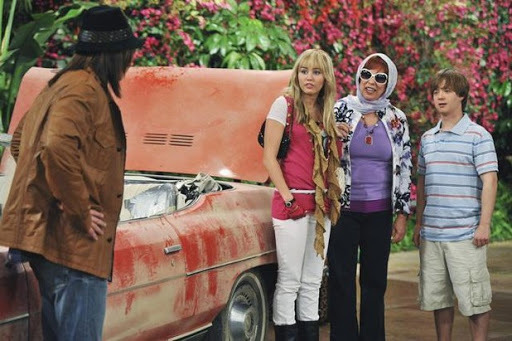
It’s a testament to how awesome Vicki Lawrence is that even in the “worst” episode she’s in, she still brings it and is in many ways the strongest part of it. This one loses out mainly on writing, and me fucking hating the subplot. I’m sorry. “You forgot some really arbitrary timestamp I decided to put on our relationship without telling you, which means you don’t love me” will just never be anything but annoying to me ever, no matter how much I like the couple involved. Honestly, it was shit like that that made me glad I didn’t do a lot of dating in high school.
The main plot is kind of weak too tbh, but I’m still in some ways fond of it, because it’s very clear that it’s all coming from a place of love. They replace her car because they love her, and they try to recreate the old crappy car because they love her, and she pretends not to notice because she loves them right back. The best scenes are the one-on-one interactions between Miley and Mamaw, where you can see how much they understand each other. It was because of those that I almost bumped this up one… but they weren’t quite enough to sell me on this episode. Sorry again.
“You Give Lunch A Bad Name” (Season Three)
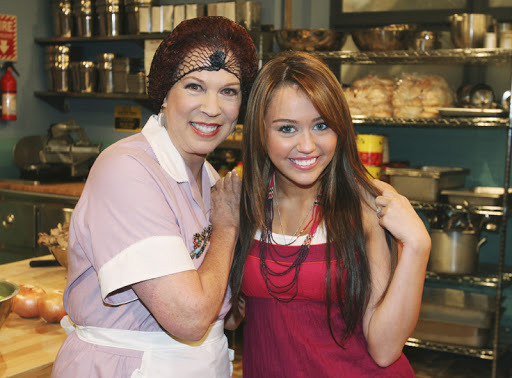
This one, again, not a very strong episode, but there are a few reasons I liked this one just a little bit more. Part of it is I’m a sucker for Miley/Jackson centrics, and they strike such a perfect balance of brother-sister solidarity and sibling rivalry in this: the song in the beginning, the schemes, the mimic fights, them immediately pointing at each other when Mamaw asks them who the “guiltiest grandchild” is. Another part is that weirdly, Lilly and Oliver seem to have more of their natural chemistry in this episode than they do in the one where they’re actually dating. Case in point, their little quiet communication to leave in the middle of the siblings’ bickering without having to say a word to each other.
What’s interesting about this one is, Mamaw isn’t necessarily wrong that the kids are gonna take advantage of their dad being gone. That’s exactly what they’re planning to do. But then she takes it too far and holds on too hard, treating them like they’re 10 rather than 16 and 18 respectively. There’s a classic conflict here of teenagers thinking they’re more mature than they really are, versus their family knowing they’re still kids but treating them like outright children instead of meeting them where they are. And I think it’s harder for her to accept they’re growing up than it is for Robby Ray because she isn’t around very much to see it happening. While she recognizes in the end that they had good reason to be embarrassed, that theme of holding on to how things were because she’s afraid of losing them seems to be a consistent one with her in later seasons.
“I Am Mamaw, Hear Me Roar!” (Season Four)

First off, I just want to say that I think having a Dolly episode and a Mamaw episode after “I’ll Always Remember You,” and right after each other, was a really smart choice, especially the way they did it. Dolly can help her embrace what it’s like to be all-celebrity, all the time, and Mamaw reminds her not to forget her family, and how hard that kind of life can actually be. Not just for Miley, but for the people around her. They just tie really well into that whole, “She’s always had the best of both worlds, but now she’s gotta learn what living without her secret feels like” theme that late stage Season 4 has going for it.
One thing that always strikes me about this episode is how it puts so much of her actions in context, not just in this episode, but retroactively. Of course Robby Ray forgot to visit her when he was younger and his own music career was in full swing. Of course she would panic when the same seems to be happening to Miley, when they can’t take one picture or have one tea without Miley getting hounded by her fans, because she doesn’t have Hannah Montana to hide behind anymore. (Of course, I’m not so sure the timeline adds up there, but I’m gonna let that go because of the point it was trying to make.) Being smacked in the face with Miley’s fame is really a wakeup call for all of them, but that makes Miley’s efforts to make sure Mamaw understands how much she cares all the more sweet.
“Good Golly, Miss Dolly” (Season One)
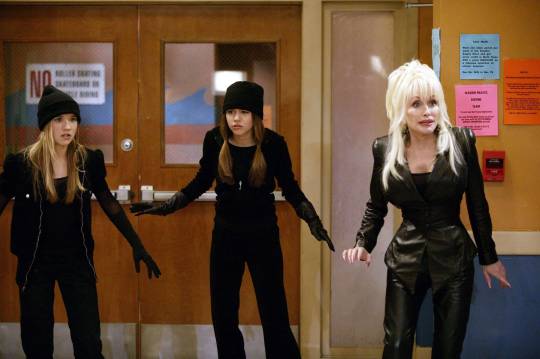
I’d initially put “Kiss It Goodbye” here, but I switched them when I realized I was underrating it— that episode was better than I remembered. But I like this one, too!
This is Dolly’s first appearance and introduction, and she comes in with a bang. The frou-frou, the flowers, and of course, the infamous camera that kickstarts the conflict of the episode. Well, sort of— the real conflict is Miley’s confused feelings for Jake Ryan, torn between “falling all over him,” playing hard to get, and not wanting to give him the satisfaction of seeing her vulnerable. The way it ends up intersecting with Oliver’s subplot of trying to compile a goodbye video for the principal is brilliant, and that sneaking scene? Just amazing.
Of course, this puts her right back where she started, and she ends up regretting it when it’s seemingly too late for her and Jake, but her ripping up the flowers is funny, and then Dolly gets to show off her singing chops a little when she and Robby Ray cheer her up in a really sweet scene. Beyond that, the subplot is… fine. It’s pretty forgettable, but I liked it okay. It’s not frustrating like some of the subplots in previous episodes on this list, but not quite as awesome as…
#3: “Kiss It Goodbye” (Season Four)

And with that, we’ve cracked the top three! This one surprised me upon rewatch. I knew I liked it, I just didn’t know how much I liked it until I saw it again. I think part of it might be me attributing some of my own feelings about Cancel Culture as a whole and how that’s affected us for the worse overall, celebrity or not, as well as some meta-significance to Miley’s career, both at the time and afterwards. But let me get into the episode itself rather than getting on those tangents.
Miley starts off being a little careless with her image… but this is understandable, as she’s used to having her privacy, and living without it’s gonna take some getting used to. Dolly has this legendary entrance in a personalized helicopter, complete with a pink ladder. She uses her own know-how about fame to help Miley navigate the paparazzi, reassures her after a brutal interview with Colin Lassiter, and then encourages both her and Robby Ray to sing with her at her performance. While both of them object at first, Robby Ray eventually gets up the courage to go… which is the push Miley needs to get past her fears and get back on the horse herself.
Beyond the main plotline and overall message that I love, it’s really quotable, and has one of the best subplots this show has ever had. Rico goes practically catatonic because the Stewarts, a family of “idiots” he looks down upon, fooled him, an evil genius with an ego that can’t handle that. I also like that we see Lilly’s compassionate side coming back in this episode in both plotlines, it’s the one thing I felt season 4’s Lilly was lacking overall, and it was fun to see her point her sharp tongue towards herself for once this season. And of course, Jackson enjoying Rico’s suffering, but ultimately being the one to help him out of it was perfect, and bringing back the choir from earlier that season was even better.
#2: “I Will Always Loathe You” (Season Two)
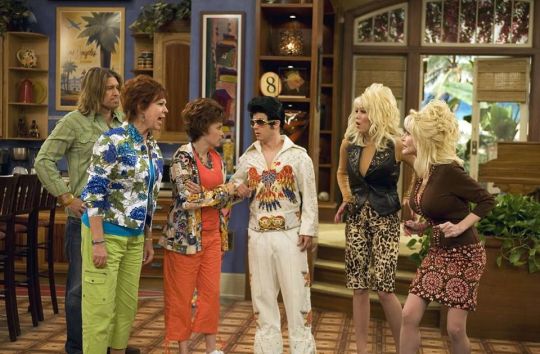
Before anyone gets mad that this wasn’t my #1 pick, let me just say for the record that this episode is AWESOME. Mamaw and Dolly’s rivalry is so explosive and they play off each other so beautifully, and the culmination of that into the “Granny Smackdown” is so well-done. And look, yeah, I know that there were stunt doubles and probably a mannequin or two involved, but I don’t care, it’s a fantastic scene. I love Robby Ray trying to make peace and ending up getting dragged into it, I love Hannah Montana awkwardly trying to salvage the situation, and ultimately breaking them up, and I love Jackson and Lilly scarfing down popcorn and watching the whole thing unfold from home.
If I had to pick which one of these episodes was the funniest, it would be this one, no contest. The subplot here is great too; simple yes, but I think the simplicity works in contrast to just how much is going on in the main plot, and Oliver’s shame at his own involvement in the end? Wonderful. The contrast between the two women picking clothes for Miley’s award show, and the decision to genuinely make up after seeing how much it hurt Miley were executed beautifully too. We don’t get the sense that they’re going to be BFFs, but I do like that the ending scene shows promise, that they’re at least capable of getting along, when they want to. As Miley says, “You’re trying. That is all I’ve ever wanted.”
So yeah, this episode? Amazing. But… not quite my favorite.
#1: “Grandmas Don’t Let Your Babies Grow Up To Play Favorites” (Season One)
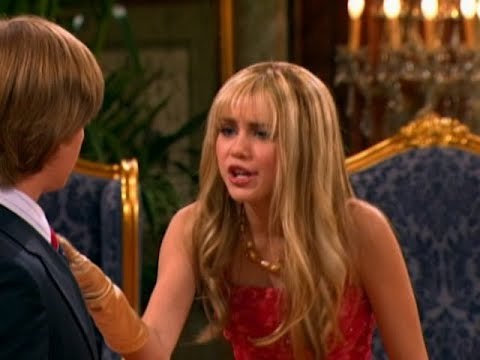
Remember when I said I’m a sucker for Miley/Jackson centrics? Yeah. This episode was probably where all of that began for me. (Also the beginning of my feelings about Jackson going from “oh he’s pretty funny” to “LET ME LOVE YOU,” but I’ll try to keep my stanning to a minimum here.)
We start off with what appears to be a fairly straightforward story. Hannah Montana is meeting the queen. Jackson has a volleyball game. Mamaw’s coming to visit, and she’s critical of Robby Ray, particularly his eating habits, she’s tepidly nice to Miley, but treats her as an afterthought, and she heaps praise and adoration and attention onto Jackson by the bucketload. On the surface, it seems that this is about Mamaw unfairly favoring Jackson over Miley. Right up until this happens:
“She’s gonna insult the queen and ruin my command performance all because of her ‘little Jackson.’ It’s always about you!”
“Me?! Well, it’s never about me! Everything in this family revolves around you!”
One comeback, and the tables are turned. Yes, Mamaw hasn’t treated Hannah Montana getting to sing for the Queen of England with the respect and admiration it deserves. But Robby Ray and Miley haven’t been treating Jackson with the respect and admiration he deserves. When Miley snarks that Mamaw would rather go to Jackson’s volleyball game than her performance, she responds with, “Well, if I don’t, who will? I don’t see either one of you heading for the door.” She doesn’t ignore Miley because she loves her any less. In an ironic turn of events, the reason she ignores Miley isn’t about her at all.
I do like, though, that the episode doesn’t treat this as “two wrongs make a right.” Mamaw still apologizes for making Miley feel “invisible,” like her accomplishments don’t matter, like she doesn’t care. Jackson feeling invisible because his dad and his sister and the whole rest of the world treat him that way, doesn’t excuse Mamaw treating Miley that way. And the fact that all of it’s unintentional, and that the neglect is coming from someone who does, genuinely, love that person, doesn’t erase the harm it causes. This is a lesson for both of them, and Miley comes away with a greater understanding of what her brother goes through.
There is still a part of me that wishes this had gotten elaborated on more in the show? Not that Jackson doesn’t bring up the favoritism issue multiple times afterward, but it’s not treated seriously very often after this, considering how often it comes up. It saddens me to think that, for all the efforts they make in this episode to make sure they’re there for Jackson in the end, Miley and Robby Ray still end up falling into the same patterns with Jackson as the show goes on, and worse. I can’t help but think this pattern of neglect and Jackson’s deterioration into “the family failure” are related, and while I don’t need every single episode to treat it as A Big Deal, the truth is, it is a big deal, and I wish the show had been more consistent in actually taking it seriously.

So that’s my list! In the end, I think we can all agree Mamaw and Dolly are both pretty iconic characters, and made the show all the richer for being on it. I’ve loved getting a chance to look at their episodes again, and make sure to stay tuned for my next Ranked post for this series, where I may be talking about another iconic recurring character on this show…. (Hint: one of these episodes is on that list, too.) Until next time!
#hannah montana#hannah montana analysis#hannah montana episodes#Hannah Montana March Madness#hannah montana ranked#ranked series#mamaw vs. dolly#mamaw ruthie stewart#dolly parton#long post#long under the cut#miley stewart#jackson stewart#lilly truscott#oliver oken#robby ray stewart#rico suave#hannah montana criticism#disney channel criticism#disney criticism#positive and negative
10 notes
·
View notes
Text
Parks and Recreation: The actual enneagram types of Leslie, Ron, Tom, April, Andy, Donna, Ben, Chris, and Jerry

The Protagonist: Leslie Knope [Type 3]

“I am big enough to admit that I am often inspired by myself.”
Enneagram Wing: 3w2 (Achiever along with a helper)
"I care. I care a lot. It's kinda my thing."
Core Fear: Being exposed as or thought incompetent, inefficient, or worthless; failing to be or appear successful
Core Desire: Having high status and respect, being admired, successful, and valuable
Leslie feels her purpose is to make the world a better place, specifically Pawnee, since this is the place she holds dear to her heart and is the most reachable for her. Her identity is defined by her work and her drive and passion are what allow her to continue to move up the latter. She takes rejection and set backs hard, however, she always gets back up and continues to move forward to reach her goals. Her influence shapes the hearts and minds of her coworkers. She inspires them to be better people and to find what they are meant to do in life and do it. Along with her go-getter attitude, she goes above and beyond for her friends (2) and they greatly appreciate her care and efforts. As for her childhood wound, she has described her mother as cold and withholding so we can only assume that she received praise and attention only from the achievements she made. Her mother also works in government and only respects those with an assertive and dominant presence.
The Sensible Friend: Ann Perkins [Type 6]

“As Leslie’s maid of honor, I really need her bachelorette party to go well, which is why I’m stress eating gummy penises.”
Enneagram wing: 6w7 (Loyalist along with an enthusiast)
“I’m putting myself out there, meeting some new people, having some causal fun, and it’s awkward.”
Core Fear: Fearing fear itself, being without support, security, or guidance; being blamed, targeted, alone, or physically abandoned
Core Desire: Having security, guidance, and support
Ann is by far the most sensible character. She is the person everyone knows they can rely on. Andy unfortunately took advantage of this quality resulting in her becoming his caretaker rather than remaining an equal. Leslie appreciates her sensibility and this is what makes them such great friends. However, Leslie can trigger Ann’s already existing anxiety from her high expectations and good intentioned pushy behavior. Another side of the coin of is her fear of ending up alone. She is constantly dating and even settles a few times to avoid loneliness. It is when she takes the time to be single and soothes this fear that she and Chris end up together. Ann also has an adventurous streak. She likes to go out and have a good time. She just sometimes needs a little push from Chris, Leslie, or Donna.
The True Introvert: Ron Swanson [Type 5]

“That is a canvas sheet, the most versatile object known to man. It can be used to make tents, backpacks, shoes, stretchers, sails, tarpaulins, and I suppose, in the most dire of circumstances, it can be a surface on which to make art.”
Enneagram wing: 5w4|5w6 (Balanced)
“Don’t start chasing applause and acclaim. That way lies madness.”
Core Fear: Being annihilated, invaded, or not existing; being thought incapable or ignorant; having obligations placed upon you or your energy being completely depleted
Core Desire: Being capable and competent
Ron is an intellect, constantly going off on philosophical tangents about the corrupt ways of government, effective life hacks, and flawed human nature. He believes there is only one way to do things and his ways of going about things are very unique to himself (4). He is a non-conformist. He loves learning new things and adding to his craft. He is a breakfast and wood enthusiast. Ron is quite guarded and withdrawn from the world and prefers this. His childhood wound is that his mother was intrusive and over-controlling so we can assume he felt exposed and defenseless. This followed Ron in adulthood as he had many toxic relationships with women similar to her. Thus, Ron feels he is best served to live in isolation and fend for himself, as well as, rely on cerebral means rather than emotional means. Ron demonstrates his wing 6 with his desire to be safe and have security.
The Entrepreneur: Tom Haverford [Type 3]
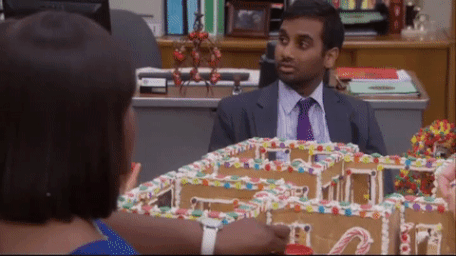
“At the risk bragging, one of the things I’m best at is riding coattails. Behind every successful man is me, smiling and taking partial credit.
Enneagram wing: 3w4 (Achiever along with an individualist)
“‘Zerts’ are what I call desserts. ‘Trée-trées’ are entrées. I call sandwiches ‘sammies,’ ‘sandoozles,’ or ‘Adam Sandlers.’ Air conditioners are ‘cool blasterz’ with a ‘z’ — I don’t know where that came from. I call cakes ‘big ol’ cookies.’ I call noodles ‘long-ass rice.’ Fried chicken is ‘fry-fry chicky-chick.’ Chicken parm is ‘chicky-chicky-parm-parm.’ Chicken cacciatore? ‘Chicky-cacc.’ I call eggs ‘pre-birds,’ or ‘future birds.’ Root beer is ‘super water.’ Tortillas are ‘bean blankets.’ And I call forks ‘food rakes.’”
Core Fear: Being exposed as or thought incompetent, inefficient, or worthless; failing to be or appear successful
Core Desire: Having high status and respect, being admired, successful, and valuable
Tom measures his entire worth from his successes and failures. He is extremely creative and is constantly coming up with unique ideas to form a successful business.
The Misanthrope: April Ludgate [Type 4]
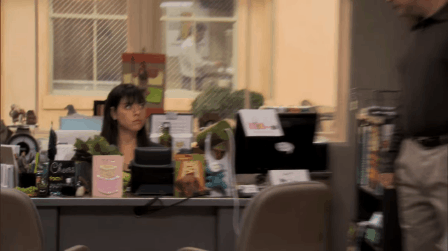
“I wasn’t listening but I strongly disagree.”
Enneagram wing: 4w5 (Individualist along with investigator)
“If you ever speak me to me in Spanish please use the formal “usted”.
Core Fear: Being inadequate, emotionally cut off, plain, mundane, defective, flawed, or insignificant
Core Desire: Being unique, special, and authentic
April portrays major apathy but it’s clearly done to hide her genuine care and insecurity. She wants to be unique and special, thus overdoing it with her quirky, odd, eccentric, nonconformist talk and lifestyle. Her speech and way of behaving is an oxymoron. She deep down wants what everyone else wants: real love, real friendship, and a successful career. As she grows up and matures, she moves further away from her exaggerated dark persona to a normal expressive, mature adult. However, she adds in whatever she needs to to maintain her individuality. April also values cerebral pursuits shown in her getting accepted to an exceptional veterinary school. Her wing 5 is what helps her identify with so much with Ron.
The Charming Goofball: Andy Dwyer [Type 9]
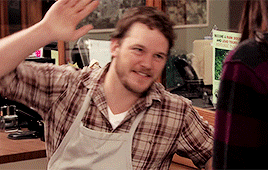
“It’s fine. It’s just that life is pointless and nothing matters and I’m always tired.”
Enneagram wing: 9w8 (Peacemaker along with the challenger)
“I’m not crying. I’m just allergic to jerks!”
Core Fear: Being in conflict, tension, or discord; feeling shut out and overlooked; losing connection and relationship with others
Core Desire: Having inner stability and peace of mind
The epitome of Andy’s character is his easy-going nature. He is also very caring and thoughtful. He rarely ever voices if anything is bothering him and we see him go through great lengths to end any conflict between he and April. He attempts to make things right with Ann after their break up but doesn’t succeed. Andy possess a child-like mindset and view of the world and this is what seems to serve as a coping skill for the trials and tribulations of life. This also makes him endearing and what makes him perfect for April as she holds a similar mentality.
The Nerd: Ben Wyatt [Type 1]
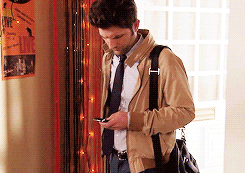
“I don’t even have time to tell you how wrong you are. Actually, it’s going to bug me if I don’t.”
Enneagram wing: 1w9 (Reformer along with peacemaker)
“Stick to the list and you’ll do great. I have total faith in you... (there’s like a 30% chance they’ll both die.)”
Core Fear: Being wrong, bad, evil, inappropriate, unredeemable, or corruptible
Core Desire: Having integrity, being good, balanced, accurate, virtuous, and right
Ben is straightforward and willing to tell the truth, even if it could offend someone. He likes things to be in order. He often feels like the odd one out in the parks department because he values principles and professionalism while his colleagues behave inappropriately. He admires Leslie for her quirky professionalism. Ben also desires a peaceful environment and will keep quiet about things bothering him resulting in passive aggressive behavior.
The Optimist: Chris Traeger [Type 7]

“The world is my gymnasium, Ron.”
Enneagram wing: 7w6 (Enthusiast along with loyalist)
“I am 100% certain that I am 0% sure of what I’m going to do.”
Core Fear: Being deprived, trapped in emotional pain, limited, or bored; missing out on something fun
Core Desire: Being happy, fully satisfied, and content
Chris is extremely positive all the time to cover up his true inner turmoil. He had a tough childhood and coped with the trauma by avoiding the negative emotions and putting his focus on his health. Thus he became a health nut. In the field of clinical psychology, he would most likely be diagnosed with orthorexia. Chris has a lot of anxiety about life and desires to feel a sense of safety in his life and relationships, thus making him fall into the wing 6. He desires the guidance and support from others (he started seeing a counselor 5 times a week during his depressive episode).
The Minx: Donna Meagle [Type 8]
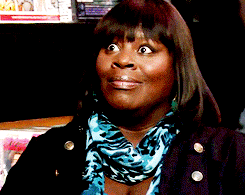
“You better watch yourself.”
Enneagram wing: 8w7 (Challenger along with enthusiast)
“Treat yourself.”
Core Fear: Being weak, powerless, harmed, controlled, vulnerable, manipulated, and left at the mercy of injustice
Core Desire: Protecting yourself and those in your inner circle
Donna is the epitome of “an independent black woman who don’t need no man.” She essentially dos onto others what she fears they will do onto her. Thus, she manipulates and abuses vulnerable men to get what she wants and then leaves them. We can assume that something happened in her childhood that resulted in this relationship pattern. She discusses her grandma dying while having a threesome so this behavior was certainly model for her. She falls on the 7 wing for her enjoyment of life's greatest pleasures.
The Target: Jerry Gergich [Type 9]
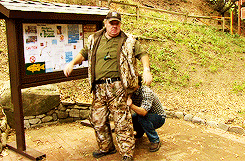
“So I go by Terry now. They already had a Larry in the Parks department, and they suggested that they change my name to Terry. I told them my real name was Garry, and they said ‘who cares?’ What a fun bunch of guys.”
Enneagram wing: 9w1 (Peacemaker along with reformer)
“Well, you know it's like I always say 'it ain't government work if you don't have to do it twice.”
Core Fear: Being in conflict, tension, or discord; feeling shut out and overlooked; losing connection and relationship with others
Core Desire: Having inner stability and peace of mind
Jerry is clearly a peacemaker in that he keeps his mouth shut despite his constant abuse from his colleagues at the parks department. He identifies with Andy in that Tom was trying to dub him as the new office target due to his similar easygoing nature and clumsiness. He shows that he is a wing 1 in his values of goodness and morality.
#parcs and rec#enneatypes#enneagram 3#enneagram 4#enneagram 1#enneagram 5#enneagram 6#enneagram 7#enneagram 8#enneagram 9#enneagram types#1w9#3w2#3w4#4w5#5w4#5w6#6w7#7w6#8w7#9w8#9w1#parks and recreation#leslie knope#ron swanson#ann perkins#ben wyatt#andy dwyer#april ludgate#tom haverford
95 notes
·
View notes
Text
Mentally, I was like, someone write me a fic where Bruce didn’t become Batman, he became a doctor like his father instead. He still meets all the Batkids, but just under different circumstances. I am not qualified to write doctor things, but I got to thinking about what said circumstances might be, and I didn’t want it all to just be, kid got a broken limb must go to the hosital, gets treated by Bruce ~boring~
So, I’m doing this thing this week, where I’m trying to practice writing every day, and to make it even more challenging because I hate my face, I also decided I would double my word count from the previous day’s...every day. The problem with this, is that I’m really bad at short stories, and also really bad at having ideas. Especially, apparently, for original writing. So I’ve fallen back into writing some old fanfic ideas. Except for today, when I had the above mentioned *new* fanfic idea.
Disclaimer: I am not a doctor or psychiatrist and should not be writing doctor or psychiatrist characters. I am also not ten years old, and have not been ten for over a decade, and contrary to popular belief, working with ten year olds, has not prepared me to accurately portray ten year olds in fiction. Don’t judge me too harshly. I’ve mentally developed an entire back-story for Bruce, but details may be fuzzy in the actual piece. I reached the word count goal even though the story is not finished. In my head, I’m imagining one chapter per batkid’s first encounter with Bruce, but this encounter is not even over yet. It’s 4am and I should be sleeping. Will I be adding more to this? Potentially, though I’m sure it will be wildly inaccurate medically speaking, so everyone just be prepared for that. If I *do* add more to it, I’ll probably post it to AO3 rather than here. If I can come up with a title.
[I know I haven’t been on tumblr in literal Years, but didn’t there used to be the option of adding a line between paragraphs? did I dream that? is it still there? am I not seeing it? wot]
Bruce entered the room somewhat hesitantly. Richard Grayson was already seated in the armchair. He sat upright, with his hands clasped in his lap, literally twiddling his thumbs. He looked up, visibly swallowing, eyes wide as saucers, when Bruce came in.
Bruce smiled as disarmingly as he could. He cleared his throat, shutting the door tightly and crossing the floor, intensely aware of Richard’s eyes on him. The boy watched him sit down on the couch opposite, but waited no longer for Bruce to either collect himself or start the conversation. He shifted in his seat, leaning forward; demanding Bruce’s full attention. “They said I have to talk to you,” he started, shaking his head slightly. “But I don’t really need to – I’m fine.” He nodded once, firmly. “Honest.”
Bruce’s smile had slipped, a pensive expression replacing it as he eyed the child. He was nearly tempted to lean back in his seat, put a hand to his chin and squint intently at the ten year old as though he were an x-ray or a test result in need of careful examination. Bruce caught himself at the thought. It wouldn’t do. At best, he’d scare off the boy, at worse, Richard would think he wasn’t taking him seriously, and he didn’t want to be there any more than Richard supposedly did. ‘Supposedly,’ because, Bruce suspected, the boy very much wanted to speak to someone, he just didn’t know who to speak to. As far as Richard was concerned, he had no family left. The adults presently in his life were there by necessity, as the law dictated, and not because they cared for him or wanted to help him (even if some of them did). He did not trust them and could not make himself vulnerable in front of them by confiding his true feelings, or letting this carefully cultivated mask, slip.
Bruce had done much the same thing after—
His parents.
Only, he’d had Alfred, in addition. The mask was easy to slip on when he needed to go to school or return to a life of functions and public appearances. He still wore it even now, decades later; for work, social functions, interviews—the list went on. It was nearly without burden to wear, because, it could always come off. Richard, however, did not have an ‘Alfred’ or a home, anymore, where he could remove the mask and be himself for a little while without fearing the scrutiny of others, or his own frailty.
“Hm.” Bruce took a moment to shift into a more comfortable position, and gather his thoughts in the process. He hadn’t needed to be a psychiatrist in such a long time that he doubted for a moment where to begin in approaching this situation. “That’s good,” he said agreeably. “I was asked to speak with you, because Miss Lance is concerned about your well-being.”
“Well, she doesn’t need to be,” Richard replied, his movements still indicative of nervousness, but…also impatience. “Like I said, I’m fine. So I don’t need to be here. Sorry for wasting your time.” He looked about ready to jump out of his seat and bolt from the room, but…not, Bruce thought, because he was afraid of the conversation. He didn’t want to be confronted with his feelings, but, there was more to his eagerness to leave.
“It’s only an hour,” Bruce dismissed. “And, Miss Lance is a good friend I don’t mind doing a favour for. Not to mention, she cares very deeply for the children under her charge. You’re lucky to have her.”
Richard’s shoulders seemed to drop slightly. He huffed with impatience, but responded as meekly as he had been, “Yeah. She’s been real nice.” He paused briefly, before continuing more keenly, as though a new approach had made itself known to him in the moment. “Which is why I don’t want to be wasting her time. I should go.”
“I’m afraid you can’t,” Bruce said mildly. “Miss Lance had another appointment; she had to leave. She’ll be back when our hour is up.” Bruce smiled at the boy, whose timid demeanor had slowly crumbled into one of barely concealed annoyance.
“I’ll just wait for her downstairs, then,” Richard said, holding Bruce’s gaze with a much steadier look than when Bruce had arrived.
Bruce kept his smile as serene as possible, “That’s not how it works, Richard,” he said gently.
“Dick.”
Bruce recoiled, not having expected such a candid delivery of something so inappropriate. “Excuse me?” he asked, much more sternly than he’d spoken thus far.
It was Richard’s turn to look taken aback. “I mean – me – it’s, I’m—er—” he fumbled, flustered, and looked away as he cleared his throat to answer properly, “That’s just, what people call me. It’s ‘Dick,’ not…‘Richard.’”
“Ah,” Bruce said, enlightened. “I see. Miss Lance didn’t mention…”
“She insists on calling me ‘Richard,’” he said, crossing his arms, posture slumping.
“Well, if you insist,” Bruce said. “I’ll call you ‘Dick.’”
Dick glanced at him; nodded. “Okay.”
“Until Miss Lance gets back, you and I may as well chat a little,” Bruce continued. “To pass the time.”
Dick sighed, resigned to his fate, apparently. He leaned back in the armchair, eyes on the wall. “Sure.”
“Miss Lance has been treating you well?” Bruce began.
Dick eyed him, and nodded.
“The other staff…caretakers at the orphanage,” Bruce continued slowly. “They’ve taken good care of you?”
Dick nodded again, shrugging with one shoulder. “Yeah, sure. I…have a bed, and food. It’s fine.”
“What about the other boys? Have you made any friends yet?”
Dick frowned at the floor, his crossed arms pressing tighter to his chest, “They’re fine,” he lied.
“Hm,” Bruce was frowning himself, his thoughts already turning toward how he might confront Miss Lance and the orphanage Director – about visiting the institution, perhaps, so as to observe Dick’s social circumstances firsthand before stepping any further— Absently, Bruce shook his head free of the thought. He was getting carried away again. “I…” he began, in an effort to get himself back on track, but he didn’t actually know what to say even as he started speaking. He looked over at Dick, the boy watching him with a guarded, squint-eyed expression. “I’m sorry,” Bruce said. “I was just thinking of…” He shifted, and started over, “I used to speak to children all the time. It was my job. Children like you and I, sometimes,” he gestured between them, allowing himself to be as honest as possible. “Who…lost their families without warning, without…being able to do anything about it—”
“I didn’t lose my family,” Dick cut in, the young boy’s tone almost…scathing. Bruce had meant to steer the conversation into a specific direction, meaning to coax Dick into confiding in him the specifics of his relationships with the other boys at the orphanage, but, Dick had derailed his entire scheme with this interruption. “We weren’t in a crowd and I let go of their hands and couldn’t see them anymore.” Bruce’s head was clearer than it had been when he’d started on his tangent. Though thoughts of his own parents, his own loss, crept at the fringes of his mind, they were kept at bay by the need to listen to this young boy, whose loss was much more present, much more potent and all-consuming, even as he claimed fineness.
“Then?” Bruce prodded, when Dick’s gaze shifted from him almost abruptly, and affixed once more to the wall instead. As though the mask had shifted to reveal some bare skin for a moment, and the boy was determined to cover it once more as though nothing had happened. “What do you call it?” Bruce paused for a reply, but added, when none was immediately forthcoming, “What happened to your family, Dick?”
The boy pulled his legs up toward his chest, shoes on the seat cushion. He sunk impossibly lower into the chair. “They…” he began quietly, just when Bruce assumed there’d be no answer after all, “Were taken from me.”
“Hm,” Bruce said, which prompted Dick’s gaze back toward him.
“You don’t believe me either,” the boy accused with a glare.
“That’s not what I said,” Bruce replied quickly. “I’m only wondering what exactly you mean by that. ‘Taken’ from you? Your parents fall, Dick,” he said gently, “Was an accident.”
Dick clicked his tongue and looked resentfully away again, “No. It wasn’t.”
He said no more, and, for a moment, Bruce allowed the silence to linger. “If this is true, Dick…what you’re suggesting is – your parents were murdered.” Dick made no reply and didn’t look over to Bruce either. The boy was keeping his guard up. This was the moment, Bruce thought. This was the way to win Dick’s confidence and trust. Every adult he’d confided in with this belief had rejected him. Ascribed his suspicions to the insurmountable grief of a small child not mature enough to navigate it sensibly, thereby desperately needing an explanation that made his parents death seem less random, leading him to invent a fantasy with a villain some hero could fight against as in a cartoon or comic book, to help him cope. An all-consuming idea he’d started to believe in so passionately, the reality was no longer a palpable option for him and anyone who could not agree, was not on his side.
This is why Miss Lance had wanted Bruce to see Dick. This was the trouble he was having. Why he wasn’t allowing himself to be supported by the new people in his life. Why he refused to adjust to his present circumstances. His parents’ death had gone unavenged. He believed there was justice to be paid, but no one would pay it.
Bruce…could relate.
#Bruce Wayne#Dick Grayson#medical AU?#so Bruce becomes a psychiatrist kind of doctor#lol#a child psychiatrist#but he becomes too involved#in an over-caring kind of way#and it's unhealthy for him so he makes the decision to switch careers#and becomes a medical doctor instead#but he's friends with miss lance the social worker#and she still refers some people to him occasionally because he is just the Best#miss lance is not meant to be dinah lance; it was just the only surname I could think of at such short notice#(is this a new idea? why do I feel like I've had this idea before...)
9 notes
·
View notes
Note
im not that familiar with treatsforbeats i watched like. a few videos but other than that i know nothing! but i would be glad to hear you info dump!
there is SO MUCH..... im gonna put a read more below because this turned out to be way longer than i expected. but you asked for me to infodump so here goes
okay so. treatsforbeasts, i dont know what the whole meaning behind the channel is. i cant specifically say what the goal of the channel’s content is because its all in my interpretation. but i do know that there are meanings behind each video as silly as it may seem and im just gonna list them off here (note that not all videos will be included since i may not be able to interpret every one, also this is going from earliest to most recent)
1. men with small hands carry very little treats to give to little girls with the sharpest little teethinterpretation of this video is csa/child sex trafficking. “little treats” refers to pills or some form of drug (small, makes u trip). however the “sharpest little teeth” could represent the little girl fighting back.
2. mom ordered ants for my birthdaychild abuse. mother forces son to watch and/or possibly engage in inappropriate activity with her husband.
3. i love jesusobviously a dark parody of christianity/catholicism. shows how blindly some fanatical christians/catholics will follow their beliefs, to the point where they no longer truly “follow” it as theyve warped the message to fit their own morbid desires (using christianity/the bible to excuse hatred and judgment upon others).
4. i me you love godanother dark parody of christianity/catholicism. i believe it mocks how fanatical christians/catholics focus only on the negative aspects of the bible instead of learning the true messages, as many of the words used are from the bible and are negative words.
5. behdsPROBABLY just a silly video but, i think it represents how people let negativity embed itself into their lives and complain about it even though it’s so easy to just let go of it.
6. jaffreymocking some sitcoms for how dumb and repetitive they can be.
7. kiss papa’s mustachepossibly child abuse, again.
8. storytimereferences/implies child abuse. storytime is also the name of one of treatsforbeasts’ songs on his Sanguinarius - Sin Nomine album.
9. hymns for him (1 + 2)just total parody albums of christian rock. vocals make you feel like youre dying but its actually kinda good to listen to in some parts
10. i screaming inside my headRoii (the character)’s first appearance. also probably symbolizes how depressing some kinds of music are
11. felines have nine livesnot sure but i feel like this is a warrior cats reference, in complete and total honesty (dont watch it if you dont like c/at d/eath though, its fictional but. yeah)
12. beastsreflection of society as a whole
then there’s. the two short films and sin nomine. so i’m gonna delve into that now and be warned, it’s fuckin long
treatsforbeasts is the self-titled short film and the first longest video on the treatsforbeasts channel. basically what i get from this is that treatsforbeasts, the channel itself, symbolizes an actual channel that chauncy (the child character in the short film, who is portrayed as a literal oral fleshlight with a body) watches. he consumes these concepts, such as internalizing misogyny (claw-paw skit), toxic masculinity (can i like balloons skit) and being exposed to a normalization of christianity (heaven and hell skit). there’s also a skit in which a spider binge eats and then proceeds to throw it up, which chauncy actually mimicks when his father brings him food.his father very much disapproves of these messages being shown on tv. he tells chauncy in regards to the claw-paw skit, when chauncy belittles the female character, “that’s not very nice, now is it”, and says “you can like ballons, you can love balloons if you want to”. his father goes on long tangents about how many institutions have normalized and inherited the concepts of christianity, and that it is one of the contributing factors of violence in the world. he references colonization, the holocaust, and in general mentions minorities.we learn that the father actually ended up being a father to chauncy in the first place due to (nsfw tw) masturbating in a sock to a picture of robert smith, and 9 months later chauncy was born. so technically there is no mother. the father talks about the meaning of life, and how everyone on the inside is a little bit of a freak, but there’s only two real ways you can accept that: 1) realize that your freakishness gives you a special lense through with you see the world and aid it in the ways the sane and happy ones probably cant, and 2) realize that real way number 1 is just lying to itself and that youre still a somewhat integral part of the lives of those you care for so deeply. he says that choosing which way to live really reverts back to the meaning of life, that you cannot live day by day believing there’s no reason to. “but whatever reason you give yourself to live, [...] you do it, because it is correct to live.”
sin nomine comes after the first short film, but i’ll delve into that after because really it touches on many many of the points and interpretations here.
the second short film, the beast is dead, was released just this year on valentines day! i think the main focus of the short film ranges from relationships to just once again a mockery of christianity/catholicism. once again it starts off with a father and his son. there is no mother figure present though she’s said to have left, due to the father watching too much “birdies”, a show, which i think is a metaphor for porn addiction. the father is implied to being prone to neglecting the son’s wants and not really caring for him, being disappointed in him, etc. etc..something important about the beast is dead is that it uses masks to portray those who are “followers” and those who are not. the father, interestingly enough, does not wear a mask. he seems to acknowledge what his son is saying when he goes on philosophical rants as well, but disregards them as nonsense and ends up leaving after bonking him with the stupid spike (metaphor for how parents will shut their children up by giving them a phone or toy to play with).the three other characters who don’t use masks in the beast is dead are Roii, Tom, and Doctor Zoughth (pronounced Zoth). Roii makes a comeback, finally! but this time he’s singing a song called “i love the sound of screaming babies”. it symbolizes how men will impregnate women and then run off, whether or not because they fantasize about pregnant women. it could also be a want of seeing a hurt child (hence the line “i know that all of you watching must think i’m insane, for loving when something so innocent is in so much pain”).however another interesting factor is that, the characters who don’t have masks, aside from Tom and the father, have red eyes at some point. this is a metaphor for how they’ve lost their humanity. Roii, at some point in the music video scene, only has one red eye whereas his other is normal. this hints at how part of him has lost his humanity while the other is still in tact.the other character that has red eyes is Dr Zoughth, but instead of him having only one red eye, both his eyes are red. this doesnt show until later though when he’s taken Tom away from the masked characters (followers). Dr Zoughth is very much self-aware. he is not blind, but simply has lost his humanity. Tom tries to reach out to him, to get him to think differently, that maybe resorting to coping with emotional struggles by worshipping something simple like flesh or something more higher than himself and forgetting his own mortality isn’t the healthiest way to live. but Dr Zoughth, having been long gone already, does not accept this and executes Tom.his own personal disciples grow tired of his tyranny and kill him and perform a ritual of some kind, disposing of his body (in the river i think, not sure). this entire ending of the film is basically the title, the beast is dead. but, i believe the beast is not dead, personally, because someone like Zoughth will always live on in other people, other beasts.there’s also a scene called grandma hespar and i think it implies how little people focus on sexual abuse towards men (when it’s from women).
anyways, with that being said, it’s time for sin nomine.
so now that i’ve explained pretty much all of treatsforbeasts to you, and whoever else is reading, it’s clear that the person behind this has issues with christianity (or catholicism), and child abuse. the person behind treatsforbeasts is Jordan Diniz, as he is also the person behind sanguinarius.
sin nomine is a very personal reflection of jordan’s life from what i gather. it depicts his struggles with how he views the world around him, whether that be due to personal experiences or not. at first i interpreted most of sin nomine to be the story of someone who is lgbt, but with jordan himself coming to me and telling me he is straight (POLITELY), it’s clear that is not the case.
so it most likely has to do with trauma. either religious or not, or both. it even says in the song storytime (remember i mentioned it earlier?), “fast hand, white hot trauma, reverberates inside the skull. innocence and intellect raped, reveals a view of a darker world. flesh on flesh, the bonds of affection - confused for the bonds of submission and fear. self-hatred and mistrust repel all beauty that comes near.” i don’t like to say that this solidifies a personal experience, but it’s highly possible.
a lot of sin nomine kind of goes over the same points in different ways, but it makes you think. i definitely feel like something happened to jordan at some point in his life but that is his story and it’s not my place to truly tell, since i don’t know him personally.
there’s also the other channel, adrianturcher. it has videos with seemingly no real purpose except for there being two videos with the same names of two songs on sin nomine, “nex memoria” and “a fetish for psychos”. nex memoria is just a compilation of clips that seem to symbolize the process of death (nex memoria is a latin phrase which very roughly translates to “memory’s death”). a fetish for psychos is a bunch of old clips from parties and shows that possibly jordan himself attended. they’re from 2002 judging by the date in the video. the lyrics in the song “a fetish for psychos” also seem to hint at these events, so it’s possibly that it’s like looking back on happy memories that make you feel sad instead or something. the song also might possibly reference a mother at the beginning.
sanguinarius also has its own channel simply called sanguinarius. there’s the music video for divine comedy (one of the songs on sin nomine) and a cover of because you’re young by david bowie, posted on his birthday a year after his death.
anyway, that’s. pretty much all i have to say. jordan diniz is a fuckin’ mastermind, he’s really good and cool and he’s very kind from my experience talking with him a couple times. he supports the gays as well!
sooooo, treatsforbeasts does have some very creepy/unsettling moments in its content but its EXTREMELY good and i recommend getting into it if you can. 100/10
11 notes
·
View notes
Text
On Account of Her Womanhood
I started this post over two months ago with the hope that it would help me work through my iffy feelings on Fire and Blood, namely how much I dislike the way many of the female characters are written in this book and how it repeats and expands on some unsavory elements of GRRM’s narrative that have been broadly noted in fandom across multiple books. But a closer look only increased my frustration with this book for how it underlined several of Martin’s problematic patterns when it comes to writing women but in a more condensed form this time, perhaps due to the nature of the medium. The history book form of F&B focuses these recurring problems and offers little to offset or challenge them that the authorial issue of casual and uncritical misogynistic writing feels more pervasive. It may be that Martin tried to address at least one aspect that’s been criticized before, but I remain disquieted with how he largely traded one issue for another.
Whatever the case, I think that a writer of Martin’s caliber and with his affinity for interrogating and examining traditional genre tropes can and should do better than this uncritical use of misogynistic writing that he not only leaves to stand unchallenged, but actively leans into. In this depressingly long post, I’ll address some of the problems that jumped out at me while reading. Feel free to add any I may have overlooked.
Objectification and the categorical sexualization of female bodies:
One of the most noticeable trends I found in F&B is how distinctly different it treats male and female bodies. While there may be plenty of overlapping, there is a decidedly heavier focus on sex in women’s stories. Too many stories witnesses a woman’s ultimate fate incorporate a sexual component, often violent and/or fatal, that is if the story isn’t completely built on sexual appetites or escapades. Fire and Blood dives into the personal lives of its characters far more than its cousin The World of Ice and Fire, and that has translated to a lot of sex. That is not inherently a bad thing, but F&B is also notably heavier on female characters so it’s really conspicuous that the number of women goes up in direct proportion to the increase in cases of sexualization and sex stories.
To put it mildly, women’s stories are drenched in sex, to the point where I’ve compiled a list in my initial notes under the title “Gyladyn is a Pervert” due to the sheer amount of unsolicited, unnecessary and disturbingly detailed accounts of women’s sexual experiences. You’d be hard pressed to go one chapter without focus being given to minute details of women’s sex lives which sometimes spans whole pages of the text. It’s primarily the women who get framed through a sexual lens in this book, especially in instances where the female characters don’t even get a story that is not based on their sexual history. Sexuality is not just one aspect of a woman’s personality like it is for the men, it is the core of her entire characterization. Far too many Targaryen ladies get that treatment, along with a myriad of other women. I chose some examples to discuss, but they are but a drop in the total number of characters receiving that treatment.
Coryanne Wylde
Lady Coryanne’s story is the most infamous examples of a gratuitous sex tale that doesn’t serve any real purpose in the narrative, but not only does it occupy way too much space in Gyldayn’s writing, he goes on to describe in excruciating detail the violation and abuse of a young girl while consistently blaming her for it. For all that Gyldayn keeps saying that we need not concern ourselves with the sordid details of A Caution For Young Girls, we get to hear quite a lot about Coryanne’s sexual history.
Coryanne’s entire narrative derives from sex. She gets no other story and no other characterization. Her voice and actions are filtered through the opinions and assumptions of various maesters. Her body is presented as an object for more powerful and/or older men to use and abuse, and the one spin of her story that affords her some figment of agency (i.e, the take that Coryanne taught Jaehaerys how to have sex because she became fond of him and Alysanne) deliberately minimizes how dysfunctional her entire situation is and neglects to reflect her real age and experiences by casting her as someone with more carnal knowledge and the ability to teach Jaehaerys about sex. Keep in mind that Coryanne’s so-called sexual "knowledge” has been exclusively through rape.
I read to what amounts to one quarter of a chapter about Coryanne Wylde but I still have no idea who this girl was. What I do know is way too much information about her sexual history and the men who took advantage of her.
Rhaena Targaryen
Rhaena is luckier than Coryanne in the sense that her characterization doesn’t derive solely from her sexuality and her story is more nuanced and layered. However, not only does Rhaena’s sexuality remain the underlying factor in her narrative, it’s kinda absurd how the narrative ties itself into knots trying to justify the inclusion of rumors about how Rhaena lost her virginity to a lowborn lover whose identity is debated, even though the information presented thus far by the in-universe author contradicts the very premise of those rumors or even the reasoning presented as the cause for discussing those rumors. The whispers of Rhaena’s so-called affair is preceded by rather strong hints of Rhaena’s preference of women; though that does not necessarily preclude the possibility of her liking men too as her reported affection for her brother Aegon suggests, it’s that affection and the note about how Rhaena and Aegon grew up expecting and welcoming their eventual nuptials that makes Rhaena’s supposed loss of virginity to a random guy all the more weird. Too, it’s been noted previously that Rhaena neither encouraged nor entertained any of her many suitors and instead preferred the company of her siblings, dragon and her latest favorite Alayne Royce. So for rumors to exist about her having a raunchy affair with some lowborn guy she met while dragonriding is not only random but baseless. Where did these rumors come from if there is nothing in Rhaena’s history to either trigger or support them?
The reasoning the narrative gives us for those rumors is to explain Rhaena and Aegon’s marriage, since Aenys was supposedly driven to marry Rhaena off as soon as possible in light of these rumors. However, reports of Rhaena and Aegon’s closeness and their expectation to wed, as well as the Targaryen incestuous tradition more than explains the match and Aenys’ decision, especially since Rhaena and Aegon were well-within the normal age for marriage in Westeros. There is nothing weird about this match that warrants an obscure affair to explain. Which only serves to illustrate the oddity of this unsolicited commentary on Rhaena’s virginity. Those rumors stand as a random tangent about a subject that no one should care about in the context of the story. Who cares whether Rhaena was a virgin or not when she married Aegon? What possible effect did her virginity or possible lack thereof have on the narrative for it to be included? The way this story is handled, Rhaena’s sexual agency is there to serve as a matter of intrigue, speculation and scandal when there is no fathomable reason for that to happen, not to mention that it makes Rhaena’s dynastic role as the expected future queen dependent on the expression of her sexuality.
Alyssa Targaryen
Full disclosure: I hate how Jaehaerys and Alysanne’s daughters are written and how sex is the make of their stories. That’s the case for five of the seven daughters they had, and it is infuriating. Is this the best you could come up with for the daughters of the best Targaryen queen Westeros has seen, GRRM? Sex, dead (Daenerys), septa (Maegelle who is clever and reconciled her parents, that’s mostly it) and barely mentioned (if you count Jocelyn Baratheon) are the only options?
The characterization of Princess Alyssa starts off promising enough with information about her personality, her unladylike interests and her closeness to her brother Baelon, but quickly devolves to be solely about sex. We literally do not hear one word from Alyssa’s mouth that is not about sex. Her story is a tale about how she loved sex, had sex, joked about sex and shrieked during sex. For all the narrative says that Alyssa was brave and irrepressible, it reduces her to someone whose sole purpose and sole story focus is sex. Alyssa Targaryen exists to have sex with Baelon and give birth to Viserys and Daemon before conveniently dying of complications after birthing her third son.
Alyssa’s story is not only symptomatic of the incessant sexualization in this book but of the recurring misogynistic problem of reducing women to their sexuality and fertility. Alyssa’s function in the story becomes intrinsically tied to both since the narrative never bothers to give her anything outside of her sex life. What non-sexual tidbits we get are either dismissed or glossed over. This is a princess who reportedly delighted in dragonriding, followed her brothers to the training yard and eschewed ladylike activities but for some reason, she responds to Baelon’s statement about how his bravery in battles does not measure to her own in giving birth by telling him that he was made for battles and she was made for childbirth. What even is that?
Alyssa Targaryen is a woman of whom Septon Barth said: “Alyssa may be all her mother is and more”, but we never get any elaboration on that. Instead we get to know about how Alyssa’s sounds of pleasure echoed through the Red Keep on a regular basis and how she constantly wanted to have sex.
Saera Targaryen
Dear god, is this an optimal example of how this book centers women’s characterization on their sexuality. Saera’s story is that she had sex with her companions and Jaehaerys punished her for having sex with her companions, which filters all aspects of her personality through a sexual lens by the narrative. It’s rather pointed that everything we know of Saera’s childhood is almost exclusively negative with a clear vibe of presenting her behavior as an escalating problem that reaches its peak when she has sex. It felt like Saera’s entire characterization up to when her sexual relations are discovered is one long build-up to that point of discovery. Saera’s “appetites” are remarked upon since she is literally a baby in a rather clear attempt to underscore her later actions when those appetites turned sexual. This is not simply a matter of hindsight coloring perception of Saera too, given how Maetser Elysar’s comments about how Saera “wants what she wants and she wants it now” are dated to 69 AC, when Saera was all of two. That gives the feel that Saera’s sexuality was the fulcrum that the rest of her characterization was build on, which certainly explains why her sexual affairs are framed as an extension of her previous bad behavior.
Daella Targaryen
Oh but this is a lesson in frustration. Daella's story doesn’t drip of sex like her sister Saera, but even when she is not unbearably sexualized, sex is still a primary filter that Gyldayn uses to shape our perception of her as this childlike frightened figure who apparently had no interests and no purpose in life other than needing comfort, and who wouldn’t talk to boys because she was frightened.
The text infantilizes Daella to such an extent that her disinterest in men who had no interest in her (Corlys Velaryon), who tried to force her into drinking (Simon Staunton) and who sexually assaulted her (Ellard Crane) is treated as a fault in Daella. Her entire story is about her parents’ ardent efforts to find a husband for her, a pursuit so irksome to Jaehaerys that he mandates that Daella must marry within the year when she approaches 16, in a conversation that introduces a rather needless sexual component in how Jaehaerys talks about Daella when he suggests lining a hundred naked men before his not-yet-16 year old daughter so she could pick one to marry. The story also seems to treat Daella’s later refusal of a bedding ceremony as a childish quirk that Rodrik Arryn indulged “his precious princess” in.
It might be a different facet of how a woman’s sexuality is used to define her than the previous cases, but it remains that Daella is treated as a sexual object by both the characters and the narrative in their dismay of how she doesn’t fit the traditional mold of womanly behavior and sexual mores in Westeros. It’s as if Daella is looked down upon for not having a sexual history.
Baela Targaryen
Wild, willful and wanton are the three words used to describe Baela Targaryen. It honestly boggles the mind that a character that has so much going for her gets introduced through a sexual situation. One of our first glimpses of Baela’s agency comes through the mention of her playing kissing games with squires followed by that one time she was found with a kitchen scullion who had his hand inside her jerkin. It’s especially notable to see how Baela’s willfulness (and unladylike behavior) is tied time and again to her sexuality and her interest in boys, which is very clear when Gyldayn talks about her unsuitable pets that she brought back to the Red Keep, a mention that is immediately followed by how her septa - who was in charge of Baela’s “moral instructions” - despaired of her and how Septon Eustace spoke of the need for her to wed immediately.
(Side note: I found the language of that paragraph so weird. It carries a heavy suggestion that Baela may have been involved sexually with her so-called pets, makes fun of her intelligence and suggests that she may or may have not been involved with the twin female prostitutes that the text then links to her own sister because they were twins “like us, Rhae” in Baela’s own words. There is a lot going on in that paragraph that I don’t know what to do with. Is Gyldayn trying to imply that Baela had sex with all of these people, including an entire trope of mummers and two girls that she explicitly connected to herself and her sister? Because he is certainly insinuating so, and I have been burned by this book enough already to assume good intentions).
Nettles
Instead of basing her characterization on it, how about we use a woman’s sexuality to undermine her accomplishments just to shake things up? Here’s a girl who relied on her intelligence instead of a pedigree to tame a dragon and succeeded in becoming a dragonrider, but her taming of Sheepstealer gets prefaced by a statement about how “worse was yet to come with dire consequences for the Seven Kingdoms” to preemptively blame Nettles for Rhaenyra’s own brutality and Daemon’s subsequent abandonment of her cause (a statement not made any better by talking about how “the power young maidens exert over older men is well-known” when discussing Daemon’s affair with Nettles as if to cast her as a seductress), and that’s when her dragontaming is not getting framed as something she traded sex for as suggested by Gyldayn’s speculation about how she traded sex for the sheep she fed Sheepstealer. He makes sure to treat us to his thoughts on the state of Nettles’ virginity when she began her affair with Daemon while he is at it as well.
Helaena Targaryen & Alicent Hightower
Straining logic to add a sexual rumor is a personal favorite of mine. Look, Gyldayn may be less zealous and less outrageous than Septon Eustace in his bias towards Aegon II, but he is still clearly biased towards him. He writes about him with a degree of sympathy not present in his writing of Rhaenyra and he goes out of his way to undermine events that may paint Rhaenyra in a better light while arguing against rumors that paint the greens as (more) monstrous. How convenient it is, then, for that bias to fail when it comes to discussing the rumor about how the teenage Alicent may have slept with both Viserys I before Aemma’s death and the elderly Jaehaerys I when she was his caretaker, a rumor that Gyldayn seems disinclined to believe (or so he claims) but more than willing to wink at its possible accuracy through a comment about how Alicent strangely spoke often of the Old King in her final hours but not of her late husband.
To add insult to injury, we’re also treated to a rumor about how Rhaenyra, on the behest of Mysaria, may have forcibly prostituted Alicent and Helaena in what comes to be referred to as the Brothel Queens. Spending time on a rumor that casts Rhaenyra in a bad light at least falls in line with Gyldayn’s biases, but it strains logic to have Mushroom be the source of that rumor. Why would a guy who loved Rhaenyra well as Gyldayn says perpetuate a rumor that casts Rhaenyra in such a monstrous light? It seems like the logic of this amounts to “Mushroom delights in sex tales and perverse rumors so he was the obvious choice” which doesn’t account for Mushroom’s feelings or biases (and which is problematic in its own way - do you think I missed that the two vulgar books that are widely quoted in this work were written by a woman and a dwarf, GRRM? Do you think I missed that the implication here is that Mushroom’s sexual perversions are prioritized over his depiction as a person who liked Rhaenyra?)
The Brothel Queens rumor adds nothing to the narrative but another case of unnecessary sexualization. Gyldayn ultimately rejects that rumor as false but I question the need to include it in the first place. Is it there to perhaps inform us that the public view of Rhaenyra was so bad at this point that people were inclined to not only believe in but also manufacture rumors about her monstrosity? Having one of Rhaenyra’s supporters as the accredited source of that rumor flies in the face of that, and narratively speaking, this doesn’t accomplish anything that the latter rumor about how Rhaenyra sent Maelor’s head to Helaena in a chamber pot - which is clearly framed as evidence of how much the public opinion on Rhaenyra has soured - doesn’t. So why is this pesky rumor there and what purpose does it have beyond showing us that Gyldayn is all too willing to spend his time discussing every sexual rumor under the sun?
As I’ve said, these examples are but a few of the number of women needlessly and excessively sexualized in this book. I have more on my list but talking about every story separately is going to make this post longer than it already is, not to mention be unbearably repetitive because many of them bear the same elements of having our knowledge of these women centered almost exclusively on their sex lives and their presence in the text reduced to their sexuality. Gael Targaryen was seduced, gave birth and died. Sara Snow's is a contrived and downright illogical story that only exists so she could have sex with Jace either as his wife or a fling. All Viserra Targaryen gets to do is pit boys against each other for her favor and try unsuccessfully to seduce her brother Baelon. Aliandra Martell is there to entertain men and possibly sleep with Alyn Velaryon to the displeasure of her siblings (psst, GRRM, your depiction of the Dornish, especially Dornish women, continues to be atrocious and this book does nothing to deconstruct the stereotype of them as violent hypersexual people). The questions Gyldayn ponders while discussing Tess killing Dalton Greyjoy include ones about her virginity and her physical beauty. Rue - one of two female writers in the book, the other supposedly being Coryanne Wylde - is there to write a vulgar account about Alyn Velaryon who she may or may not have slept with. The list goes on and on.
Sexualizing the mundane:
The hypersexualized treatment of women bodies is so overwhelming in this book that it extends to ordinary stuff like nursing and pregnancy, both of which get weirdly graphic and gross descriptions in Alys Rivers’ story when she puts her pregnancy with Aemond’s child as “I can feel his fire licking at my womb” while her wetnursing is described as “the milk that flowed abundantly from the breasts of Alys Rivers”. Not even death or description of women’s death throes is spared that sexual aspect. While Princess Aerea is getting cooked from within in a horrifying portrait of suffering and agony, the fact that smoke is emanating from her vagina gets described as obscene, even though smoke is coming from every other body orifice. Meria Martell gets the rumor that she was coupling with a stallion at the time of her death. Rhaenyra’s breast is prickled to rouse Sunfyre.
Even in death, women’s bodies are treated as sexual objects. Mysaria’s horrific death via scourging has a sexualized dimension in how her body is put on display in her agony as she gets whipped while being paraded naked despite her crimes not being sexual in nature. To be fair, both Septon Bernard and Lysaro Rogare also get sexual punishments for non-sexual crimes, but the notable difference between them and Mysaria is that Lady Misery gets narrative focus on her “pale white body” while dying. (Mysaria’s fate is also too contrived in a way that Bernard’s and Lysaro’s aren’t but that’s only relevant here for how it appears like the narrative conspired to have her caught by that specific mob so she could get such a punishment). Even immolation gets a gendered and sexualized tint because when it’s women burning, they obviously get to “dance in gowns of fire, naked and lewd underneath the flames”. The thrashing of someone burning is apparently “lewd” if it’s a woman. Women’s suffering get inexplicably beautified (dance in gowns of fire) and sexualized, and somehow they are blamed for it because they are being lewd by thrashing in agony.
Child brides
Let’s start with their number, shall we?
Alyssa Velaryon, 15
Larissa Velaryon, between 12 and 14
Alysanne Targaryen, 13
Alyssa Targaryen, 15
Aemma Arryn, 11
Helaena Targaryen, 13
Elinor Costayne, exact age unclear but younger than 16
Floris Baratheon, 14\15
Unwin Peake’s unnamed daughter, 11\12
The Northern blacksmith’s daughter whose story Alysanne cited to ban the first night, 14.
Daenaera Velaryon, 6
Jaehaera Targaryen, 8
This list doesn’t account for those who were meant to be child brides but ultimately weren’t because of external circumstances. Cassandra Baratheon hadn’t yet flowered in 129 but she was going to marry Aegon II immediately in 131 when she was between 13 and 15. Viserra Targaryen was being shipped off to wed at 15. Myrielle Peake (14) was touted as a suitable queen for Aegon III because she could get pregnant immediately. Prudence and Prunella Celtigar were offered by their father for Maegor to immediately wed at 12 and 13 (at a time when Maegor had just murdered two wives, btw), Jaehaerys Targaryen made ardent effort to marry off Daella as young as 13 and mandated she marry by 16. And those are only the marital relationships that involve young girls, but the inherent issues of child brides exist in cases of non-marital sexual relationships like Marlida of Hull’s with Corlys Velaryon when Marlida was 15 if not younger, or Rhaenyra Targaryen’s “training” by her uncle Daemon at 14.
So what’s the problem?
This has been a subject of debate for a long, long time, whether in terms of its actual historical inaccuracy despite GRRM’s claim to the contrary, or of its defiance of Martin’s own Word of God. Margaret Beaufort is an example that has been brought up repeatedly to justify the broad inclusion of child brides in ASOIAF but while Margaret did give birth aged 13, the severe physical toll that took on her not only rendered her sterile but was a main reason she argued vehemently against her granddaughter being wed young too. But Martin only reflects the first part of the story while steadfastly ignoring the second part. Oh, it’s true that F&B acknowledges that the in-universe characters know that bedding young girls has severe and often fatal health risks, but that knowledge is either dismissed or categorically ignored.
The most outrageous example of that comes from the story of Daella Targaryen. In what could have worked as a way for the narrative to call out the problems entrenched in the concept of child brides, Gyldayn notes that Queen Alysanne blamed herself and King Jaehaerys for marrying Princess Daella too young when her physical constitution made pregnancy dangerous and indeed ultimately fatal for her. But rather than working as a resounding rebuff, the way this plot is handled makes it stick out instead as an oblique attempt for the author to say “see, I said it was bad!” rather than a serious condemnation of that constant trend. It’s a throwaway line without the commitment to showing that this information changed anything in-universe or was even allowed to stand as a clear, if a late and woefully limited, condemnation of the narrative’s over-reliance on child brides. Rather, Alysanne’s justifiable condemnation is promptly undermined by how it is immediately tied to her grief over Daella’s death with the clear aim to paint Alysanne’s deduction as an emotional - and thusly not rational - response which in turn dismisses her completely justified assessment.
Still, I might have only ascribed this to Gyldayn’s own misogyny if only that statement hadn’t been soundly forgotten by everyone in-universe, apparently including Alysanne herself. This incident appears to have come and gone with no visible effect on the main participants’ actions - it sure doesn’t look like either Rodrik Arryn nor Jaehaerys Targaryen learned one damn thing considering they go on to sign off on Aemma Arryn’s marriage at age 11, at a time when Queen Alysanne goes mysteriously silent on the subject. That is further compounded by how Alysanne herself comes to arrange for the 15-year-old Viserra to wed only four years after Daella’s death.
Be sure to give it up for the maesters’ (painfully casual) assessment that Aemma’s childbearing issues were because she was bedded too young though, it sure had as much impact on the narrative as Alysanne’s own statement years earlier, considering the numerous girls who would go on to be child brides, including Viserys I’s own daughter Helaena. Despite strong evidence of the risk of forcing girls into sex and pregnancy at an early age and despite the narrative’s own admission to it, it remains a regular occurrence to see teen girls married off (often with no pressing reason) and giving birth way too young without any kind of explanation as to why their guardians would think it a splendid idea.
Also a story where the text came close to properly addressing the core issue of child brides is that of Alysanne Targaryen. The narrative initially touches upon the issue of the inherent sexualization of child brides with Alysanne’s story, but somehow still ends up reaffirming how young girls tend to be regarded through a sexual gaze in Westeros. Gyldayn goes to great lengths in trying to differentiate between Jaehaerys and Alysanne’s nuptials and consummation, and that of your average Westerosi child bride where girls get no agency in the matches made for them, often to much older men who have no qualms about having sex with actual children. By contrast, Alysanne is shown as an architect of her marriage to Jaehaerys, actively going to him to curtail her betrothal to Orryn Baratheon and pushing for their marriage to be consummated so that no one could set it aside. Alysanne’s ability to consent in a match that she pursued to a similarly-aged boy is starkly different from what we typically see in matches with child brides, which is then affirmed by Jaehaerys’ recognition that Alysanne is too young for the marriage to be consummated after their first wedding, and her own advocacy for consummation later despite Jaehaerys’ lingering hesitance. So far, so good. It is another instance of a child bride but it’s used to add commentary about the inherent problematic elements of it rather than being presented in an abstract manner and left to stand unchallenged.
But not only is the commentary we can glean from this story undermined by Jaehaerys’ own actions with his daughters and granddaughter later, it is further diminished by the constant insistence to sexualize Alysanne. Gyldayn deems it necessary to tell us of how Jaehaerys and Alysanne slept naked, gives us servant gossip about the long lingering kisses they shared and inserts an offhand rumor about how Jaehaerys might have invited Alysanne to the bed he supposedly shared with Coryanne Wylde to “frolic with them in episodes most often associated with the infamous pleasure houses of Lys”, persisting in referring to Alysanne as “the little queen” throughout. That insistent sexualization of Alysanne contextualizes the mention of Jaehaerys’ refusal to consummate the marriage to be an attempt from the author-character to make Jaehaerys look good, rather than an attempt to offer any kind of critique to the custom of deflowering too-young maidens. It does, however, fall right in line with Gyldayn’s tendency to dedicate an ordinate amount of space to comment on the sex lives of teen girls. Which brings me to:
The hypersexualization of young girls
One can not go through this book without taking notice of how absolutely obsessed Gyldayn is with the sex lives and sex appeal of teen girls. Too much of this book is spent discussing, speculating on and pondering rumors about the sex lives of young girls, minor and major characters alike. It’s really telling that he, and the narrative by association, is so cavalier about inserting commentary about a girl’s body, sexuality or sexual desirability, even for characters who were only mentioned once or twice in the text. It’s all so disturbingly casual that it might not register on first read but there is an unholy pattern of slipping in a sexualizing comment about barely seen teenagers and pubescent girls. They may have no personality, no voice, no agency and sometimes no names but for some reason their sexual history (read: abuse), desirability or physicality is brought up. Among them:
Prudence and Prunella Celtigar. For the longest time, our knowledge of both is restricted to their age, and Rogar Baratheon’s charming comment about them being chinless, breastless and witless which Gyldayn keeps bringing up as their defining factor.
The Archon of Tyrosh’s daughter (15) is noted for her wit, hair and flirtatious manner (she is later rumored to have cuckolded her eventual husband, Orryn Baratheon, and birthed a daughter that wasn’t his, since she is a woman of the Free Citites and all that)
There may have been a nameless faceless 12-year-old girl that was being raped by Aegon II at the time of Viserys’ death. But fear not, we know exactly what kind of sexual act she was performing on him.
Jocelyn Baratheon (16) barely exists in the text, but we needed her physical description to include that she was full-breasted just so we can understand that she was desirable.
According to Mushroom, Aemond kissed all four of Borros Baratheon’s prepubescent daughters to “taste the nectar of their lips” before picking one as a bride. The second-eldest, Maris, makes a sexually-charged comment to challenge Aemond’s manhood at like, 11.
Floris Baratheon’s characterization is limited to pretty, sweet, somewhat frivolous and dead.
The only mention of the 15-year-old Johanna Swann’s is that she was sold into sexual slavery and became a famous courtesan in “a fascinating” tale according to Gyldayn.
No less than 8 girls involved in the so-called Maiden’s Day Cattle Show are defined by sexual comments and sexual deeds. (There is a comment from Mushroom about how everything couldn’t have been more beautiful, unless if the girls had all arrived naked. This is a ball that had girls as young as six and seven.)
Coryanne Wylde’s first sexual “encounter” rape happens at 13 and she is assaulted repeatedly by the time she is 15.
“Aegon III had never shown any carnal interest in either of his queens (understandably in the case of Queen Daenaera, who was yet a child)” - Uh, Gyldayn? Jaehaera was ten when she died. So why is the extent of Aegon’s maturity judged as lacking because he didn’t desire a literal child and measured negatively against that of his brother Viserys because Viserys, who was a child himself, consummated his own marriage?
As for the regular-flavor hypersexualizion of major characters by the narrative, you can find Rhaenyra Targaryen whose sexual training assault at Daemon’s hand at 14 is described in painful detail, Rhaena Targaryen who is strongly implied to have had somewhat of a sexual awakening at the age of 12, Nettles whose virginity is speculated upon with the conclusion that she must have had sex before she flowered taken as a basic fact and Baela Targaryen who gets a majority story focus on her sexual adventures.
The worst part is that there is no point to most of the above. I can maybe find a logical narrative motive for one of those stories and the only point I can find to several others is to frame the character of the men involved, including Gyldayn. But mostly, these characters exist to serve as as a set dressing, to be exploited and paraded to sensationalize a story.
Sexual violence as a punishment, a plot device, and a sacrifice for male characters’ story
GRRM has frequently claimed that the various acts of sexual violence in his books, against both men and women, is historically accurate. He takes it as a dishonest approach for him not to show that rape and sexual assault were historically a part of war. The existence of sexual violence in wars can not be denied, but it’s rather remarkable that Martin took only the negative parts of women’s lives from real life history, then made it worse for the women in his narrative. Despite his claim that Westeros is no darker nor more depraved than our RL history, Westerosi patriarchy is actually worse than the real Middle Ages and it is lacking a lot of the roles women occupied throughout history, which gives the effect of furthering the women’s suffering without giving them the benefit of having proper well-rounded narratives.
Furthermore, if, as Martin claims, sexual violence is a part of war narrative, what are we to do with the numerous examples of assault and sexual violence that occur in peacetime, both in the main narrative and in F&B? Westeros wasn’t at war when seven Lyseni slaves were used and abused by the Baratheon brothers prior to the Golden Wedding, nor did Coryanne Wylde’s repeated assaults occur during war. Alyssa Velaryon and Alysanne Targaryen were not impregnated, to the former’s grave and against the latter’s expressed wishes, by wartime enemies but by their own husbands. Saera Targaryen had her own father condone her humiliation and abuse in the name of punishing her. And what about the countless child brides who had no choice in their marriages, many of whom went on to either die in childbed or suffer health problems due to premature consummation of their marriages?
Sexual violence is a frequently used window dressing across the series. That Westeros is a terrible place for women is often the singular take of such stories that consistently build on the victimization of women, either as a decoration for the setting to inform us over and over and over that Westeros is a misogynistic society, or as a tool to characterize male characters and further their stories. This is an overarching problem in Martin’s narrative that sees the use of women’s very bodies on the sacrificial altar of the narrative’s requirements, to the extent that even in their suffering, the story belongs less to these women and more to the men whose stories they are sacrificed for. Too often does that happen in this book.
Argella Durrandon is one such case, a women whose violation at the hand of her own men is mostly there to tell us about the gentleness of Orys Baratheon. Several women are used in various ways to inform us about Rogar Baratheon in what is frankly a perplexing waste of narrative space because we didn’t really need these women’s suffering to tell us that Rogar is a grade A asshole when we had plenty of damning evidence of his villainy and misogyny. But we still get such casual mentions of Rogar and his brothers “deflowering” slaves who were probably too young, mainly to juxtapose the actions of Rogar and young Jaehaerys during the proceedings of the Golden Wedding and paint the former in a bad light while holding up the latter. Coryanne Wylde has her narrative of abuse that tells us nothing about her and more about the men taking advantage of her, and Alyssa Velaryon is severely sidelined by the narrative during the regency and has her body used to her death to further Rogar’s characterization. And while this upcoming example is a part of a war narrative, it remains that the function of the rape and sexual slavery of Lady Alys Oakheart and her ladies is largely about informing our perception of Wyl of Wyl and being used to threaten Princess Deria with a similar fate.
Sexual violence also gets used as a tool of punishment against women for various “offenses”. Argella Durrandon is stripped of her clothes and her voice alike for her defiance. Coryanne Wylde’s assault is treated as some sort of karmic punishment for her so-called promiscuity and bearing a child out of wedlock. Princess Saera gets silenced, shaved and beaten essentially for liking sex. Her punishment is designed to shame her for having had sex before she is pressed to the Faith in an attempt to force her into chastity and moral righteousness. The Silent Sisters continue to be routinely used as a threat and a punishment for sexual promiscuity.
Rape culture and normalising sexual violence
I’m having a bit of a case of stating the obvious when I say that Westeros has a flourishing rape culture. But it’s still a fact. Westerosi patriarchy perpetuates and enables sexual violence on an institutional level to the extent that rape has become so normalised that no one so much as blinks at it. The custom of the first night is a clear example of that. And although we have Alysanne and Septon Barth’s impassioned arguments against it that ultimately succeed in having it banned, Gyldayn does his level-best to downplay and beatify the sentiment towards the first night on Dragonstone and exclude the Targaryens from pushback against it. According to Gyldayn, not only was the resentment of the first night muted on Dragonstone, but “brides thus blessed upon their wedding nights were envied, and the children born of such unions were esteemed above all others". Normalise and glamorize rape, why don’t you, Gyldayn?
Also a fixed feature of Westerosi mores is the bedding ceremony, something that involves the stripping of both the bride and the groom by the wedding guests and that often include liberities taken with the bride. In F&B, Daella’s rejection of a bedding is treated disparagingly by the narrative as a facet of her childishness and immaturity, while Rhaenyra, at the age of 9, is included in the party that disrobed her father for his bedding ceremony. For the boys, the bedding ceremony is treated as a sign of virility, strength and character maturity as seen by the reactions of those who attended the bedding ceremony of the 13-year-old Maegor, and the description of how mature the 12-year-old Viserys was because he bedded his wife.
Those are facets of a problem that, for me, largely starts and ends with the authorial attitude towards some forms of sexual violence in the text. In a discussion about F&B on westeros.org, Martin’s collaborator Elio Garcia, echoing previous comments made by Martin, insisted that bedding young girls is understood to be gross and inappropriate in Westeros and that an example such as Unwin Peake’s young daughter is simply an indication of Peake’s (and his onetime goodson’s) awfulness and cruelty. However, the argument that it’s socially, if not legally, frowned upon to bed young girls in Westeros does not hold in the face of the sheer amount of young girls being wed and bedded at young age, to the extent that the matter became so normalised that neither father nor husband of any such unfortunate girl attracts any kind of censure, not even socially. I certainly saw no such sentiment when Viserys I was marrying the 11-year-old Aemma Arryn and bedding her at 13 to the tune of zero opposition. Nor when no one blinked at the fact that the-nearly-60 year old Thaddeus Rowan was searching for a suitable young maid to wed after the death of his first two wives, or when he later wed the 14/15-year-old Floris Baratheon. What about when Jaehaerys and Alysanne Targaryen arranged for their daughter Viserra to wed their contemporary Theomore Manderly at age 15? Or when the 60-year-old Corlys Velaryon started sleeping with Marlida of Hull at 15, if not younger, which earned zero condemnation and zero focus? The perversion and predatory behavior of these old men is treated as a non-issue within the text, even though Martin and Garcia keep telling us that it should. They just fail to have the narrative actually show that. But you can’t keep insisting that it’s considered perverse in-universe to bed young girls when everyone is doing it.
As for the argument that young Lady Peake’s example was meant as a deliberate point about her father’s character, that’s a fig leaf that doesn’t even hold up in the face of the text. It’s easy to say that this was an added commentary on Unwin Peake’s character when Peake is an awful human being that we’re meant to hate, but what about Thaddeus Rowan who is clearly presented to us by the narrative as a decent and moral man that we’re supposed to sympathize with? Was there a point to be made about what an awful man he was in his marriage to Floris Baratheon too? Did I miss any part of the narrative that treated Rowan as a figure worthy of denunciation for his culpability in Floris’ death, or even acknowledged that culpability? Because from where I’m standing, that young girl’s death was treated as something that we’re supposed to sympathize with Rowan over. What about Rodrik Arryn, a two-time offender who impregnated the delicate Daella and witnessed her death only to repeat the tragedy by marrying off his daughter as a child? Rodrik is also presented as a decent person who loved Daella and who is barely criticized for his part in her death, which is ironically an improvement on the lack of acknowledgment of what he did to Aemma.
You want to present child brides as some sort of commentary about the terrible character of their guardians and husbands? Don’t have your best king - who previously refused to consummate his marriage to his own sister-wife on account of her age - and his good queen arrange a marriage for their minor daughter. Don’t have the fact that Rodrik Arryn had loved Daella for years before marrying her at 16 count as something in his favor when that means he was in love with a literal child. Don’t have numerous kindly-written characters do the exact same thing that you claim indicates awfulness and cruelty. Also, also, don’t have your characters treat the rape of a 13-year-old girl as her fault. F&B is utterly unsympathetic to Coryanne Wylde despite acknowledging that the man who slept with her was in his thirties, but Coryanne is blamed by everyone for “her shame” and her subsequent assaults are treated as something she brought on herself. Don’t tell me that a boy kissed Daella against her will in those exact words, then not only act like she was unreasonable for disliking him, but make no mention of any kind of rebuke made to a kid who forced himself on a royal princess. Don’t normalise child brides and build a society that enables, encourages and accepts the rape of pubescent and prepubescent kids as par for the course.
Depiction of female sexuality and queerness:
Let me preface this section by saying that I’m not a medievalist or a historian so my knowledge of the medieval era comes from what research I did on the subject, all of which makes me scratch my head over the fascination with female sexuality present in Gyldayn’s writing. This goes beyond cases where a woman’s sexuality was a part of events that would typically be noted by a historian to include random tangents about a lady’s sexuality for pretty much no reason. That strikes me as really weird because that information is relayed to us in the form of a history book, and female sexuality wasn’t typically that widely scrutinized, recorded and commented on. Moreover, the way their sexuality is used in the narrative leaves a bad taste in my mouth, especially when it comes to talk of their queerness - the narrative gives us very little in means of a relationship between two queer women, but uses their sexual orientation to either undermine or negatively frame these women.
Queen Rhaena Targaryen is a prime example of how a woman’s queerness gets used to depict her negatively in the text. It doesn’t get any clearer than her sexuality being referred to as a beast through Frankly Farman’s Four-Headed Beast epithet that just so happens to describe four queer women. It might be argued that Franklyn is not necessarily the voice of the text and so his view is only reflective of him and not of a textual problem, but the problem is that the text never really bothers to challenge Franklyn’s misogynistic and queerphobic view. In fact, it appears as if the text is at best excusing and at worst exonerating Franklyn, first by repeatedly talking about how condescending and dismissive Rhaena’s companions were towards Androw as if to suggest that Franklyn was correct to dislike them and label them as beasts, then by having Rhaena’s confrontation with Franklyn after Elissa’s escape condemned unanimously by Jaehaerys and his court as Rhaena’s fault. Jaehaerys might have taken issue with how Myles Smallwood talked about Rhaena but he certainly did not contradict his assessment of her or Franklyn’s own misogynistic response to her. It’s Rhaena who gets the explicit censure while also being painted as wrong and borderline hysterical.
Too, I dislike the way that Rhaena’s performance of her formal dynastic role seems to have been tied to her sexuality by the text, an implication which exists in the pointed reporting of Rhaena’s rudeness and emotional absence during a royal progress until her current favorite was summoned to her side, and in how Jaehaerys seems to blame Rhaena for bringing Elissa to Dragonstone in a segment that carries a suggestion that Rhaena’s sexuality and her love for Elissa undermined her governance of Dragontone. More damning is the sense of vagueness with which Gyldayn talks about Rhaena’s companions that were killed by Androw. While the term “favorite” is consistently used when the text wants to indicate a lover rather than a friend, Gyldayn has used the term “companion” to indicate a relationship too - more clearly in the case of Jeyne Arryn and her dear companion Jessamyn Redfort - so for him to call those killed by Androw Rhaena’s companions and including two of her acknowledged favorites among them, Gyldayn (and Androw himself in his final conversation with Rhaena) seem to be implying that Rhaena was involved with all of them. Even the 14-year-old Cassella Staunton and Lianne Velaryon? It’s unclear but that vagueness introduces a problematic dimension to Rhaena’s sexuality that certainly did not need to be there and that does nothing for the story.
The story of the Maiden of the Vale carries similar elements to Rhaena, only clearer. While the story provides us with an entirely legitimate concern of how men try to leech power from powerful women as a possible motive for Lady Jeyne’s refusal of marriage, she is still the subject of rumors about being a lesbian, or alternatively, someone trading sexual favors from the 15-year-old Jace for her political and military support which links her political action to her sexuality, of which we only get a last-minute confirmation on her deathbed. The rumors about Lady Jeyne can certainly stand as an example of in-universe misogyny, but it’s undeniable that the story both builds on and asserts a prevalent misogynistic assumption that a women who doesn’t want a husband must be a lesbian (which strikes me as a modern stereotype), while linking refusal of marriage to a man to exploitative behavior.
Also a modern stereotype is the assumption that two gender non-conforming women who share quarters and appear to be close must be lovers which is present in the thinly-veiled suggestion that Sabitha Frey and Alysanne Blackwood were involved. It’s immensely strange to base such a deduction on the fact that the two ladies shared a tent and were always in each other’s company when they were the only two women in an army of men, especially in a society where a highborn lady sharing her quarters with friends, companions and ladies-in-waiting is a common occurrence. I can see where people would think Lady Sabitha or Black Aly unnatural or even grotesque in the way Brienne is treated in the main novels for being gender non-conforming and/or ugly/not traditionally beautiful, but making the jump to “well, they must be queer” for keeping company with each other and sharing a tent when surrounded by men is not a typical sentiment of the medieval era as far as I know.
This, however, is a symptom of how Sabitha Frey in particular is portrayed in the narrative. She is a fairly prominent figure throughout the Dance and yet we don’t really get much in the way of a characterization for her. She gets called merciless and grasping in passing with no elaboration as to why she is thought to be so and when she gets a moment of close examination, Gyldayn uses it to tell us of how she “would sooner ride than dance, wore mail instead of silk, and was fond of killing men and kissing women”. I don’t know if Martin was trying to lean into or affirm our negative perception of House Frey, but Sabitha’s sexuality and gender performance seem to be the focal point of her characterization so assigning uncorroborated negative attributes to her does not come across in the best light.
Another aspect of how badly this books deal with queerness comes from a certain parallel I noticed between the stories of Saera Targaryen, Baela Targaryen and three girls from the Maiden’s Day Ball, the three Jeynes as Gyldayn calls them - Jeyne Smallwood, Jeyne Mooton and Jeyne Merryweather. In all three stories, there is an offhand mention (or an obscure insinuation in Baela’s case) of how each of them had sex or at least experimented sexually with other women that is simply there to frame the scandalous wanton behavior of each of them. Saera’s relationship with Perianne Moore and Alys Turnberry, Baela’s possible involvement with the twin brothel workers, and the three Jeynes’ supposed visits to the Street of Silk are mentioned casually and aren’t treated like any kind of a meaningful connection but as a sensationalized scandal that adds color to the story through its eroticism. That treats wlw relationships as an embellishment that solely exist to decorate the narrative. It’s fetishizing and dehumanizing in the way it treats these women and their relationships as merely objects of scandal.
Portrayal of women’s relationships:
This is one part where I think Martin made an attempt to in try to fix the solitary woman issue that’s been pointed out repeatedly in the main novels – how we keep hearing about male friendships and male relationships that frame and sometimes drive the narrative whereas women are either mysteriously solitary figures or have their friendships go unexplored/framed negatively. Queen Alysanne and her companions are where Martin succeeds in fixing this problem to some extent; everywhere else..... Eh.
I’ve argued before that the problem in Martin’s writing of female friendships isn’t just that he gives precious few of them, especially compared to the male friendships that drive the narrative; it’s in the overwhelmingly negative representation of female friendships. The majority of female friendships (and that includes familial relationships) are mired in conflict and negative associations across the series, and this book is no difference. Women’s relationships are often defined by jealousy, competitiveness over a man or rooted dislike. Maris Baratheon is so jealous that Aemond Targaryen chose one of her sisters over her that she challenges his manhood and, in Gyldayn’s eyes, provokes Aemond into attacking Lucaerys Velaryon in a plot that is both unnecessary and contrived so as to blame a woman girl for a man’s actions. Cassandra Baratheon spreads a false rumor that her sister Ellyn asked Aegon III if he liked her breasts during the Maiden’s Day Ball, and that’s when we’re not spending time on rumors about how she may have been involved in young Jaehaera’s death because she blamed the little queen for her woes, which are that she didn’t get to marry Aegon II and become queen, and that she lost her place as the heir to Storm’s End due to her little brother’s birth. Oh yeah, I can certainly see how that is a natural line of thought. Cassandra then goes on to be involved in the plotting against Daenaera Velaryon and the Rogares.
Saera Targaryen is disliked by every single one of her sisters (but it should be noted that both Aemon and Baelon were amused by her). The question of the possible motive of Jaehaera Targayen’s suicide includes her being jealous of Baela’s pregnancy (Jaehaera was ten). Rhaenys and Visenya’s relationship is largely defined by a rivalry over Aegon. Rhaena and Alysanne’s relationship is afflicted by tension, resentment and blame. Lucinda Penrose’s jealousy of Daenaera Velaryon having the queenship she coveted not only led her to participate in the plot against her, but made her quite randomly blame Daenaera for no man wanting her, implying she was attacked because of Daenaera which is not true. Priscella Hogg wanted Larra Rogare dead so that Prince Viserys could marry her.
Why do female relationships need to be defined by the presence of a guy, GRRM? What’s up with the downright illogical motivations of some of them? Why is it that the only positive relationship a queen has with her ladies on-page is that of Queen Alysanne?
GRRM also has a frustrating tendency to link female friendships to their sexuality or introduce a sexual component to those friendships. In the main novels, we have Cersei’s rape of Taena Merryweather and Arianne’s youthful sexual experimentation with Tyene Sand as notable examples; in F&B, Rhaena Targaryen is the first woman who gets meaningful relationships with named women and it’s suggested that many of them were her lovers (Rhaenys, Visenya and Alyssa Velaryon are said to have had lady companions as well but we barely get anything in the way of an actual relationship with any of them, or, you know, names for them). Sabitha Frey and Aly Blackwood gravitate to each other and share a tent during the Dance and we immediately get a reference to a potential sexual involvement. Coryanne Wylde, in one of the many versions of A Caution For Young Girls, is said to have thought of Alysanne as her own sister, with the reported rumors being either that she “taught” Alysanne’s husband how to pleasure Alysanne or that she taught Alysanne herself alongside Jaehaerys how to have sex. Saera had sexual intercourse with her two female companions. It is as if two women can not be friends without sex being a part of it.
So basically, men get to have friends and meaningful positive relationships in asoiaf while women get sexually-tinged friendships or have their relationships revolve around squabbling over a man. With the exception of Queen Alysanne and her companions, the vast majority of female relationships are either negative or framed negatively by the text.
Broken mothers, broken women:
Grief is a woman’s kryptonite in this book, especially if she is a mother. Gender is used as a default explanation for why several women break and freeze after a child’s death, often as a prelude to their stories tapering off till their death. While certainly understandable in the context of the tragedies they face, I question why it’s always the women who break down, rend their garments and retreat from public life, whereas men react to similar tragedies with anger, pursuit of vengeance and singular political focus. I also question why Martin uses a mother’s grief so often as a convenient plot device to force passivity, silence and absence on his female characters to fit the requirements of the plot, even when their previous (and sometimes even later) characterization and actions fly against that abstract frozen moment of time they experience due to their grief. Why do you keep having women freeze in their grief, Martin?
The tale of the Dance of the Dragons is not new to F&B but in the stories of Rhaenyra and Helaena appears a clear gendered approach to the depiction of women’s grief over their children that is echoed in several other places. This is somewhat more apparent during the Dance for how Rhaenyra and Helaena’s reactions can be contrasted against that of Daemon and Aegon II, both of whom reacted to the death of Lucerys and young Jaehaerys respectively by swearing vengeance, exacting a bloody toll in revenge and pushing their political and military campaigns. But while their husbands reacted, Rhaenyra and Helaena suffered from crippling depression that forced them out of the war narrative entirely, even to the detriment of their respective factions as underlined by the repetitive remarks about how additional draconic power might have affected the course of the war. That Dreamfyre was rendered useless to the greens because of Helaena’s inability to ride due to her depression is pointed out repeatedly, whereas Rhaenyra’s seclusion and grief over Luke’s death and her absence from her own war council is blamed for Princess Rhaenys flying to Rook’s Nest alone and getting killed. The narrative even accentuates how detrimental Rhaenyra’s absence might have been to her own war efforts in having Corlys Velaryon blame her for Rhaenys’ death, and again in having Jace recruit dragonseeds to increase the black’s draconic power at a time when one of their dragonriders is indisposed.
In the case of both sisters, a mother’s grief is largely used as a way to get a dragonrider out of the picture, at least for a period of time in Rhaenyra’s case - a gendered approach that adds to how Rhaenyra’s pregnancy and childbirth, both clearly gendered, were also used as a convenient plot device to sideline her in the early days of the Dance. In the words of Gyldayn, “[t]he death of her son Lucerys had been a crushing blow to a woman already broken by pregnancy, labor, and stillbirth”
Mother’s grief is also used to explain how sisters Rhaena and Alysanne retreated from public life after the loss of their daughters. Rhaena leaves Dragonstone for Tarth then Harrenhal, turning into a ghost herself as she settles in the haunted castle after refusing to return to her seat on Dragonstone or have anything to do with court for years till her death (Rhaena had previously stopped governing Dragonstone and retreated to her chambers to mourn her companions as well), while Alysanne takes herself from court to Dragonstone after Gael’s death, a more acute echo of her self-imposed isolation following Princess Daenerys’ death, and the offhand mention of how her four youngest children’s marital plans brought her so much pain and grief that she considered joining the silent sisters. It just so happens that two of the four (i.e, Daella and Viserra) had died at the time and Jaehaerys persisted in pushing Alysanne to consider Saera dead as well. Alysanne even tells Jaehaerys point-blank that she is going to Dragonstone to grieve for her dead daughters.
But two exceptions exist to this trend: Alyssa Velaryon and Alicent Hightower. Alyssa is a character that defies the broken mother trope by being a main architect of Jaerhaerys I’ accession and the survival of the Targaryen dynasty after her two eldest sons died horrifically. She survived the loss of three children and estrangement from her surviving three. She could have been a sound critique to the broken woman trope, if only the narrative allowed her to stay that active dynamic figure she was instead of trying to minimize her. Despite her defiance of the trend of how a mother’s grief leads to depressed seclusion, the narrative still managed to sideline Alyssa by having her inexplicably choose a self-imposed confinement for the remainder of Jaehaerys’ regency after her confrontation with Rogar Baratheon in the small council. Not only is this undeniably minimizing to Alyssa’s character, it flies in the face of all her prior characterization. This is the woman who survived the loss of two sons by horrifying means but soldiered on and showed tremendous political ability, who dealt with estrangement from her surviving children but continued to rule the realm throughout it, who stood up bravely in the face of her husband’s dehumanizing attack. But I’m supposed to buy that Rogar Baratheon broke her? Come on now. To make things worse, this act of isolation is the last thing we get of Alyssa’s own agency.
Alicent Hightower is another case of someone who defied the broken mother trope by being a steady political presence throughout the Dance, even after only Aegon II remained to her. Even after Aegon’s death, Alicent still tried to influence the court by trying to get her granddaughter Jaehaera to kill Aegon III. But when the time came for Alicent to depart the narrative, GRRM chose to fall on his tried trope of the broken depressed woman. For the last year of her life, Alicent's time in confinement was spent weeping, ripping her clothes to pieces and talking to herself. Alicent’s deteriorating mental state might not seem unreasonable in the context of her circumstances, but it certainly boggles the mind that she is presented to us as slowly losing her wits while imprisoned in her own apartments at the same time that the horrifically tortured and maimed Tyland Lannister is said to have kept his sharp wit through his harsh imprisonment in the black cells, so Alicent’s gentle imprisonment in a familiar place with servants and septas attending her somehow took a worse toll than Tyland’s residence in inhumane conditions where he was tortured regularly. Too, Alicent's final image in the text is wretched and undignified which is striking compared to how Grand Maester Orwyle is presented as a hero during the course of the Winter Fever and a vital source of information on the Dance through the confessions he wrote while imprisoned.
So even in the cases that the broken mother trope is challenged, GRRM still uses the same element of seclusion and depression to define a woman’s fate. It has not escaped me that our final look at both Alyssa and Alicent depicts them in ghastly conditions.
Treatment of women’s voices:
Fire and Blood’s handling of women’s voices is hit-and-miss, with the misses outpacing the hits by miles. It goes without saying that not everyone in the narrative can or should have a voice so it’s not that I expect every single woman that ever appears to have one, but some of the omissions are really glaring. Take Jocelyn Baratheon for example. She was a sister/surrogate daughter to Jaehaerys and Alysanne, wife to Aemon and mother to the fiery Princess Rhaenys.... and we know almost nothing about her, leaving her function to the story to be about her motherhood and her fertility. Pages upon page of this book is dedicated to discussing women’s sexual lives but I guess the life and experiences of a court-raised onetime crown princess was unimportant to warrant a mention. Jocelyn existed to birth Rhaenys then promptly disappeared from the narrative after her angered reaction to Baelon being named heir over Rhaenys and her unborn child.
More acutely, the narrative has a bad tendency to have notable women suddenly fall silent or completely disappear at times when they should be present and outspoken, if it’s not actively punishing them for having a voice altogether, while their male counterparts get pages detailing their opinions and their reactions. The broken mother/woman trope discussed above contributes heavily to this problem in presenting a distinct sense of narrative-enforced quietness that befalls these characters once the narrative decides that their voices are no longer necessary for plot development. Princess Rhaena Targaryne is pretty much turned into a ghost on the outskirts of the story from Aerea’s death till her own. Her mother Alyssa gets turned into a nonentity not long after her fight with Rogar Baratheon in the small council. Alyssa’s retreat from public court is the last time she is given a voice of her own. The report that both the former Hand and the Queen Regent were “wounded and silent” in the aftermath of that showdown really struck me, because for all that Rogar and Alyssa fell silent, it’s Rogar that the narrative chose to restore voice to, despite the fact that, unlike Alyssa, Rogar’s silence was a result of his own hubris and thirst for power. For him and Alyssa to be treated as if on equal foot by the narrative in the first place and for their silence and “wounds” to be framed as similar is preposterous, but what’s even more preposterous is the fact that Rogar gets afforded pages to detail his reconciliation with Jaehaerys and even a transcript of their meeting, whereas Alyssa gets one paragraph in which the focus is on Jaehaerys’ own thoughts and we hear nothing from her; instead her thoughts and feelings are posited by Grand Maester Benifer.
From there on out, we don’t hear from Alyssa Velaryon, only of her. The narrative deliberately silences Alyssa and substitutes her voice with the suppositions and opinions of the men around her. It’s Jaehaerys and Rogar who get voices in Alyssa’s own marital reconciliation but we don’t hear about what she thought about it. We don’t know what Alyssa thought about either of her pregnancies or the health risk they posed. We do hear about Rogar and Benifer’s happiness and Barth’s concerns though. Even when she lay dying and arguments were made about her and her child’s chances of survival, Alyssa is denied a voice. The one statement we get from her is immediately dismissed by Gyldayn as likely not happening and we’re left with the reactions of those around her, Jaehaerys and Rogar, Alysanne and Rhaena. But we never find out what Alyssa thought or wanted. Instead, her narrative purpose lies in her fertility.
At least Rhaena voices a condemnation for the way women’s bodies are callously used by men in Westeros in a statement that is contextually very powerful but that is, once again, undermined by the narrative not too long after. It is both outrageous and unnecessary to have Jaehaerys himself ignore such a powerful statement years later in a plot that also dismisses Alysanne’s clearly expressed wishes and borderline silences her since Jaehaerys’ objection to her reasoning is voiced to Grand Maester Elysar rather than Alysanne herself, and she isn’t even given the chance to give the counter-argument that, you know, the mother that Jaehaerys is citing died because her husband only cared about having a child. Queen Alysanne may be the most prominent, most well-rounded female voice in F&B, but that does not stop the narrative from robbing her of her voice when it wants to. I certainly have not forgotten how she falls silent on the matter of her granddaughter Aemma’s marriage, or how there is so much discussion about the tragic fates of Alysanne’s children all around that conspicuous quietness. Neither have I forgotten how there is a random comment about how Alysanne contempled joining the silent sisters due to the pain and grief she suffered in the matter of her youngest four’s marital prospects.
Then there is Maris Baratheon and the convoluted needless story that does nothing but attempt to shift blame off Aemond for Lucerys Velaryon’s murder and lay it on Maris, then have her literally silenced as a punishment, whether that’s through being consigned to the silent sisters or the rumor that she had her tongue removed beforehand. Maris exists to be scapegoated and silenced, her forced silence a penalty for a man’s violent tendencies.
Going back a little in history to Aegon’s conquest gets us a few more queens who got silenced by the narrative. I’ve talked before about how Argella Durrandon’s fate stands as a unique abnormality in the history of the rebellion and how her forceful loss of voice was the last we hear of her in the narrative as the focus thereafter shifts to Orys and his own actions and behavior. Similarly, the circumstances of Marla Sunderland’s deposing bears uncomfortable parallels to Argella’s own: while not sexually humiliating like Argella’s, Marla had her voice violently stripped away when her tongue was pulled out before she was sequestered to an order that takes women’s voices away in the name of piety. That Argella and Marla were the only ones to suffer that literal loss of voice in the history of the rebellion (while Rhaenys and Visenya get their voices take away by the narrative itself since both inexplicably vanish from the story despite being physically in the area right before Argella and Marla were deposed) makes it very much about their gender.
Of course there is always the argument that it’s not only women who had their tongues ripped out or got silenced throughout the narrative, and while that is true, they were the only ones during the rebellion to receive that pointed stripping of voice by men, including Marla’s own brother. Moreover, it’s really glaring that this violation was specifically a punishment for defiance and daring to claim power. The violence visited on Argella and Marla was unnecessary for plot development, weirdly personal in a clearly gendered way, and done exclusively by men for the benefit of men as a punishment to these women for having the audacity to have agency and power in their own right.
Death by childbed
In times of peace especially, it was not uncommon for a man to outlive the wife of his youth, for young men most oft perish upon the battlefield, young women in the birthing bed.
Well, perhaps women wouldn’t die that often in the birthing bed if they weren’t getting pregnant as young as 12. Just saying.
This is another recurring problem in Martin’s writing that’s been broadly criticized for being too present in the narrative. It intersects with the problem of child brides, and the Dead Ladies Club, though it’s not only limited to them.
Death in childbirth is an inherently gendered death that is used as a rather convenient way to kill off female characters across the series. Often these women’s relevance in the text amounts to their fertility and the children they bore, and they are used as either a vessel to deliver the true important characters, or a part of the setting around a male character. By my count, F&B has 12 women dead by childbirth.
The unnamed wife of Edmyn Tully. Exists to explain why her husband resigned his seat on the Small Council
Queen Jeyne Westerling. Exists as a part of framing Maegor’s political decline and her function in the story is explicitly solely about her fertility.
Queen Alyssa Velaryon.
Princess Alyssa Targaryen.
Princess Daella Targaryen.
Queen Aemma Arryn. No characterization. Narrative function lies in having Rhaenyra.
Lady Laena Velaryon. Afforded scant characterization. Dies for the convenience of the plot. Main function is having Baela and Rhaena Targrayen.
The unnamed fourth wife of Jasper Wylde. The first three may or may not have died of “exhaustion” as well, since the man sired twenty nine children on four wives.
Lady Arra Norrey. Childhood companion and wife to Cregan Stark. Dead giving birth to his son Rickon. That’s it. That’s all we know of her.
The unnamed daughter of Unwin Peake. She died in childbed aged 12. That’s the extent of her relevance.
Lady Floris Baratheon. Pretty, sweet, frivolous, dead.
Ormund Hightower’s unnamed wife. Only mentioned in the introduction of her successor, Samantha Hightower.
The main point of criticism here is that these women didn’t need to die in childbirth or complications from childbirth of all things. They didn’t need to be reduced to walking wombs or plot devices or set decorations. They didn’t need to be a side note tacked on to explain a quirky nickname. And they didn’t need to die for the male character’s angst or characterization.
“But the above is only reflective of Gyldayn’s misogyny, not an authorial problem”
I chose to address this argument at the conclusion of this post because I know that inevitably, the argument that the problem lies in the in-universe narrator’s bias rather than an authorial failure will come up. I’ve already seen it argued, by fans as well as Elio Garcia, that Gyldayn’s own misogyny and personal views account for the problems that many fans have criticized in the text. But that’s a paper shield. Ascribing every problematic element in the narrative to the in-universe characters is not good enough at this point. This argument is neither productive nor satisfactory, and it strikes me as a rather transparent and convenient way to shut down any critique leveled at Martin’s writing, or at the very least deviate it from its intended objective to tangle us in a debate about sexist narratives vs sexist societies.
But I will have that conversation because this distinction causes a lot of confusion over what’s an authorial problem and what’s not. Westeros is a misogynistic patriarchal society that systematically minimizes, marginalizes and dehumanizes women, but just because your society is sexist doesn’t mean that your narrative has to be. We see that in the main novels when characters like Catelyn, Asha, Brienne, Arya and many others have to contend with the limitations their society places on them and the prejudices leveled at them because of their gender, but the narrative does not validate that misogyny. It doesn’t discredit these women or treat them as an afterthought. Westeros may be biased against these women but the narrative isn’t. That is not the case with F&B because Martin chose to make our sole source of information on these women a deeply misogynistic man, which made his narrative deeply misogynistic as well by virtue of the narrative adopting Gyldayn’s biases and making them a defining aspect of the characters’ stories. That is a choice on Martin’s part, just like exaggerating Gyldayn’s misogyny to the point of minimizing the few instances of challenge the narrative attempts to offer is also a choice.
It wouldn’t have cost Martin anything to leave Alysanne’s condemnation of Jaehaerys and Rodrik Arryn’s role in Daella’s death to stand without undermining it. It wouldn’t have cost Martin anything to let Alyssa Velaryon and Alicent Hightower remain as a deconstruction of the broken mother trope, instead of falling back on tired ideas that build on breaking women’s spirits down to their graves. It wouldn’t have cost Martin anything to have Rhaena’s powerful statement about how men use women’s bodies to their graves to stand without undercutting it via Jaehaerys (who once refused to consummate his marriage out of concern for Alysanne but apparently have grown to not care that much about her health in later years). Those rare cases of pushback are right there; they allow for both the characterization of the author-character and the worldbuilding of the society to stand but offer a critique of the misogyny shown instead of just leaving it present and unchallenged as a set decoration. Even allowing for Gyldayn’s misogyny, Martin could have found a way to elevate some of the problematic aspects of this book. He didn’t. He chose to undermine his challenges instead.
I find that the idea that Gyldayn is the one who should be blamed for what this book is rather than GRRM such a weird argument to make. Gyldayn is Martin’s creation; he does not exist independently from Martin. If Gyldayn is a sex-obsessed pervert, it’s because Martin chose to write him that way. If Gyldayn is a misogynistic victim-blaming abuse apologist, it’s because Martin chose to write him that way. It goes without saying that it’s not inherently problematic to write a character with these characteristics, but the problem emerges when that character is an author whose lens our knowledge of every single woman is filtered through. We’re not likely to have any information about these historical characters from any other source. The best we can hope for is a throwaway line in the main novels that wouldn’t give us much in the way of personhood for these characters. In writing Gyldayn as he did, Martin crippled our knowledge of a large number of women in Westeros history and denied them any chance of ever becoming realized characters in our eyes. So why did Martin choose to write Gyldayn as the avatar of every patriarchal bias in existence? What is the narrative gain in having your narrator be so interested in the sex lives of teenage girls? What did GRRM do to push back against Gyldayn’s misogyny? Why is Gyldayn’s characterization prioritized over the personhood of so many women? Because Gyldayn’s characterization is only relevant insofar as his function as a vehicle for authorial exposition. The narrative and the readers gain nothing by him being so painfully misogynistic. In fact, this is what is used to cut any attempts by the narrative to challenge the rampant misogyny in the text at the knees.
Furthermore, the argument that that Gyldayn’s prejudices shouldn’t be taken for the narrative’s own and thus as an authorial problem falls apart when you consider how many of the issues I discussed above exists in the main novels too, when there is no Gyldayn to blame for the narrative’s misogyny. Also, it should be noted that Gyldayn in-universe misogyny doesn’t even account for all the problems of the text. Gyldayn isn’t the one who made Jaehaerys ignore Alysanne’s wishes not to have more children. Gyldayn isn’t the one who made Septon Barth denigrate Alyssa Velaryon as someone whose main objective was to be liked. Gyldayn certainly isn’t the one who decided to kill off 12 women in childbirth, or cover F&B with child brides. Gyldayn isn’t the one who decided that multiple women needed to isolate themselves to grieve. And Gyldayn might have been the one who reported on Coryanne Wylde, but he sure as hell wasn’t the one who created her story. Those are authorial choices made by GRRM.
I’ve seen it argued that F&B is supposed to be some kind of critique of how misogyny colors history but I disagree vehemently with that notion. You can’t lean into old sexist tropes and call it a critique. You can’t put an inordinate focus on women’s sexual lives to the exclusion of their own personhood and call it a critique. I know that that depiction is not endorsement, but it is not a critique either. Depiction is not inherently a condemnation. There is no inherent challenge in events just being there - the narrative needs to make some effort to push back against them to make it clear that something is being called out. F&B rarely challenges the misogyny permeating it, and when it does, the challenge is promptly undermined, dismissed or ignored.
#asoiaf#asoiaf meta#fire and blood volume 1#asoiaf criticism#misogyny in asoiaf#gender in asoiaf#the dead ladies club#warning for a lot of awfulness#gyldayn#is a warning on his own#also I'm a ranter so be aware#long post
449 notes
·
View notes
Text
RPG Highlights: Troika! Numinous Edition
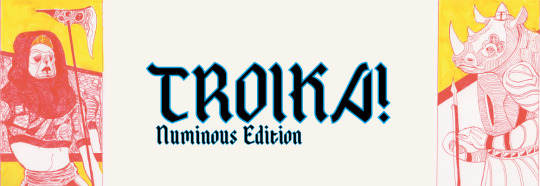
Next up on the list is one of my current favorite games, Troika! Numinous Edition.
Quick Summary: Troika! is a science-fantasy, relatively “rules-lite”, random character creation-driven, wild ride of a game. d66 out of 10 stars. Play it.
Longer-Form What It Is: Troika! (the exclamation is important) is an excuse to go wild and explore a gonzo-weird science-fantasy, plane-hopping maelstrom of a game. I love it. I’m going to just quote the entire introduction, because it does some very heavy lifting in setting your expectations and welcoming you to the game.
“You are reading a tabletop role-playing game (RPG) in which one player takes the part of the games master (GM) and prepares the world and controls the people and peril in it while the other players create characters on a journey through that self same world.
You now have the context and key terms to explore the medium independently and nothing I say here can fully instruct you on what is a deep and rich form of entertainment on par with cinema or fly fishing. Treat it like you would any new hobby.
Beyond that what you have here is Troika!: a science-fantasy RPG in which
players travel by eldritch portal and non-euclidean labyrinth and golden sailed
barge between the uncountable crystal spheres strung delicately across the hump-backed sky.
What you encounter on those spheres and in those liminal places is anybody’s guess — I wouldn’t presume to tell you, though inside this book you will find people and artefacts from these worlds which will suggest the shape of things. The adventure and wonder is in the gaps; your game will be defined by the ways in which you fill them.”
Lovely.
At its core are a few pretty straightforward mechanics. You have some numbers established at character creation that you add to skill rolls to roll under that skill total with 2d6. So, if you have Skill 4 (base stat) and 5 Gambling (a skill) you need to roll under a 9 to succeed on a gambling check. In combat or in contests, each party involved rolls using the same procedure, but the win goes to the higher roller. Pretty straightforward.
There are some extra rules you can layer on top, as well as an explicitly stated expectation that you will be creating your own rules as you play. The “chassis” for Troika! just begs to be hacked, and it really does lend itself to that. Skills in particular make up a big part of this. The given skill list is limited, really on purpose, and you get to come up with more skills as you go.
Another part that makes Troika! unique is the initiative system. Instead of rolling for an initiative, you assemble a pool of tokens representing both players, enemies equal to initiative scores, and an “end of round” token. You then pull at random from that pool to see who goes or when the round ends. Its, admittedly odd, but it works surprisingly well and adds some randomness and tension to initiative orders.
The highlight of Troika! is undoubtedly the backgrounds. Backgrounds function like a class or playbook, they come with a set of starting possessions, skills, sometimes spells, and a short description. Skills and spells help define what your character can do, and offer all sorts of implied hints as to the “lore” of that background. But what does the most heavy lifting is that description. Individually they’re filled with potential hooks and stories, but if you read all the included backgrounds as a unit, it creates this wildly flavorful setting without having an actual setting section. It’s fantastic and more games should do the “implied setting” thing.
Some backgrounds you can pick from (or roll for) include;
Ardent Giant of Corda
Claviger
Gremlin Catcher
Journeyman of the Guild of Sharp Corners
Parchment Witch
Sorcerer of the Academy of Doors
Vengeful Child
Yeah. It’s great.
Quick tangent, but Troika! is also just a great design space to tool around in. You might recall I dabbled in some background making, if you want to get a sense for the flexibility that this system allows for.
Anyways, lastly, I would just like to wax poetically about the art in this book (you can see some examples in the image at the start). There are several artists in this book, and all of them do a real fucking good job. Poetic.
Final Verdict: You should 100% get Troika! Do it now. I’ll wait. If you ever wanted to experiment in systems outside of dnd (and you should do that, there are multitudes out there and chances are one will fit you better than dnd might), Troika! is a great place to start (or end, but really, go on a ttrpg journey. it’ll be fun).
You can pick up a pdf here, as well as check out the free SRD it has all the rules in it seriously. If you prefer dead tree versions, you can pick up a physical copy here. The quality of the hardcover is great, and it definitely feels sturdy and like it wont fall apart at the bindings like certain hardcovers of certain systems. Also, the pdf? Fully hyperlinked. Not even paizo does that for you.
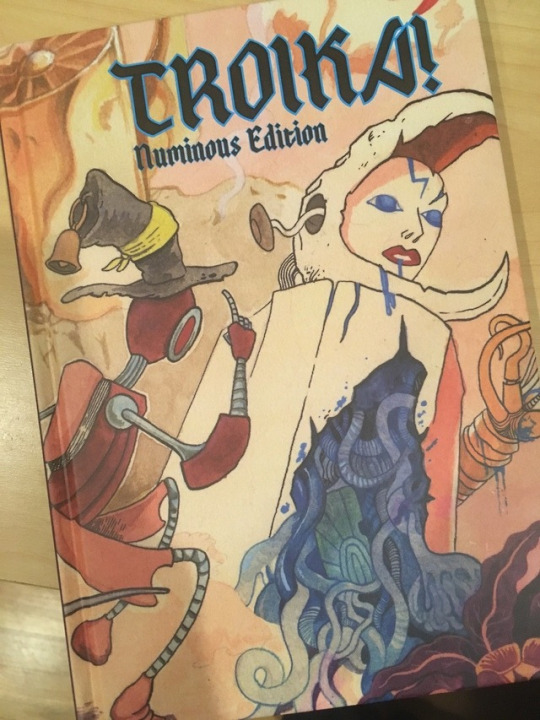
9 notes
·
View notes
Text
So I finally got around to watching that Disney Nutcracker movie... like.
(warning for Spoilers for Nutcracker and the Four Realms if you haven't seen it and still care)
(TL;DR - I didn't exactly care about this movie, here's why)
okay, thats not quite true, I mean, don't get me wrong, theres not much I loved about it, but its mostly harmless in terms of Disney's live-action roster of films.
I enjoyed the design of the castle, and I appreciated the step away from the source material, like at least its something different. That being said, I felt throughout the entire run time that it was trying too hard to be something else. I felt like I'd seen all this before, and then I put it together.
Nutcracker and the Four Realms feels too much like it's trying to be Narnia (2005), Alice in Wonderland (2010), and it just rubs me the same way Beauty and the Beast (2017) did, which is to say, the wrong way. And its not even ripping the good parts of the films it's trying to be (excluding BatB, there's nothing redeeming about that film and no one can tell me otherwise, this is the hill I will die on), the main, while leagues better than Mia Wasikowska and Emma Watson, still manages to fall into the realm of "I just experienced magic for the first time and my only reaction is a disinterested sort-of-open mouth". Seriously, she enters the magical world through her godfathers house while looking for her Christmas present, and she makes it a long way - like a good 15 minutes into the adventure - before she even expresses ANY sort of emotion about it, like, girl you just walked into the set of Narnia - you think I'm joking, don't you - and you don't even comment on it???? I remember watching the commentary for the Narnia film, and Georgie Henley saying that they'd blindfolded her and led her to the lamppost set so they could film her genuine first reaction, and you can feel it in that performance, her starry-eyed wonder feels real. Its a similar situation here, but again, Clara doesn't have any reaction to suddenly stepping out of a tree trunk and being in a winter wonderland. It kinda bugged me.
Then we find out that her mother is the queen of the magical world, and she's a princess. Cool, right? No reaction, nothing, no thought as to how odd it is that her mother is queen at all, its just brushed over. Okay, we won't talk about that either, look at the pretty scenery... except the very next scenes are in a dark forest that isn't very interesting, so now I'm just thinking how weird it is that she's just going with it and not asking any questions whatsoever, or being awestruck by anything. Its like how Alice in the Burton films through over half of that movie is all "this is a dream so it doesn't matter", Clara's whole thing is "well I need to find the key to this present my mother gave me, so none of this other stuff is important". Hello child, what do you even mean, all of this is important, and I'd like to know more about it, but no we aren't gonna learn anything about anyone in this film are we? Certainly not the nutcracker soldier, Phillip, ya know, the namesake of the story?
I'm gonna go off on a tangent for a sec, bare with me. So in the story of the Nutcracker (like, the ballet and the various other variations of the story), at least, any version I've seen, the Nutcracker has always been a prince and its always been Main Girl (there's a few different name variations depending on the story) that breaks a curse or spell or choose-your-reasoning over the nutcracker that made him... well, a nutcracker. Different things happen throughout the story depending on the version, but the nutcracker is always a nutcracker. This film follows a different beat, obviously, but here's just sort of a guy. We don't learn anything about him, he's not a nutcracker we have to break the spell over - they keep calling him a nutcracker, and I guess we see him in a flashback where he's a nutcracker ornament and not, you know, the actual nutcracker we see her little brother Fritz playing with earlier in the movie - he's not very interesting, but by the end of the movie it acts like we and the main character are supposed to care about him. And maybe I missed something, but I just didn't. Like congrats on being promoted to head guard or whatever, but I'm ready to move on.
Speaking of the movie treating itself as if important things happened, I don't know where I zoned out - I didn't - but somewhere at the hour mark everybody is talking as if important life-changing things have been happening the entire movie. And I'm sitting here thinking 'what are you talking about, nothing has happened'. We met three other characters who we will proceed to learn nothing about (and also my two favorite characters in the entire film who didn't get nearly enough screen time, hats off to the two guards), and therefore not care about when things get bad, and then we had a minor scuffle with the 'bad guy' (the one thing I can say is that I understand why people have a fear of clowns now). Everyone is acting like we're at the precipice right before the final battle, and Clara's all "i thought I'd find the answers, but I'm just as lost as I was when I got here" as if anyone over the age of 8 hadn't already figured out the 'everything you need is inside' is the most obvious metaphor you could put in a movie why did you have to make it so blatant if you were gonna do it anyway???
And THEN, we finally get to the biggest trope of them all, boy am I sick of this ESPECIALLY in Disney movies. They go and pull a 'the person you thought was bad is good, and the person you thought was good is bad' with the Sugarplum fairy of all people. This is the same thing that happened with Frozen and Zootopia, where it almost basically came out of nowhere (I'd watch it again to see if I missed anything, but honestly I don't think I did, I didn't see any hints), and there's barely any rhyme or reason to it. Like they give a reason. She's sad that Clara's mom left them and she has some kind of abandonment issues that I would've LOVED to see given just a bit more screen time but NOOOOOO here's another thing we won't talk about in any kind of meaningful detail. We don't really know why she turned against Mother Ginger (the original 'bad guy') specifically, and then the movie basically kills her, like, I don't agree with what you did, but dang.
The battle at the end, which I remember being a big part of the trailers that I'd seen, but don't quote me on that, was so very underwhelming. You had an army of tin soldiers come to life and set to go attack Mother Ginger, and you had not only the real army all locked up together that you could've released, but you had the "mouse King", the nutcracker and Mousrinks, Mother ginger, and Clara and her inventor schtick basically alone with the machine that brings toys to actual life, and we get shown her holding a box full of mechanical wind-up mice, so I'm thinking I know where this is going, she's gonna distract the tin soldiers, and bring the wind-ups to life to fight against the soldiers, its gonna be a big fight before the climax. But no, we get those weird roley-poley clown matryoshka things knocking a few of them over and then Ginger with a whip attacking the soldiers while Clara tries to turn off the machine (which I'm still not entirely sure if she did).
Cue one of the "she didn't leave me alone, she didn't leave you alone" speeches where the main tries to appeal to the villains better nature. Cue probably murder, I'm not actually sure since all the residents of the realms apparently started out as toys anyway. Cue the supposed heartfelt goodbye between the nutcracker and Clara. Cue Clara going back to the party and acting like nothing happened in what looks like its supposed to be a tongue-and-cheek way with her godfather who OBVIOUSLY knows that that magic world is a thing, but doesn't mention it. Cue an apology to the father and admitting that they both miss the dead mother, because of course there's a dead mother, it's a Disney film. Cue owl we don't know anything about flying away ala Labyrinth ending. The end.
It was all very... underwhelming. Like, I appreciated what it was attempting to be, and I really appreciated the CGI more that I have in any of their other recent live action anythings, but it just didn't work for me. Like I said, it felt like it was trying to hard to be something else, to the point in which it doesn't feel like it even has an identity as Disney's Nutcracker. That coulee been something, "Disney's the Nutcracker", but honestly it's so not its own thing that I forgot it was even a thing for a whole year, it didn't have anything that drew me in, it didn't have anything that originally made me even want to see it (I remember seeing the trailers while I was still recovering from BatB and even then I could tell because it marketed itself as "from the makers of Beauty and the Beast"), the only reason I even put it on was because I'm working on another project and I was curious about different adaptations of the story. Its not the worst offender Disney's put on their team, not by a long long shot, and it is mostly harmless - to the point of boredom - but I don't know if I'll ever go back it.
#the nutcracker#the nutcraker and the four realms#nutcracker#the nutcracker and the mouse king#nutcracker review
4 notes
·
View notes
Text
My current thoughts on Boruto. It's long and hard please be patient.
(please note, this is MY personal opinion, it doesn't matter and it will effect nothing in your life, we're all mature rational people. If you plan on sending me death threats over an anime, you really shouldn't be on the internet. This is an extremely long post, don't try to be a smartass and say "lol too long not going to read" in the comment section, you're not proving that you're more smarter than me or have a better argument, you're just kind of proving that you're not intellectually stimulated enough to have a decent conversation or discuss about the issue oh, it's also not a good way to win an argument because that just kind of makes you out to look like an idiot. And the last thing you need when making an argument is look like an idiot of yourself.)
So, as the Boruto series progresses...it's...not... improving....and I'm now starting to realize that there was a reason why nobody actually talked about the written novelisation of Gai, Kakashi and Asuma's daughter's mission.... because it was balls.
The shows development at this point is now solely depending on filling up a quota of episodes before they can officially start making episodes based on the manga, as a result, the show is now purely just filler and arguably filled with unnecessary development. The issue is that this development should be coming in at a gradual and moderate pace. Unfortunately most of the development is going towards characters that may not actually affect the series as a whole, unlike in the Naruto and Naruto Shippuden series, the development of the characters went directly towards individuals that were affecting the story at the moment. I'm starting to realize that this type of development in Access can create and effect I like to call "the procrastinated essay" effective writing.
It just basically means that they're just throwing in pointless character, World, and story development that may be harmful to the end result of the story. Character development isn't bad, the problem is when it's starting to become so vapid and it starts to pollute the basic plot of the story. If all of these filler episodes were appearing sometime in the middle of the initial manga story, this wouldn't be a problem. In fact this may be a reason as to why some of the filler episodes in the original Naruto series may have been more enjoyable and bearable than it was now. This is a real shame because this is also in invertedly ruining the development of the characters, we have an entirely new cast of characters but it seems that the entire show is depending on rehashing the characters Andre casting them as old characters from the series. Basically giving the newest characters the same kind of silly issues that were originally resolved in the original series, bringing in villain characters that are practically identical to the original villain characters we were presented, and even presenting the same issues there were in the original series but in a different guise. so what were actually seeing is a very poorly written in poorly constructed version of the original series in the end, which is why everything feels so boring, cringy and arguably comes off as repetitive. We have four arcs that are completely dedicated to the same issues we were given in the original series but given to us any vapid and somewhat disjointed manner. It also presents the characters as far too developed for their age, I understand that the constant argument people have given me for this is that they're supposed to be the children of the main characters those they're supposed to surpass them, but that just makes the newest cast of characters to be overpowered and also present the question of "if they're the newest generation and they have to surpass the eldest generation, why are they so powerful if they grew up in a time of Peace, why did they surpass their parents without any real effort and why do they need it even surprised their parents if they don't even need to fight".... This ultimately creates a situation where it is extremely unrealistic that an individual will surpass a previous generation if they have no need to surpass them.
This brings up the type of theme, growing up in a time of peace, instead of focusing on issues that may stem from this kind of theme, we're focusing on basically stuff that may not be even that important rivers ends or maybe it doesn't even happen in a situation like this. There are characters who literally do not know what a Jutsu is and yet for some strange reason it's still being taught, there are characters who don't even do anything yet there in ninja teams and they are expected to perform ninja duties. Instead of a look into a world where now basically becoming a ninja isn't a necessity, we're being treated to the same type of story that we previously had but now we're put into a situation that this would have never happened in the first place.
As for both the story itself, it's clearly going on solutely nowhere, the manga itself does have a plot and I will acknowledge that there is something going on. However, seeing how the series is just going off on a filler tangent, I'm wondering if all this unnecessary story development will affect the primary plot. the original reason why the Naruto series was so good was because that it began with a very basic quest based plot and gradually started to present itself with a deeper story, The fillers were just a break from that and also to create a breath within story writing. this is going to be extremely important for the readers to remember, the fillers aren't meant to waste time, they're meant to create enough time for the writer to create Amore organized story.
boruto is heading towards a wall with all of these fillers and I'm pretty certain that it's going to be its downfall, as for animating the novels, this should have been something they've done at the end of Shippuden and not within more than a hundred episodes of boruto. At first I thought it was going to actually enjoy the animated novels, however I'm starting to realize how extremely pointless and they are. I don't really have any gripes or ill contempt towards any of the characters, I just find it that there is a lot of unnecessary pieces of information that the series is trying to peddle towards the audience.
This brings me to my next point, the whole purpose of all these pointless filler episodes is purely to fill in for time for the manga to start having some growth to it. Which kind of bothers me because Naruto in the original since never actually had the luxury of having a bunch of filler episodes before Kishimoto could come up with a few novels. In fact which brings me to another detail of my point, Kishimoto had to write new chapters almost every two weeks or less in order to keep up with scheduling. Towards the end of the series this may have affected the quality of the story to a very small extent but overall it never truly affected the series as a whole, in fact it may have helped it. Ikemoto is going on the same route as the Steven universe writers, they're taking way too much time to come up with a story those creating a really poorly constructed in poorly organized story.
So for those were reading the manga, you all are obligated to wait for new information for the manga by having to succumb to watching really poor quality writing for the anime, which goes back to the manga itself as it can also suffer from poor writing.
do not get me wrong, I really wanted to like the series, I really wanted it to be the next step in my life as a fan of the show, unfortunately it is starting to kind of proved to me that it's not only not up to the same quality as the original series and Shippuden but it is also going through basically what creates a mundane and mediocre anime. Instead of coming up with an animated boruto series so early on in its development, it should have waited for a few volumes to come out before I could even come up with a fully-fledged anime. Will we have currently now is basically an entire anime consisting of fillers that are not only ruining the Canon of the series but are sort of a massive waste of time.
To make a long story short and I deeply apologize for such an unnecessarily long post, but my point is that the series is going to crash and by the time it's getting to its primary plot, it's going to lose a lot of popularity, and it's ultimately going to fail. it's depending way too much on the previous material to even focus on its own story and it is simultaneously ruining the previous series by presenting information that is contradictory to what the original rules were. unfortunately, there is a chance that the boruto series may never improve, it is just going to continue driving itself into the mud until nobody watches it anymore. There is a chance for it to improve by ceasing these endless filler episodes and just start getting on with the original plot of the series, they may lose a few people waiting, but at least it'll get to its points and I'll get to actually tell the story has been meaning to tell for a while. what they should probably do is stop now, reorganize the story with what ridiculous information they've already given us, and maybe even focus on making an animated series on the other novels. Now I understand that a previous point I made in this post was what was going wrong with this idea, however there could be some form of benefit to go back into the series and answer a few questions before going on to boruto. Basically, what I'm trying to say is maybe even doing this will lighten the amount of information the series is giving us by presenting us with a proper transitioning explanation. You can't give us a character like Hidan, then at one point in the novel say that he just made up the religion on his own accord then give us an entirely new character to replace him but at the same time using the aspects that made Hidan so unique. That's called character recycling, that's not introducing us to a new villain, that's just pissing everyone off. Especially me because I've taken enough writing classes to smell a bad plot of mile away.
P.s) I'm just extremely tired of really inappropriately annoying people tell me that I'm too stupid to understand boruto and that I need a 300-point IQ to like it. seriously this isn't Rick and Morty, it's a spin-off of Naruto for fucksake it's supposed to be a little more of a higher standard
13 notes
·
View notes
Text
I sent the attached to the columnist for the WSJ who wrote about a new pre-school study. I can’t get the tone right. I probably sound like a jerk.
I enjoyed the study very much, thank you. I disagree with their model; it’s implausible that an effect essentially isn’t visible, but then emerges after a decade plus. Humans aren’t cicadas. The path of life is more complicated. That said, there is another transmission channel, one that may make more sense - said hopefully I hope pre-school has lasting effects - which is that it trained these families about the school system at a time when the children were so young the families had no choice but to have some engagement. The children can’t go to school with older kids, can’t be dropped off without contact.
And family is the next largest group. So what could be transmitted at a group level? Motive. Meaning contact with the school system by parents of young children told them the system’s motives were at least reasonably good. Imagine then the twists of life and you are the family and you have no such exposure: then you may not push through your mistrust of the system. That mistrust would be multi-layered, so belief the system tries to be good but low belief the system cares about your child. That, you can see, might be lessened by seeing how teachers care for your child. It is that handover of family to institution which conveys a bit more of the sense that you should stick it out.
If this data is good, then this is really good news because it means we can work more directly on programs that teach young families to trust the educational system cares about their child at a personal, not merely an institutional level. Everyone tries to do that, but parent-teacher nights in 4th grade are not the same as believing there will be people who will be there for your child. If you can see that at the young age, when you need to trust another can care for your child around the time the child is barely able to care for itself, then you can see the goodness in the effort.
So, again, thank you. It was a real pleasure to analyze this. Regression has a tendency to hide the pathway you have not chosen. Very Robert Frost. In this case, I believe they wanted to take the road less traveled, because this models a group effect. It’s the only way it can work. To be even mildly technical, look at Rolle’s Theorem. You have a person that we place on a line, so we treat it as if it were 2 sames, and any curve that isn’t that straight line has a place where the tangent goes to 0, and complexity attaches. And since we’re not cicadas, we don’t have one curve that lasts 17 years underground. A lot of complexity means group, because you embody the concept of complexity in a group.
I assume you know this and I’m over-explaining, but regression is a choice of path out of a group. And here, we have a group of students enclosing a group of families, and other way around, so there might be group cooperation effects, meaning some families may have shared their positivity (and of course that would be most meaningful to those who share the experience who might be wavering). And then you have extended family groups, which may contain all sorts of object lessons, so ‘don’t end up like Donny’ has a positive other possibility in which the schools may actually matter. So, I do not see how choosing the path of the individual makes sense as the chosen line to examine.
The utility of this approach includes the potential for larger change because the cooperative effects do spread through cultures. As witness Judaism: cooperative learning, trust in the conception of education, trust in the outcomes of those paths, culturally bound.
So, instead of a magic effect that appears out of near nowhere like humans are cicadas, I think it’s more likely a group effect and we see the impact of family trust in the motive of a system through the intimate contact required of families with young children. It may be that programs aimed at children who are toilet-training works, because they go over the hump from soiling themselves to cleaning themselves, which is massive.
Thanks again,
Jonathan Kurtzman
0 notes